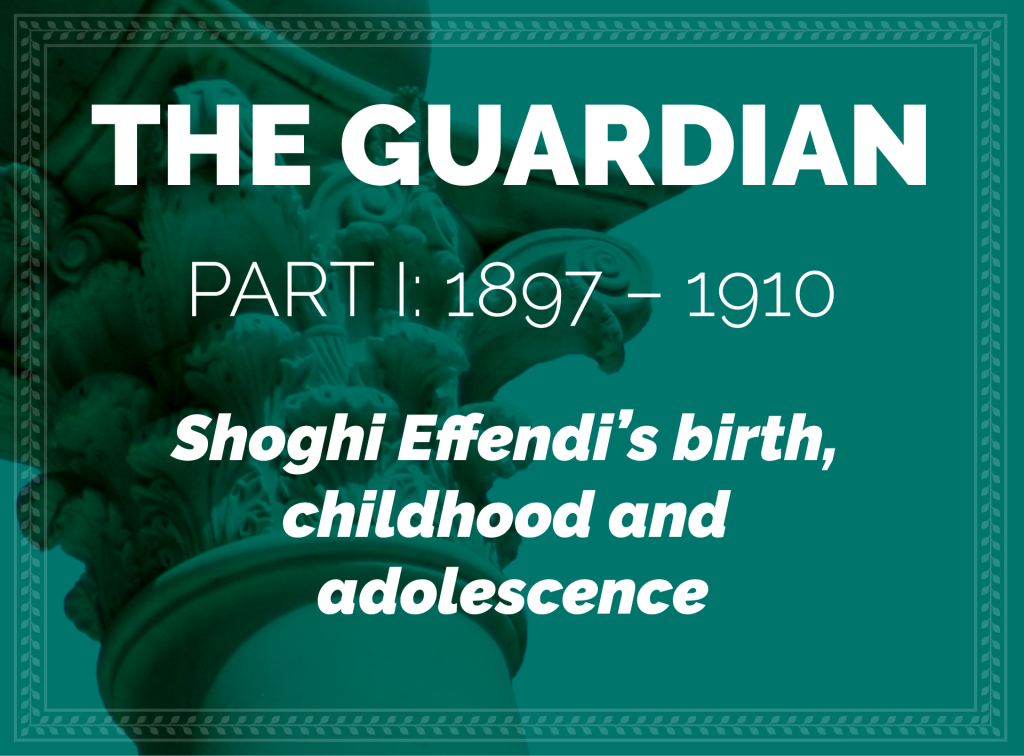
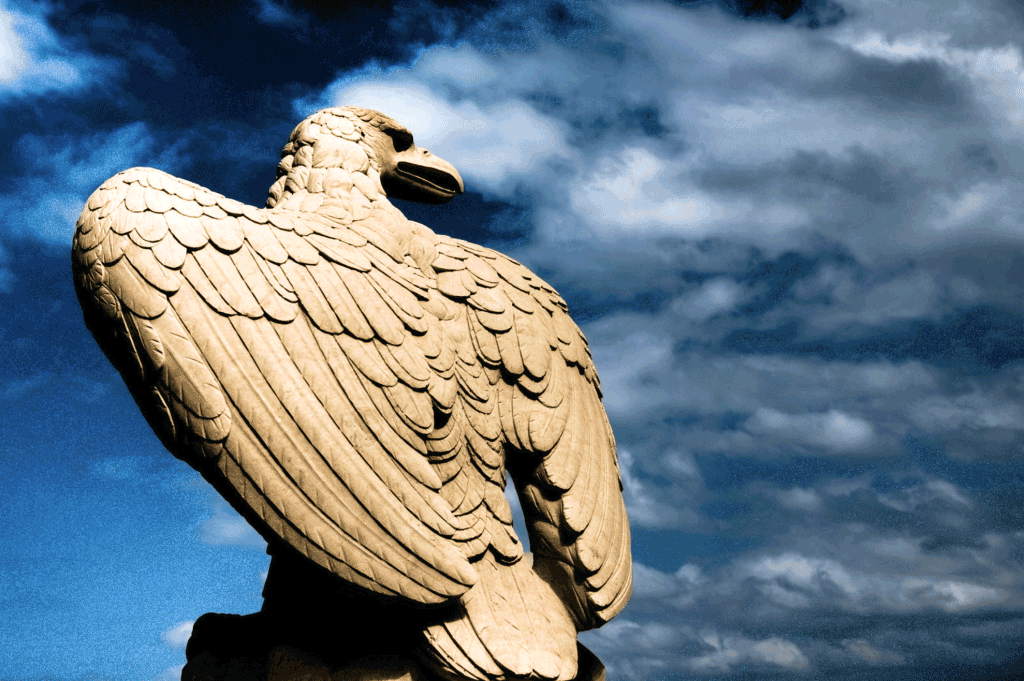
Written and illustrated by Violetta Zein
Salutation and praise, blessing and glory rest upon that primal branch of the Divine and Sacred Lote-Tree, grown out, blest, tender, verdant and flourishing from the Twin Holy Trees; the most wondrous, unique and priceless pearl that doth gleam from out the Twin surging seas.
The Will and Testament of ‘Abdu’l-Bahá
For behold! He is the blest and sacred bough that hath branched out from the Twin Holy Trees. Well is it with him that seeketh the shelter of his shade that shadoweth all mankind.
The Will and Testament of ‘Abdu’l-Bahá
DISCLAIMER: ONLY SHOGHI EFFENDI’S WORDS QUOTED FROM GOD PASSES BY, HIS LETTERS, AND CABLES CAN BE CONSIDERED HIS OWN; ALL OTHER REPORTED UTTERANCES OF SHOGHI EFFENDI SHOULD BE VIEWED AS PILGRIM NOTES.
There are 21 parts to this Chronology. You can access Parts I–X with the Roman numeral menu on the left. Click on the pink button that says XI–XXI to access the last 10 parts of the chronology until the passing of Shoghi Effendi.
This part covers the life of Shoghi Effendi from His birth in 1897 to the age of 13 in 1910.
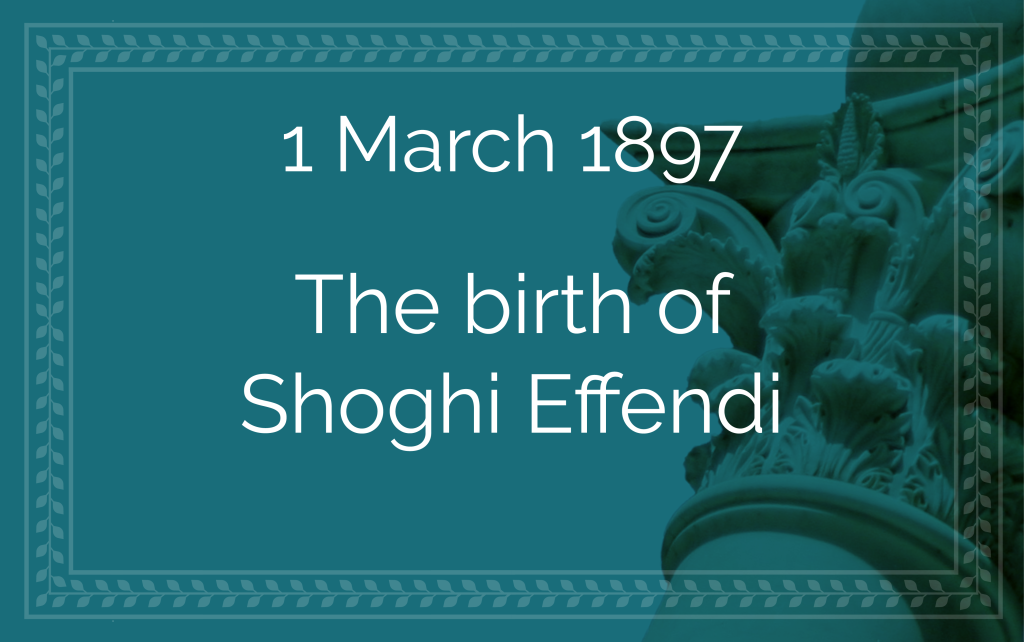
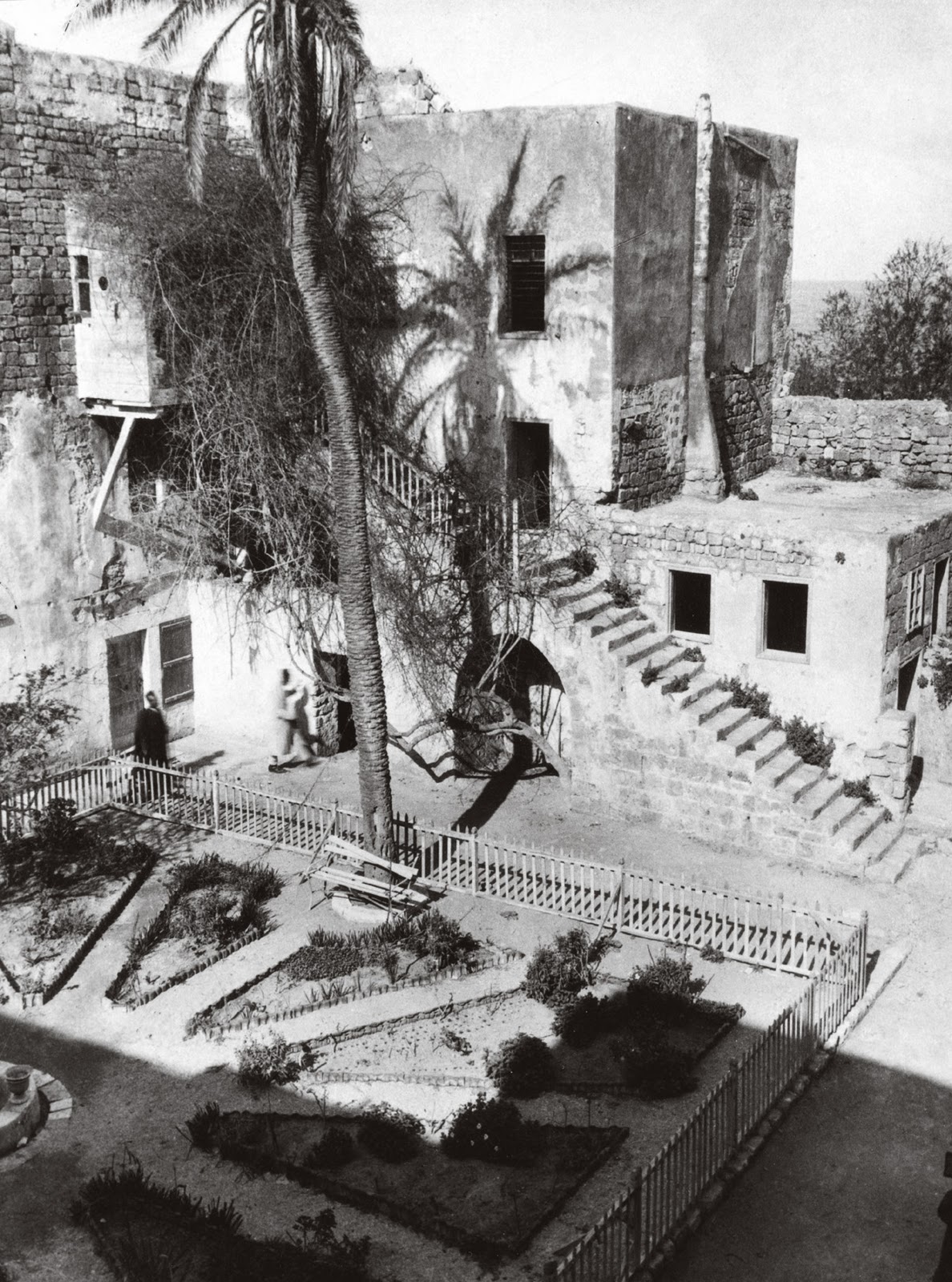
The house of 'Abdu'lláh Pashá, where Shoghi Effendi would later be born, in 'Akká. Source: Reflections on the Bahá'í Faith.
Before Shoghi Effendi was born, all Bahá'ís, the world over, and especially the eastern Bahá'ís, fully expected 'Abdu'l-Bahá’s hereditary successor to be the very next eldest male descendent of Bahá'u'lláh.
Many years before His passing, 'Abdu'l-Bahá received a question from some Persian believers as to whom they should all turn to after His Ascension, and 'Abdu'l-Bahá’s response had been:
Know verily that this is a well-guarded secret. It is even as a gem concealed within its shell. That it will be revealed is predestined. The time will come when its light will appear, when its evidences will be made manifest, and its secrets unravelled.
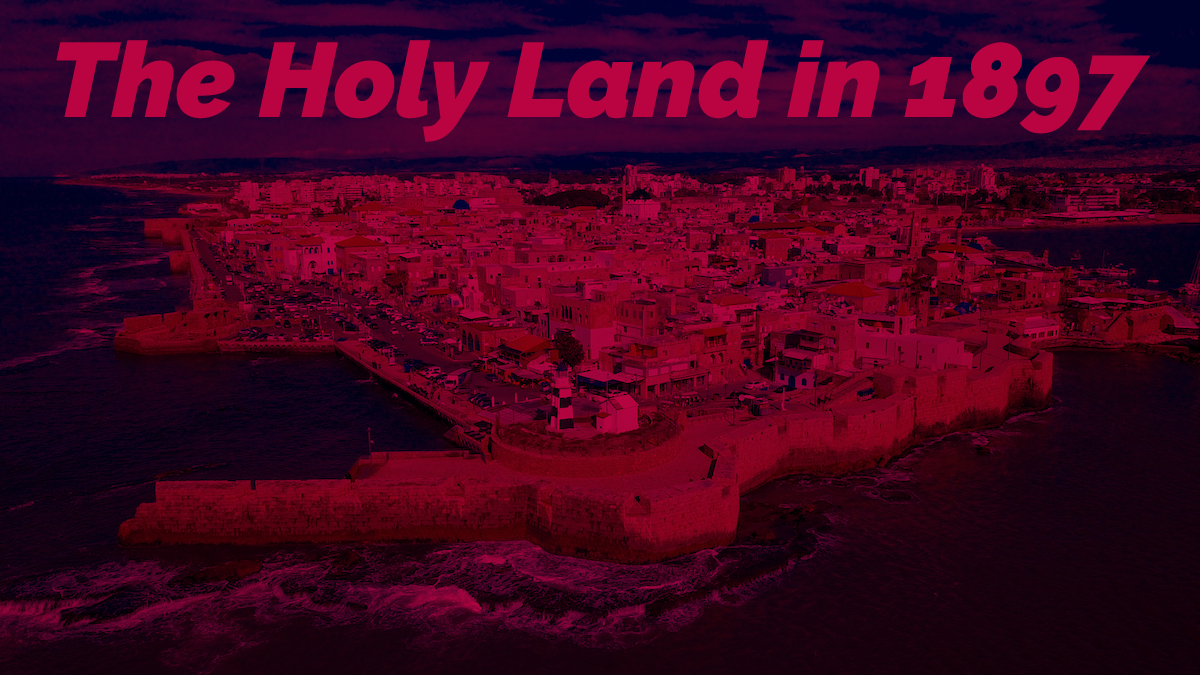
“The Holy Land in 1897”: Artistic interpretation of the Covenant-breaking situation in 'Akká at the time of Shoghi Effendi’s birth.
After the passing of Bahá'u'lláh in 1892 the Bahá'í community was plunged into such a state of grief and consternation as it had never experienced before. The light of divine Revelation, which had shone forth for forty years, was now withdrawn, and the believers tasted the bitter agony of separation from Bahá'u'lláh. 'Abdu'l-Bahá was their only source of consolation as the Centre of Bahá'u'lláh's Covenant.
The forces of darkness reared their head violently only a few hours after Bahá'u'lláh had passed away, when Mírzá Muḥammad-‘Alí—the Master’s half-brother—stole from 'Abdu'l-Bahá the two cases containing Bahá'u'lláh’s writing materials, seals and papers.
On the fourth night after Bahá'u'lláh’s Ascension around midnight, a disconsolate 'Abdu'l-Bahá, watched as His duplicitous half-brothers violate His Father’s cases, rifling through the papers.
Covenant-breaking disrupted the life of the Bahá'ís in the Holy Land with constant attacks on 'Abdu'l-Bahá for four years after the Ascension of Bahá'u'lláh.
Mírzá Muḥammad-‘Alí ran a campaign to discredit 'Abdu'l-Bahá in the eyes of the Bahá'ís, by poisoning their minds. The Covenant-breakers invented fake stories about 'Abdu'l-Bahá and disseminated them among influential people of ‘Akká, including a lie about how 'Abdu'l-Bahá had cut off their livelihood. Mírzá Muḥammad-‘Alí sent his sons dressed in rags to the homes of important people, begging for food, refused 'Abdu'l-Bahá’s shipments of wheat and sent petitions complaining 'Abdu'l-Bahá never gave him his share of the wheat from the Jordan valley fields.
All these campaigns, lies, calumnies, petitions, and official complaints were destined to discredit and humiliate 'Abdu'l-Bahá, in a multitude of devious and deeply cruel ways.
Around 1897, when Shoghi Effendi was born, the situation was dire, and it was a time of profound tension and unrest.
Enemies were everywhere, plotting.
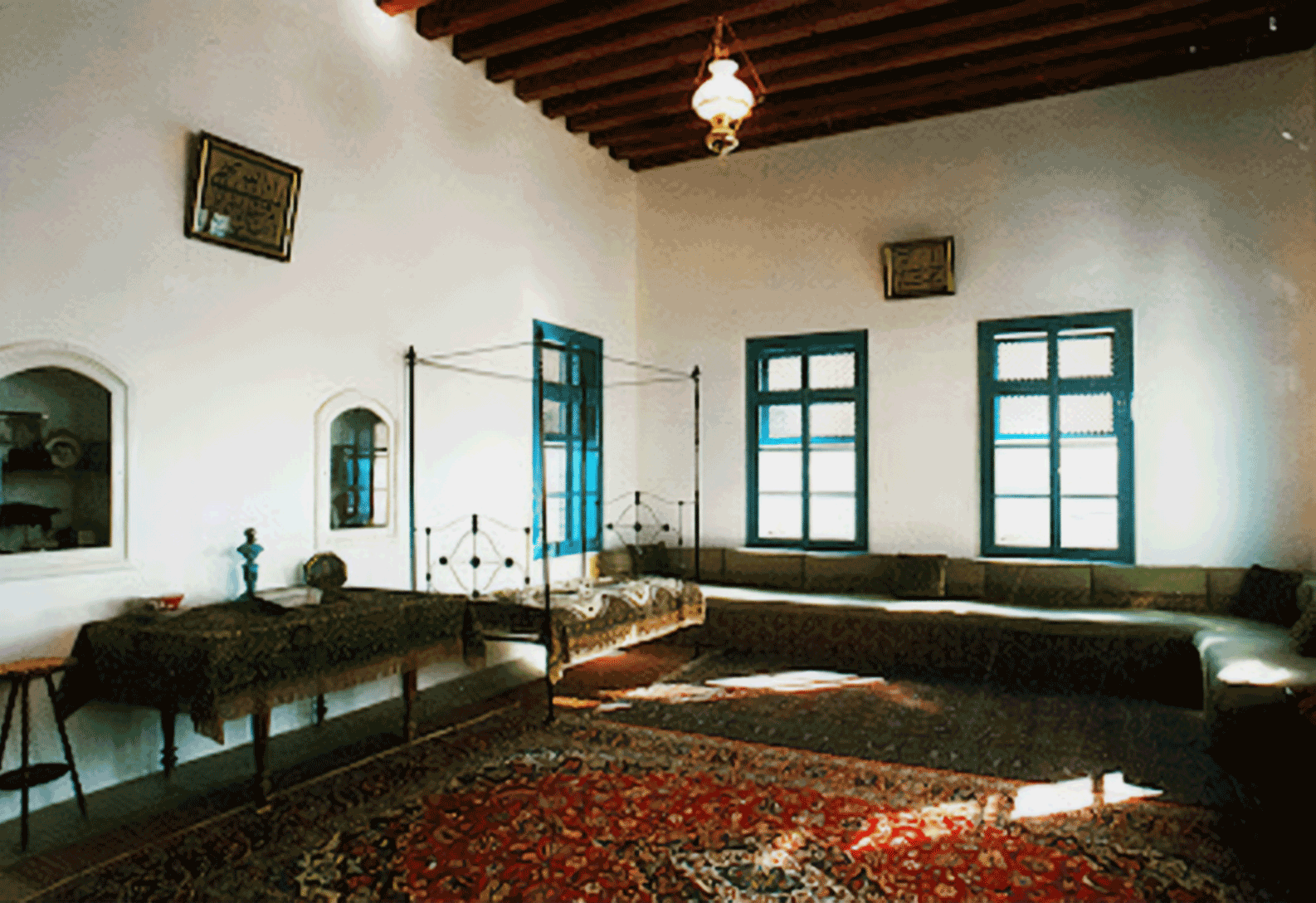
The upper room in the southwest corner where Shoghi Effendi was born, in 'Akká on 1 March 1897. Source: Bahá'í Points of Interest.
Shoghi Effendi was born on the first day of the month of fasting, 1 March 1897, in an upper room of the south wing of the house of 'Abdu'lláh Pashá in 'Akká. He was 'Abdu'l-Bahá’s very first grandchild, the son of Mírzá Hádí Shírází and Ḍíyá‘íyyih Khánum, 'Abdu'l-Bahá and Munírih Khánum’s eldest daughter. His name, Shoghi means “one who longs.”
Shoghi Effendi was the child of prophecy.
He was the “priceless pearl that doth gleam from out the twin surging seas,” the twin descendent of the family of the Báb, on his father’s side and of Bahá'u'lláh on his mother’s side.
Shoghi Effendi was born a prisoner.
At the time of his birth, 'Abdu'l-Bahá and His entire family were still prisoners of the Ottoman Sulṭán, ‘Abdu'l Hamid.
Shoghi Effendi was designated the Ghuṣn-i-Mumtáz, the Chosen Branch, and was descended from the families of two Manifestations of God, Bahá'u'lláh, on his mother Ḍíyá‘íyyih Khánum’s side, and the Báb, on his father Mírzá Hádí Afnán Shírází’s side.
This is why, in His Will and Testament, 'Abdu'l-Bahá emphasized his double divine heritage three times—speaking about the Twin surging seas, the Twin Holy Trees, and the fruit of the two offshoots of the Tree of Holiness—calling Shoghi Effendi: “the most wondrous, unique and priceless pearl that doth gleam from out the Twin surging seas,” “the blest and sacred bough that hath branched out from the Twin Holy Trees,” and “the youthful branch branched from the two hallowed and sacred Lote-Trees and the fruit grown from the union of the two offshoots of the Tree of Holiness.”
Shoghi Effendi was of the most distinguished and royal lineage. On the side of Bahá'u'lláh, he was a descendent of two Manifestations of God, Zoroaster and Abraham, and he was of royal Persian blood, a descendent of the Sásáníyán kings of Persia. On the side of the Báb’s family, Shoghi Effendi was born a Siyyid, a direct descendent of a third Manifestation of God, the Prophet Muḥammad Himself.

Background image of snow-capped peaks in the Swiss Alps, which the Guardian climbed until he was in his mid-30s. Photograph by Denis Linine on Pexels.
At this moment in the chronology, when he has just been born, it is essential to understand Shoghi Effendi’s unique station in the Faith.
The Báb, Bahá'u'lláh, and 'Abdu'l-Bahá’s were the three Central Figures of the Bahá'í Faith. The Báb and Bahá'u'lláh were Manifestations of God, the Twin Manifestations of the Bahá'í Dispensation.
The Báb was, as Shoghi Effendi explained, the Founder of the Bábí Dispensation, a self-sufficient Manifestation of God, “invested with sovereign power and authority, and exercises all the rights and prerogatives of independent Prophethood” as well as the “inspired Precursor of the Bahá’í Revelation,” but Shoghi Effendi clarifies that the Báb is “subordinate in rank” to Bahá'u'lláh.
Bahá'u'lláh, on the other hand, is, as described by Shoghi Effendi, “transcendental in His majesty, serene, awe-inspiring, unapproachably glorious,” ushering in a Revelation of “incomparable greatness,” and “the culmination of a cycle, the final stage in a series of successive, of preliminary and progressive revelations.”
'Abdu'l-Bahá was not a Manifestation of God, He fulfilled, as Shoghi Effendi stated, not only “a unique function” but also moved, “in a sphere of His own and holding a rank radically different from that of the Author and the Forerunner of the Bahá’í Revelation.”
And the Guardian, the appointed interpreter of the teachings of Bahá'u'lláh and the chief builder and engineer of the Bahá'í World Order, moved in a very distinct sphere than that of the Twin Manifestations of the Bahá'í Dispensation and 'Abdu'l-Bahá. Shoghi Effendi is not one of the Three Central Figures of the Faith, and as such, it was not clear exactly to believers what his station was, so Shoghi Effendi clarified it for us in a letter dated 8 February 1934:
No Guardian of the Faith, I feel it my solemn duty to place on record, can ever claim to be the perfect exemplar of the teachings of Bahá’u’lláh or the stainless mirror that reflects His light. Though overshadowed by the unfailing, the unerring protection of Bahá’u’lláh and of the Báb, and however much he may share with ‘Abdu’l‑Bahá the right and obligation to interpret the Bahá’í teachings, he remains essentially human and cannot, if he wishes to remain faithful to his trust, arrogate to himself, under any pretense whatsoever, the rights, the privileges and prerogatives which Bahá’u’lláh has chosen to confer upon His Son.
In the light of this truth to pray to the Guardian of the Faith, to address him as lord and master, to designate him as his holiness, to seek his benediction, to celebrate his birthday, or to commemorate any event associated with his life would be tantamount to a departure from those established truths that are enshrined within our beloved Faith. The fact that the Guardian has been specifically endowed with such power as he may need to reveal the purport and disclose the implications of the utterances of Bahá’u’lláh and of ‘Abdu’l‑Bahá does not necessarily confer upon him a station co-equal with those Whose words he is called upon to interpret. He can exercise that right and discharge this obligation and yet remain infinitely inferior to both of them in rank and different in nature.
To the integrity of this cardinal principle of our Faith the words, the deeds of its present and future Guardians must abundantly testify. By their conduct and example they must needs establish its truth upon an unassailable foundation and transmit to future generations unimpeachable evidences of its reality.
For my own part to hesitate in recognizing so vital a truth or to vacillate in proclaiming so firm a conviction must constitute a shameless betrayal of the confidence reposed in me by ‘Abdu’l‑Bahá and an unpardonable usurpation of the authority with which He Himself has been invested.
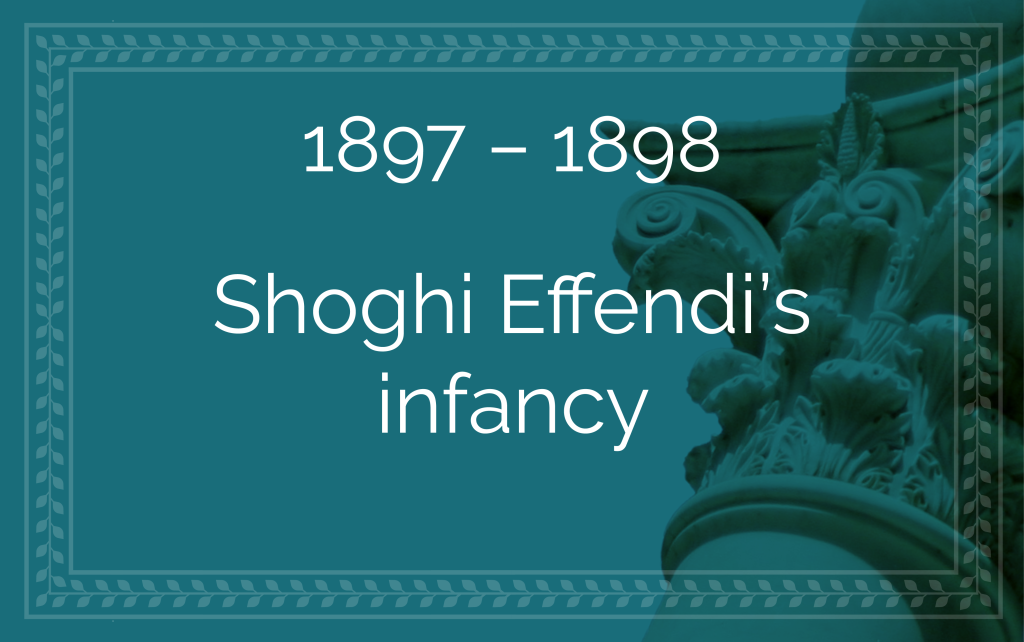
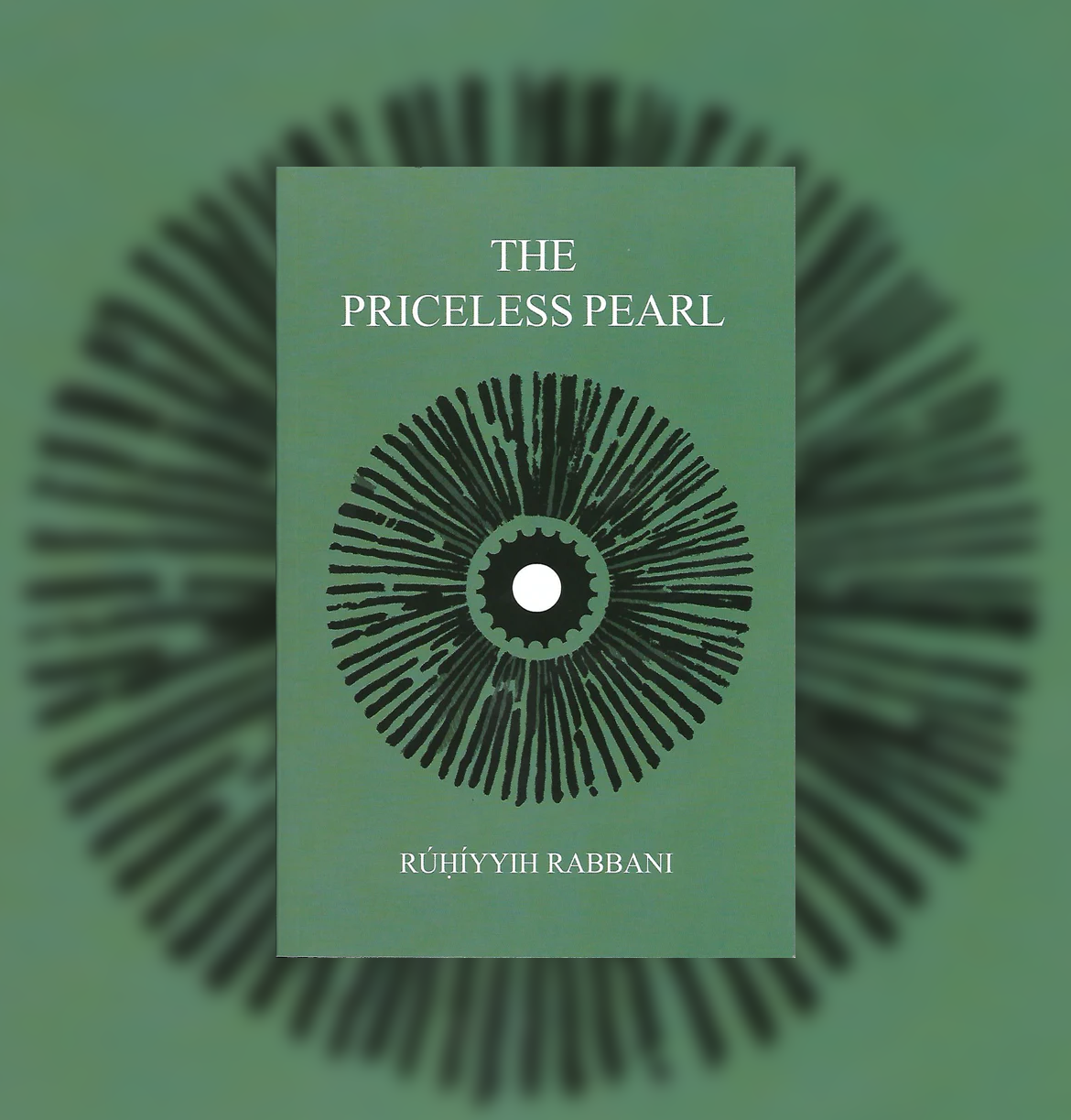
Before beginning our journey into the life of Shoghi Effendi, a tribute should be paid to The Priceless Pearl by Rúḥíyyih Rabbání, whom we know as Hand of the Cause Amatu’l-Bahá Ruḥíyyíh Khánum, the wife of the Guardian. The Priceless Pearl, as the authoritative biography of Shoghi Effendi written by his spouse of 20 years forms the basis of this chronology. If the same event was recorded in another source, it was always the version in the Priceless Pearl that was used. Rúḥíyyih Khánum’s clear-sightedness, her utmost respect for the Guardian and his work were, for the months this chronology was being written, its guiding light, its northern star, and its tuning fork.
The Priceless Pearl is, bar none, the best Bahá'í biography ever written. Rúḥíyyih Khánum was born with the gift of words, both written and spoken. For 12 years, while she was serving the Faith continuously, between the ages of 15 and 27, the Guardian specifically encouraged her to practice and develop her writing and her speaking.
While addressing every part of the Guardian’s life she felt inclined to share from Shoghi Effendi’s personal life—his birth and childhood, his studies in Beirut and Oxford—the moment Shoghi Effendi reads the cable announcing the passing of 'Abdu'l-Bahá, The Priceless Pearl changes in tone, and Rúḥíyyih Khánum, laser-focused, studies under a microscope the legacy of Shoghi Effendi’s 36 years as Guardian—the builder of the Administrative Order, the creator of Teaching Plans, the talented designer, the writer, the defender of the Cause, and the mountaineer.
The reason The Priceless Pearl is the best Bahá'í biography ever written about Shoghi Effendi is because every chapter, every page, every word is suffused and infused with Rúḥíyyih Khánum’s adoring love for the Guardian. In no other book would you ever find that level of passion and adoration.
It should, however, be noted that Rúḥíyyih Khánum refrains from providing any information regarding her marriage to Shoghi Effendi and there are no published photographs of Shoghi Effendi and Rúḥíyyih Khánum together. To Rúḥíyyih Khánum, Shoghi Effendi was first and foremost the Guardian.
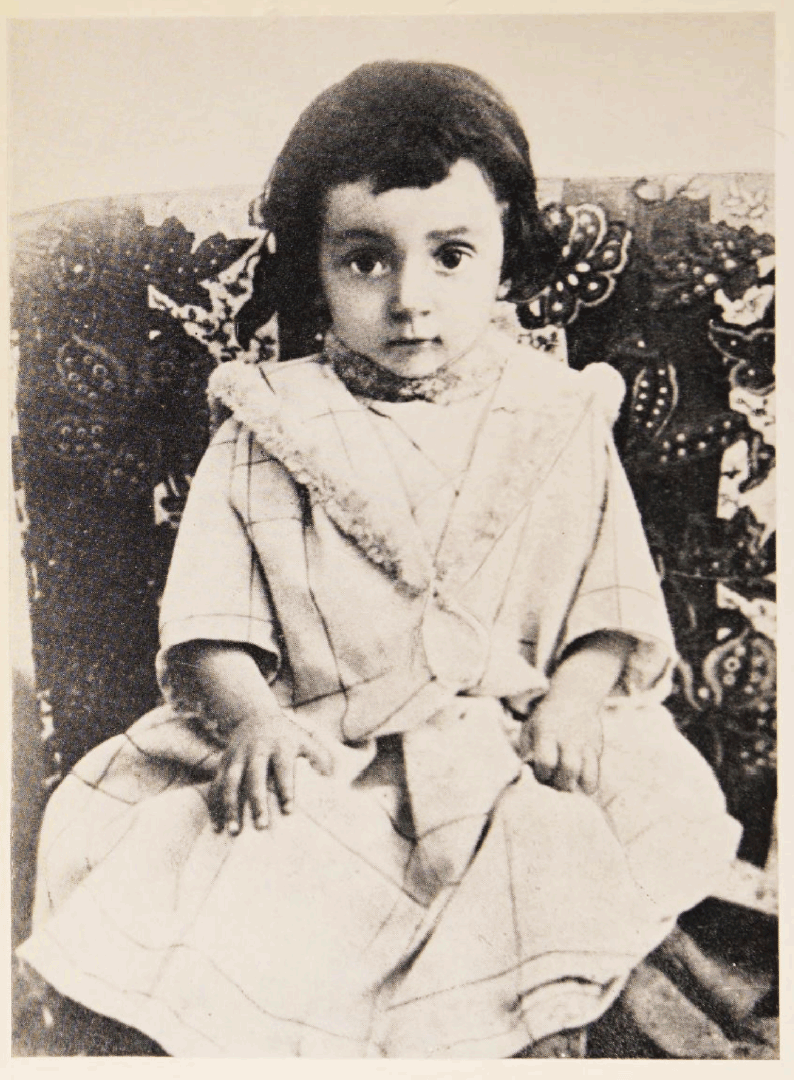
Shoghi Effendi as an infant. Source: The Priceless Pearl, frontispiece.
'Abdu'l-Bahá and Munírih Khánum had eight children, four of whom died in infancy or childhood, two boys and two girls: Mírzá Mihdí—who bore the same name as 'Abdu'l-Bahá’s martyred younger brother—Rúhangíz, Fu'ádíyyih, and Ḥusayn Effendi. By the time Shoghi Effendi was born, 'Abdu'l-Bahá was 53 years old.
Shoghi Effendi was 'Abdu'l-Bahá’s first grandson, the first child of 'Abdu'l-Bahá’s eldest daughter, Ḍíyá‘íyyih Khánum.
Although 'Abdu'l-Bahá would go on to have 12 other grandchildren, from three of his four surviving daughters, Shoghi Effendi alone would inherit what Amatu’l-Bahá Rúḥíyyih Khánum called the nobility of his grandfather.
The depths of 'Abdu'l-Bahá's feelings at the time of Shoghi Effendi’s birth are reflected in His own words in which he clearly states that the name Shoghi—"the one who longs"—was conferred by God upon His grandson:
O God! This is a branch sprung from the tree of Thy mercy. Through Thy grace and bounty enable him to grow and through the showers of Thy generosity cause him to become a verdant, flourishing, blossoming and fruitful branch. Gladden the eyes of his parents, Thou Who giveth to whomsoever Thou willest, and bestow upon him the name Shoghi so that he may yearn for Thy Kingdom and soar into the realms of the unseen!
From the moment he was born, Shoghi Effendi would wrap himself up tightly into 'Abdu'l-Bahá’s heart, and as he moved from childhood to adolescence and to adulthood, the inextricably close and spiritual bond between grandson and Grandfather would grow deeper and more powerful.
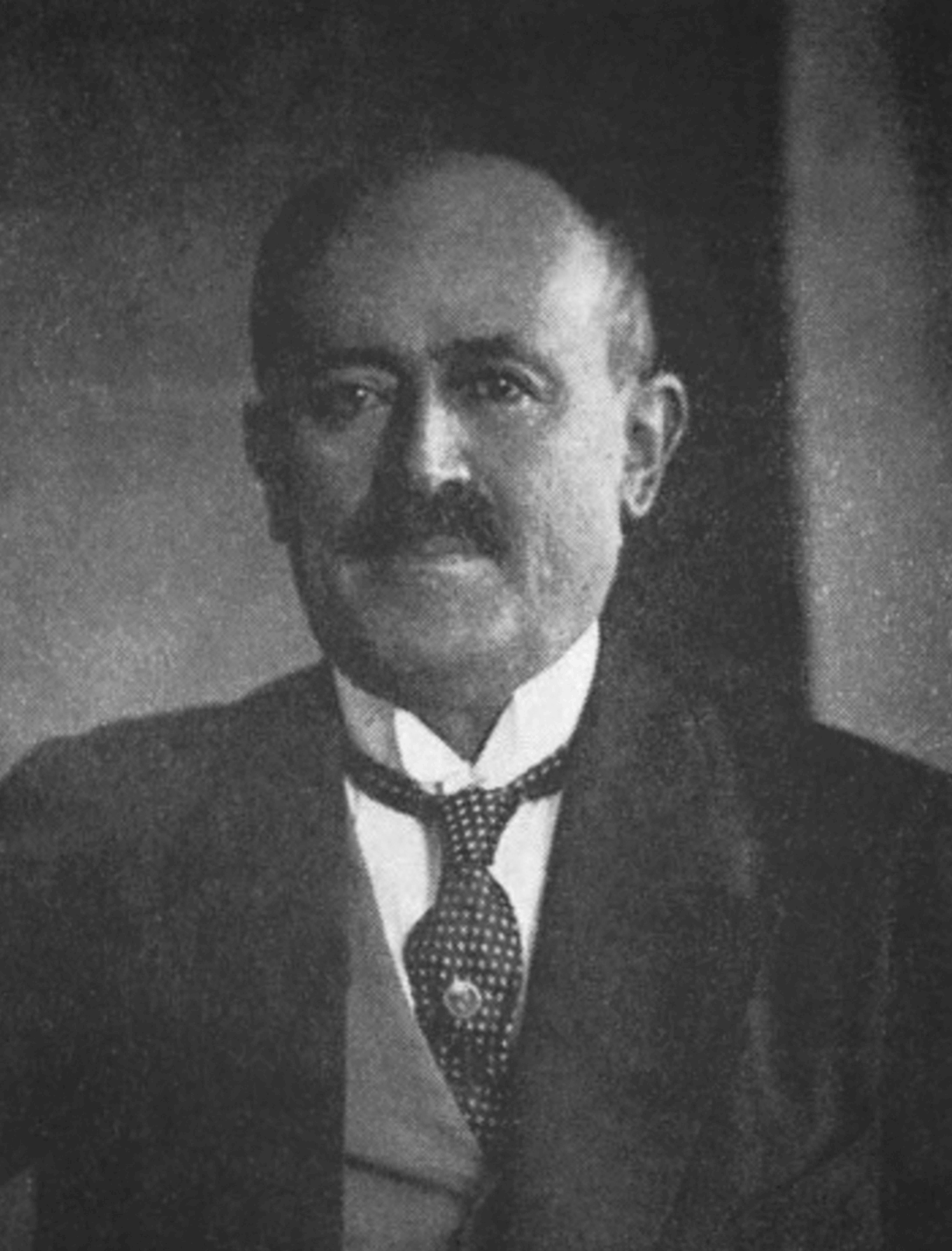
The eyes that saw a four-month-old Shoghi Effendi: Dr. Youness Khan Afroukhteh. Source: Bahaipedia.
For months after Shoghi Effendi’s birth, everyone in the Holy Land, pilgrims and resident Bahá'ís, wanted to meet 'Abdu'l-Bahá’s first grandson, a direct descendent of Bahá'u'lláh. Everyone expressed great interest, and they constantly pleaded with Shoghi Effendi’s father, Mírzá Hádí Shírází, asking if they could see the baby.
At the time, Dr. Youness Khan Afroukhteh was on his first pilgrimage to the presence of 'Abdu'l-Bahá, for a period of about five months. This was before he would return, three years later, and live at 'Abdu'l-Bahá’s side for nine years, the subject of his thrilling memoirs.
One day sometime around July 1897, when Shoghi Effendi was around four months old, he was brought to the reception room of the house of 'Abdu'l-Bahá, and the friends were beside themselves with joy, and everyone rushed to look at the infant, including Dr. Afroukhteh.
Dr. Afroukhteh tried his best to consciously look at 'Abdu'l-Bahá’s baby grandson, the great-grandson of Bahá'u'lláh, the Supreme Manifestation of God, as if he were just a Bahá'í baby, but then, he had a profound and very unexpected spiritual experience.
Although Shoghi Effendi was only four months old and Dr. Afroukhteh was, at this time in his thirties, he found himself utterly compelled to bow his head in the deep respect once he arrived before the infant. Then, for about a minute, Dr. Afroukhteh was completely captivated by the beauty of Shoghi Effendi’s face. He kissed the soft hair on his blessed head and as he kissed him, he felt an indescribable quality in Shoghi Effendi.
Dr. Afroukhteh could not stop thinking how much Shoghi Effendi looked like the traditional depictions of the infant Jesus, and for several days after first meeting Shoghi Effendi, he could clearly see his shining face in front of his eyes.
Gradually the clear image of Shoghi Effendi’s face faded, but Dr. Afroukhteh would never forget the powerful impression and the deep spiritual experience of meeting Shoghi Effendi for the first time.
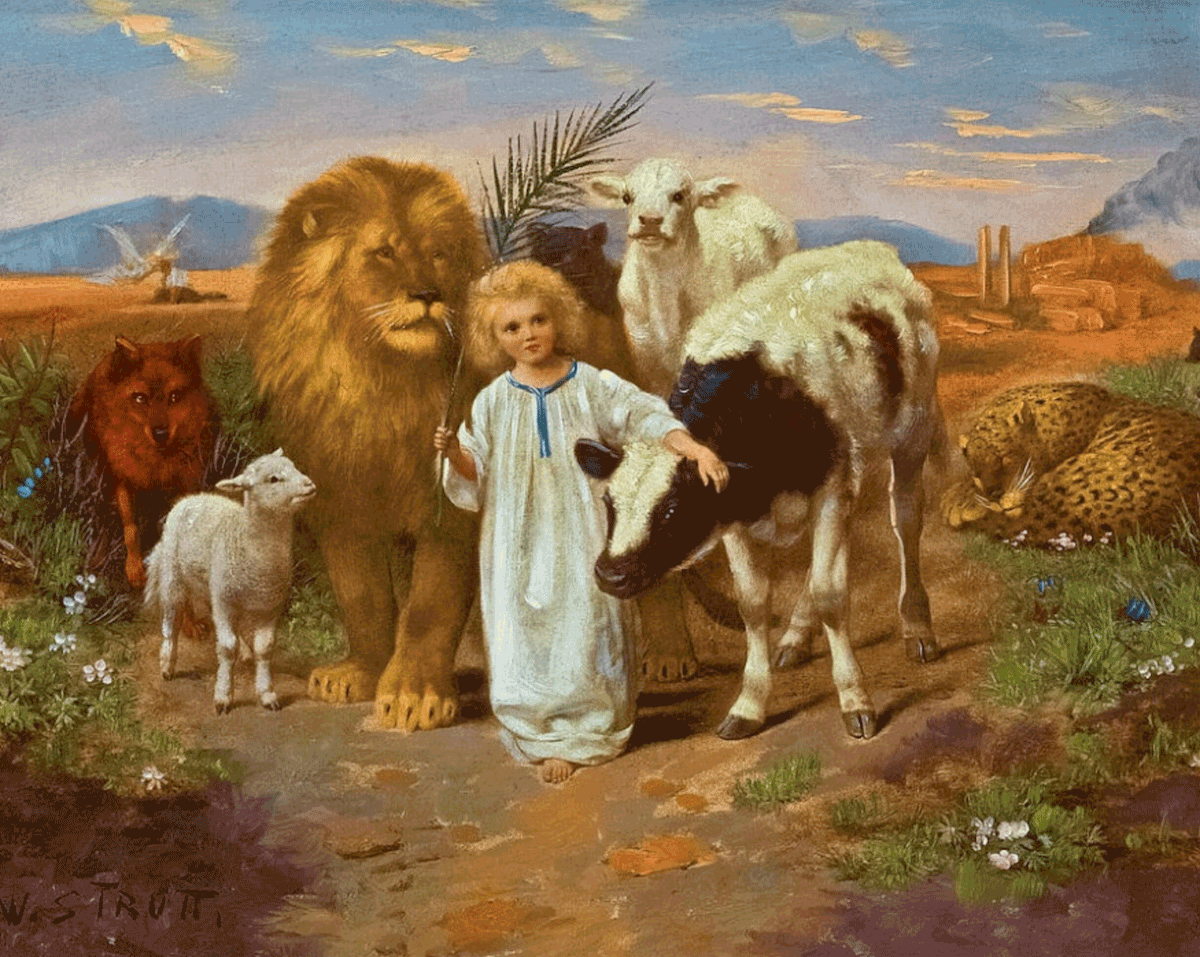
Oil painting illustrating the Bible Verse Isaiah Chapter 11, Verse 6 titled “A little child shall lead them” by William Strutt (1825–1915). Source: Wikimedia Commons.
By the early spring of 1897, news had traveled to the West that a grandson had been born to 'Abdu'l-Bahá and an American Bahá'í had written to the Master quoting the verse of Isaiah Chapter 11, Verse 6 in the Bible:
The wolf also shall dwell with the lamb, and the leopard shall lie down with the kid; and the calf and the young lion and the fatling together; and a little child shall lead them.
The woman asked 'Abdu'l-Bahá if this verse intended a real, live child who existed? ‘Abdu'l-Bahá revealed the following Tablet in response:
O Maidservant of God!
Verily, that child is born and is alive and from him will appear wondrous things that thou wilt hear of in the future. Thou shalt behold him endowed with the most perfect appearance, supreme capacity, absolute perfection, consummate power and unsurpassed might. His face will shine with a radiance that illumines all the horizons of the world; therefore forget this not as long as thou dost live inasmuch as ages and centuries will bear traces of him.
Upon thee be greetings and praise
'Abdu'l-Bahá ‘Abbas
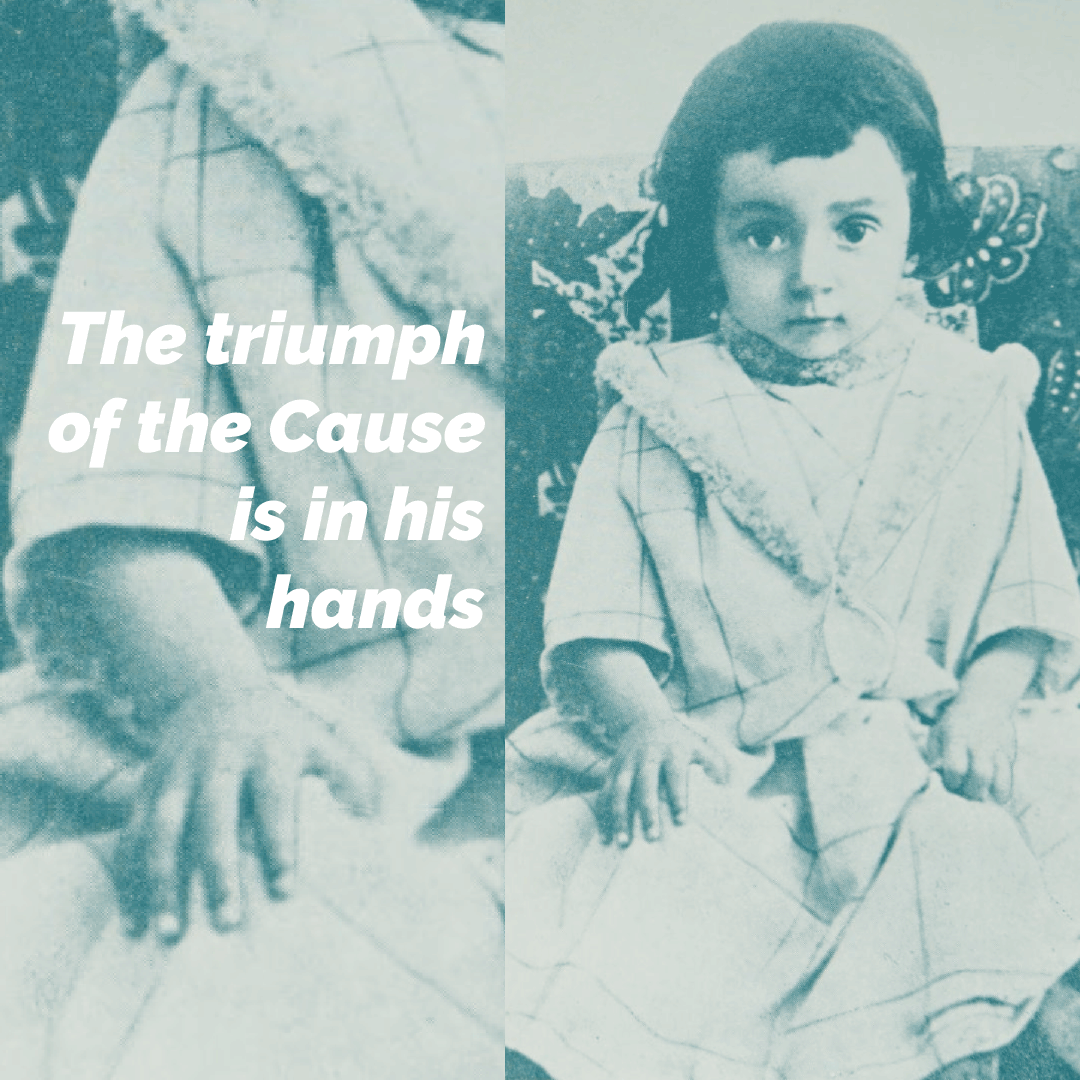
Photomontage by Violetta Zein of Shoghi Effendi’s hands as a young child illustrating the purported saying of 'Abdu'l-Bahá, shortly after Shoghi Effendi’s birth regarding his station: “The triumph of the Cause is in his hands!”.
One day, probably shortly after Shoghi Effendi was born, Dr. Afroukhteh and 'Abdu'l-Bahá were walking together, past the Khán-i-Avam˙íd—the Inn of the Pillars, the caravanserai which housed the very first Bahá'í Pilgrim House—in 'Akká.
Dr. Afroukhteh was extremely uncomfortable bringing up the contents of a newly-arrived letter he had received, written by an American believer and addressed to him. What made Dr. Afroukhteh so uncomfortable was that the writer was very direct in asking a question about what would happen after 'Abdu'l-Bahá’s death, something absolutely unthinkable for a Persian Bahá'í to bring up, talk about and most especially, ask 'Abdu'l-Bahá Himself about!
Dr. Afroukhteh would learn, many years later, that the question from the American believer was directly related to the previous story, in which 'Abdu'l-Bahá was asked whether the Bible verse “A little child shall lead them” concerned Shoghi Effendi.
But Dr. Afroukhteh summoned up his courage and very diplomatically approached 'Abdu'l-Bahá and told him:
Someone has written to me from America that we have heard the Master has said that the one whose appearance will follow me has recently been born and is in this world. If this is so we are answered, but if this is not so then ?
'Abdu'l-Bahá paused for a moment, then, with a look full of meaning and secret exaltation, He said:
Yes, this is true.
Hearing this definite and reassuring answer from 'Abdu'l-Bahá, Dr. Afroukhteh’s soul was filled with joy. Finally, proof that all that Covenant-breaking would amount to nothing and the Faith of Bahá'u'lláh would triumph.
But he still had a question, particularly about the word “appearance” in the American believer’s letter, and so he asked 'Abdu'l-Bahá:
Does this mean a revelation?
'Abdu'l-Bahá did not answer his yes or no question with a “yes” or a “no.” Instead, 'Abdu'l-Bahá put an end to that specific line of inquiry by stating very clearly:
The triumph of the Cause of God is in his hands!
Dr. Afroukhteh followed 'Abdu'l-Bahá’s lead in responding to the letter, but didn’t allow himself to wonder where this child was born, and whether he was in Karbilá or somewhere else in the world.
Five years later, however, he received the answer to his silent question, when he clearly observed Shoghi Effendi’s wondrous moral virtues and evident marks of greatness, even in his childhood.
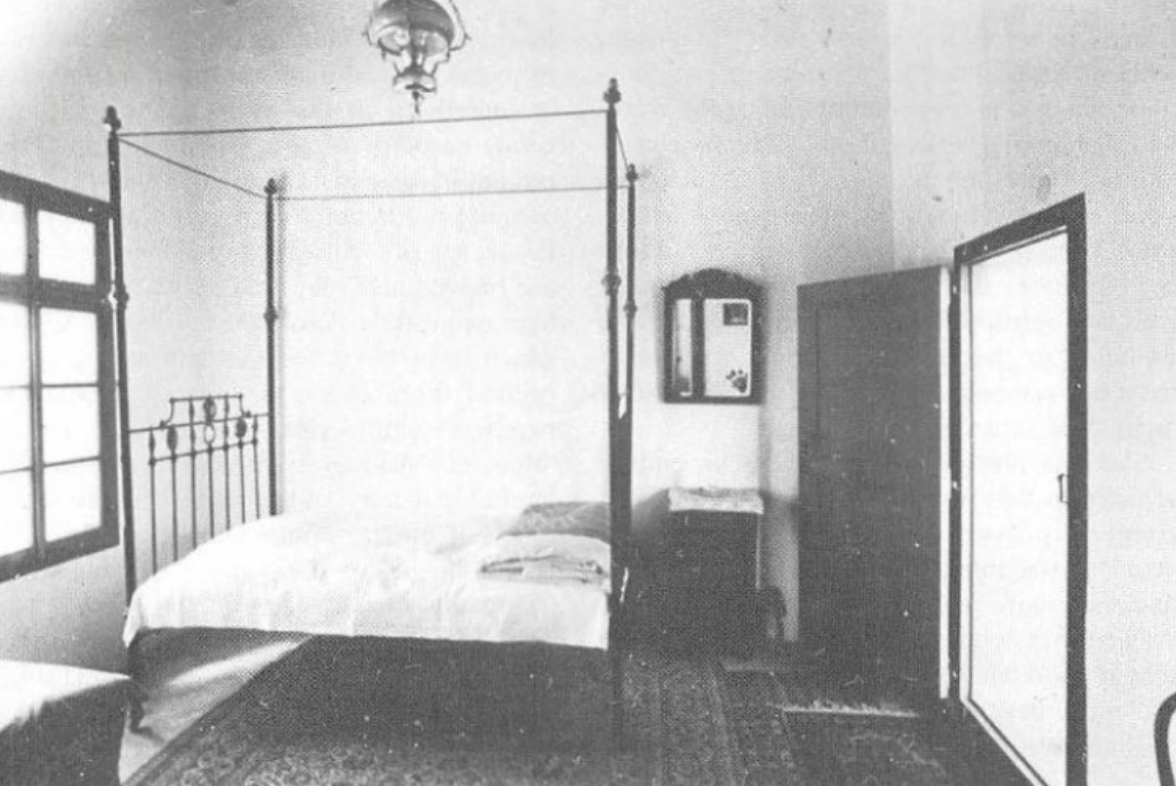
'Abdu'l-Bahá's room in 'Abdu'lláh Páshá. Bahá'í World Volume 18, page 95.
One night, while still an infant, Shoghi Effendi woke up crying and His loving Grandfather, 'Abdu'l-Bahá asked his nurse to bring Shoghi Effendi to Him so that He could comfort him. 'Abdu'l-Bahá said to His sister, the Greatest Holy Leaf:
See, already he has dreams!
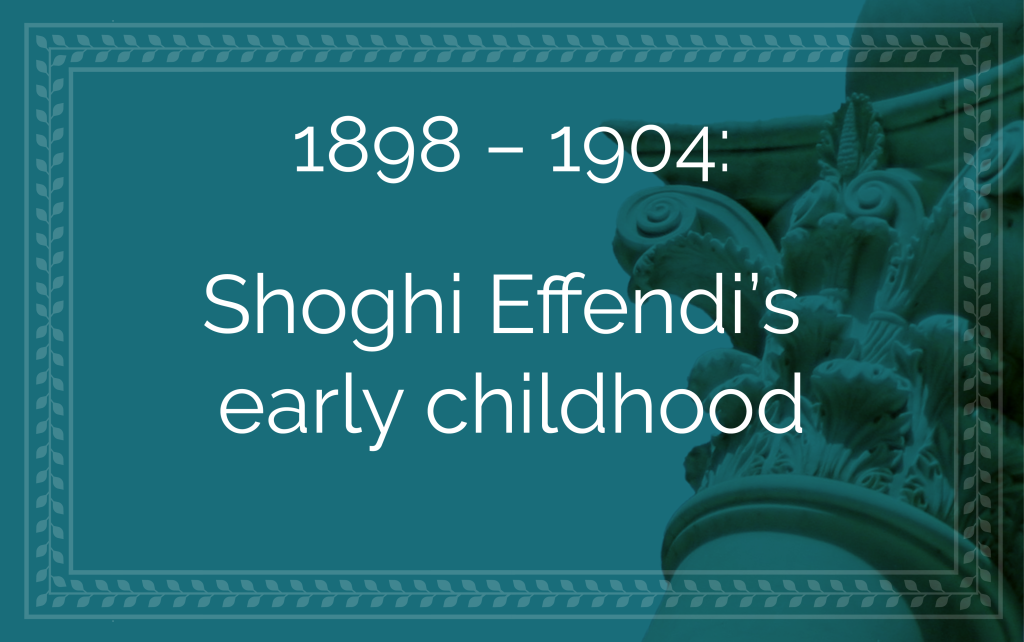
March 1899: Ella Goodall Cooper witnesses the spiritual bond between 'Abdu'l-Bahá and Shoghi Effendi
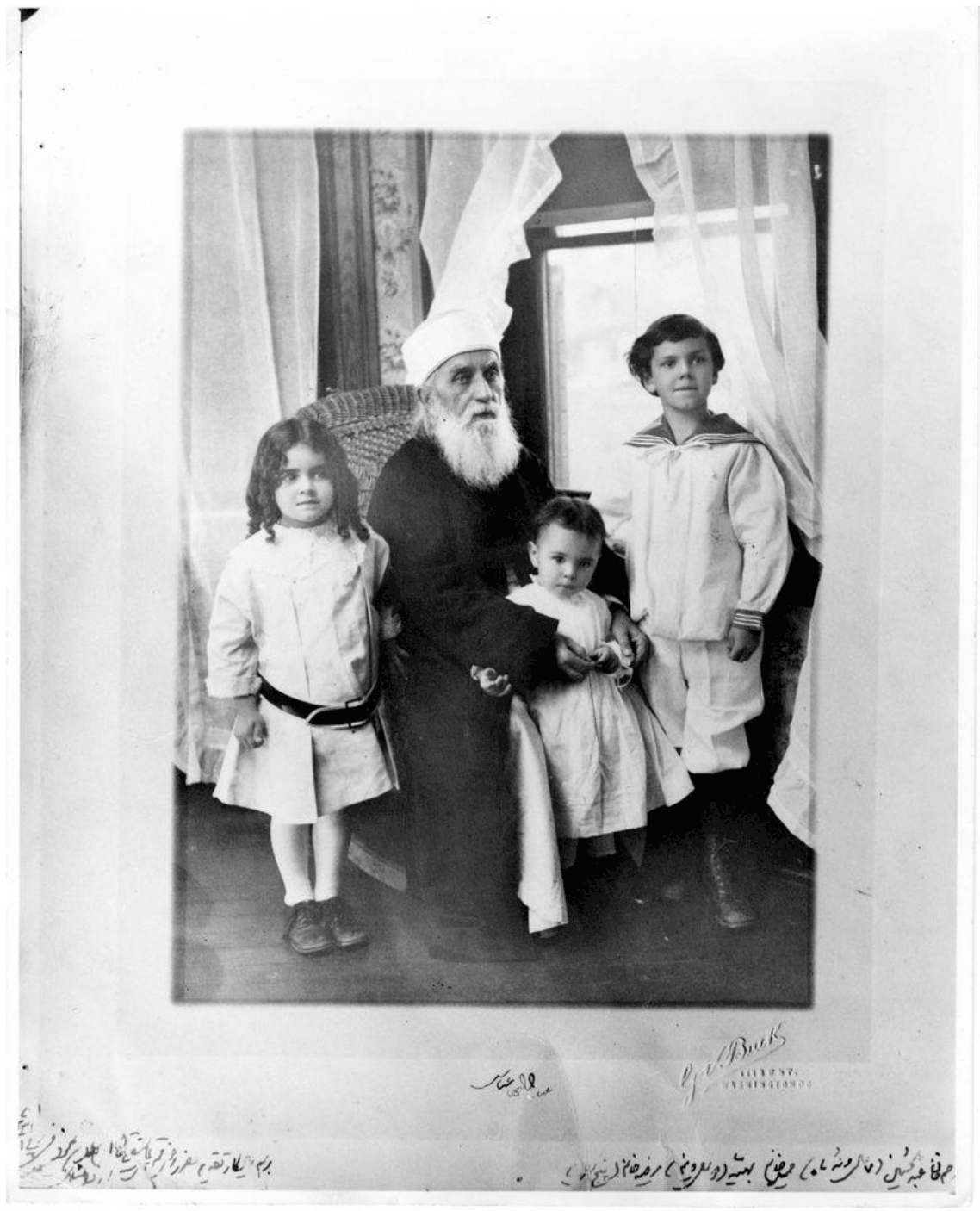
For a story about the connection between 'Abdu'l-Bahá and Shoghi Effendi as a toddler, a photograph dated 24 April 1912 of ‘Abdu’l-Bahá seated with with the Khán children: Marzieh—later Marzieh Gail—Hamideh and Rahim, children of ‘Alí Qulí and Florence Khán in their Washington D.C. home. Source: 'Abdu'l-Bahá in America.
When Shoghi Effendi was a little less than 2 years old, the very first western pilgrims arrived in 'Akká and at the house of 'Abdu'lláh Pashá to meet 'Abdu'l-Bahá, led by Phoebe Hearst and including Robert Turner, Anne Apperson, Julia Pearson, Lua Getsinger, and Ella Goodall Cooper. Around March 1899, Ella Goodall was with the ladies of the Holy Family in the room of the Greatest Holy Leaf for morning tea, in the presence of 'Abdu'l-Bahá, who was sitting in His favorite corner of the divan, where He could look out onto the blue Mediterranean through the window on His right.
'Abdu'l-Bahá was occupied with revealing Tablets, and the room was quiet, with just the sound of the bubbling samovar, and the soft sounds of a young woman brewing tea. 'Abdu'l-Bahá looked up and asked Shoghi Effendi’s mother, Ḍíyá‘íyyih Khánum to chant a prayer. When she finished, the two-year-old Shoghi Effendi appeared in the doorway, immediately opposite His Grandfather. Ella Goodall describes the scene that followed:
Having dropped off his shoes he stepped into the room, with his eyes focused on the Master's face. 'Abdu'l-Bahá returned his gaze with a look of loving welcome it seemed to beckon the small one to approach Him. Shoghi, that beautiful little boy, with his cameo face and his soulful appealing, dark eyes, walked slowly toward the divan, the Master drawing him as by an invisible thread, until he stood quite close in front of Him.
As he paused there a moment 'Abdu'l-Bahá did not offer to embrace him but sat perfectly still, only nodding His head two or three times, slowly and impressively, as if to say— "You see? This tie connecting us is not just that of a physical grandfather but something far deeper and more significant."
While we breathlessly watched to see what he would do, the little boy reached down and picking up the hem of 'Abdu'l-Bahá's robe he touched it reverently to his forehead, and kissed it, then gently replaced it, while never taking his eyes from the adored Master's face. The next moment he turned away, and scampered off to play, like any normal child...At that time he was 'Abdu'l-Bahá's only grandchild... and, naturally, he was of immense interest to the pilgrims.
The story of 'Abdu'l-Bahá and Shoghi Effendi is a story of all-consuming love. As an adult, Shoghi Effendi would often speak to his wife, Amatu’l-Bahá Rúḥíyyih Khánum about his childhood with 'Abdu'l-Bahá, and she understood the constraints of that love, which both Grandfather and grandchild were aware of in Shoghi Effendi’s early childhood.
They both struggled with a love for each other that was bound by external circumstances. 'Abdu'l-Bahá could not give free rein to His affection, His love, His preference of Shoghi Effendi. He could not express visibly the intensity of His love for him, because to show the depth and breadth of such a powerful love and to make visible such a strong connection would endanger Shoghi Effendi’s life.
'Abdu'l-Bahá’s many enemies would have loved to discover such a weakness in 'Abdu'l-Bahá, namely the love of His grandchild, and would have surely used it to hurt the Master and Shoghi Effendi. Even as such a young child, Shoghi Effendi had been aware of this. He knew that 'Abdu'l-Bahá had to leash his love for him in order to protect and safeguard him. And in protecting and safeguarding Shoghi Effendi, 'Abdu'l-Bahá was protecting the Covenant.
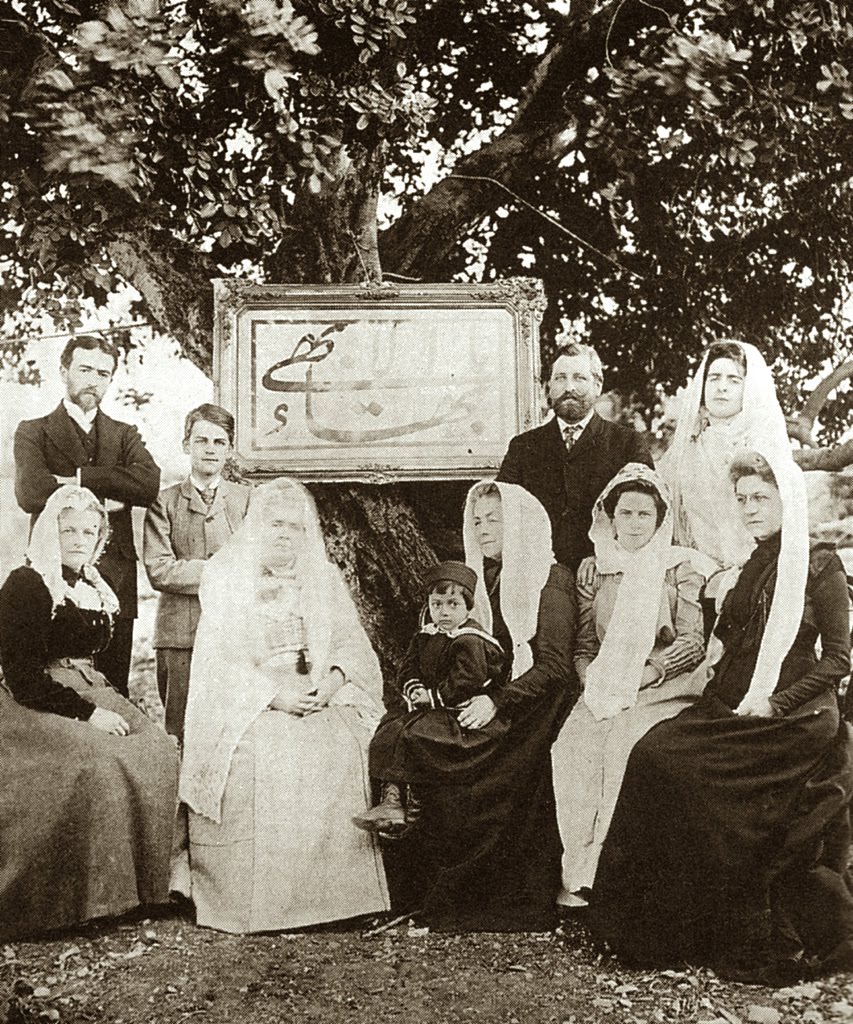
Shoghi Effendi with early western pilgrims in 1901. Standing left to right: Charles Mason Remey, Sigurd Russell, Edward Getsinger and Laura Clifford Barney; Seated left to right: Ethel Jenner Rosenberg, Madam Jackson, Shoghi Effendi, Helen Ellis Cole, Lua Getsinger, Emogene Hoagg. Source: A Bahá'í Glossary.
On 30 October 1900, Charlotte, Louise and Eleanor Dixon arrived on pilgrimage from Washington, D.C. and were taken to the house of 'Abdu'l-Bahá in Haifa, where they were welcomed by Lua Getsinger and Harriet Thonrburgh. The Dixon family was introduced to Bahíyyih Khánum, the Greatest Holy Leaf, with a three-and-a-half-year-old Shoghi Effendi sitting in her lap. Shoghi Effendi greeted the pilgrims with the only words of English he knew:
I love you very much.
Then, the three-and-a-half-year old Shoghi Effendi chanted a prayer for them.
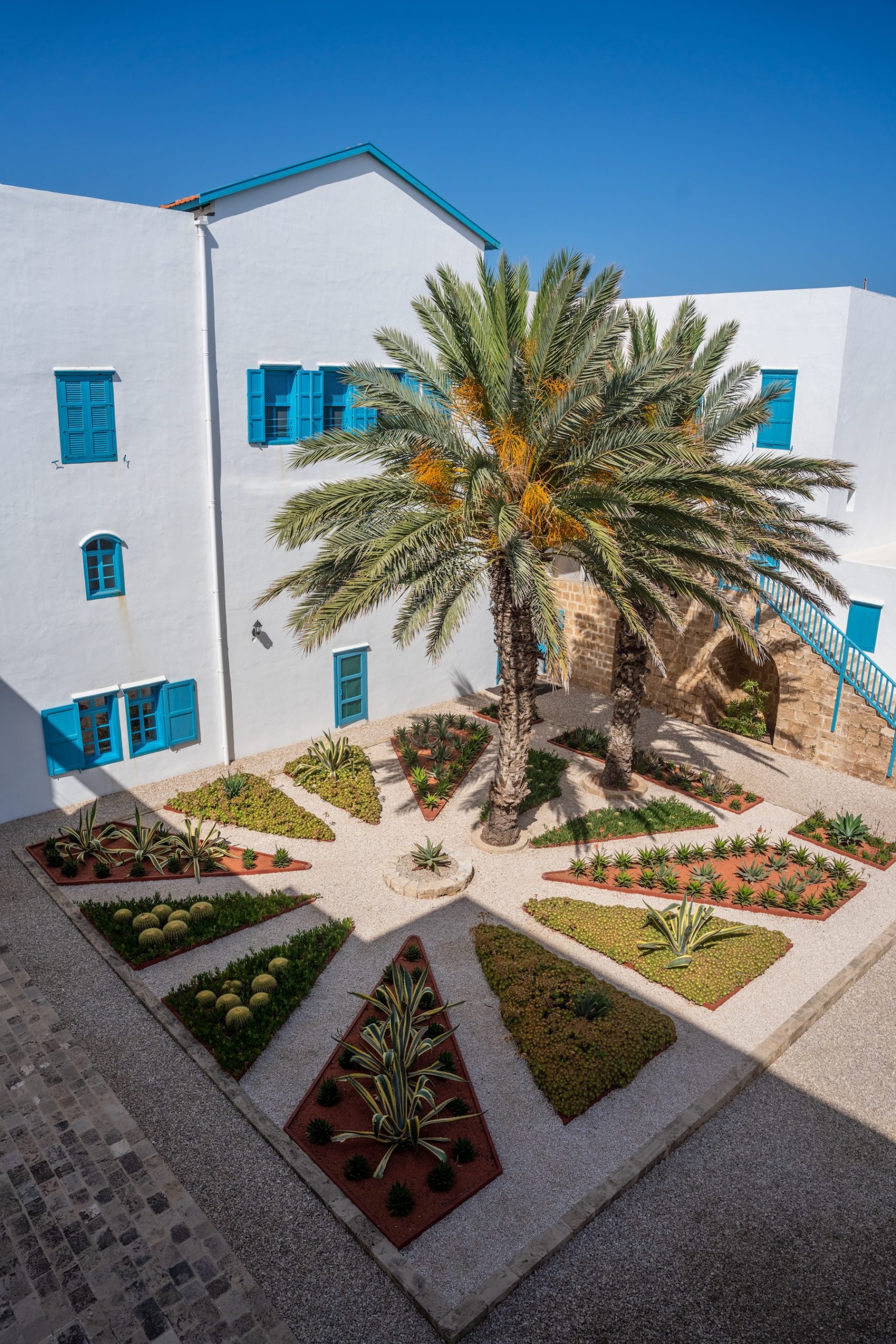
The inner courtyard of the House of 'Abdu'lláh Pashá, where the story below takes place. Photograph by Farzam Sabetian. Source: Luminous Spot: House of Abdu'lláh Pashá.
When Shoghi Effendi was only five years old he would insist that 'Abdu'l-Bahá write something for him, and so the Master revealed a very touching letter for His grandson, Shoghi Effendi’s first Tablet from 'Abdu'l-Bahá:
He is God! O My Shoghi, I have no time to talk, leave me alone! You said "write" - I have written. What else should be done? Now is not the time for you to read and write, it is the time for jumping about and chanting "O My God!", therefore memorize the prayers of the Blessed Beauty and chant them that I may hear them, because there is no time for anything else.
When Shoghi Effendi received this wonderful gift, he immediately began memorizing a number of Bahá'u'lláh's prayers and would chant them so loudly that the entire neighborhood could hear him!
Shoghi Effendi’s parents and other members of the family tried to get him to stop and scolded him, but Shoghi Effendi replied:
The Master wrote to me to chant that He may hear me! I am doing my best!
Shoghi Effendi, perseverant and hard-working as a child as he would be as the Guardian, kept on chanting at the top of his voice for many hours every day. In the end, his parents went to 'Abdu'l-Bahá and begged him to stop the child. But 'Abdu'l-Bahá told his parents to leave Shoghi Effendi alone.
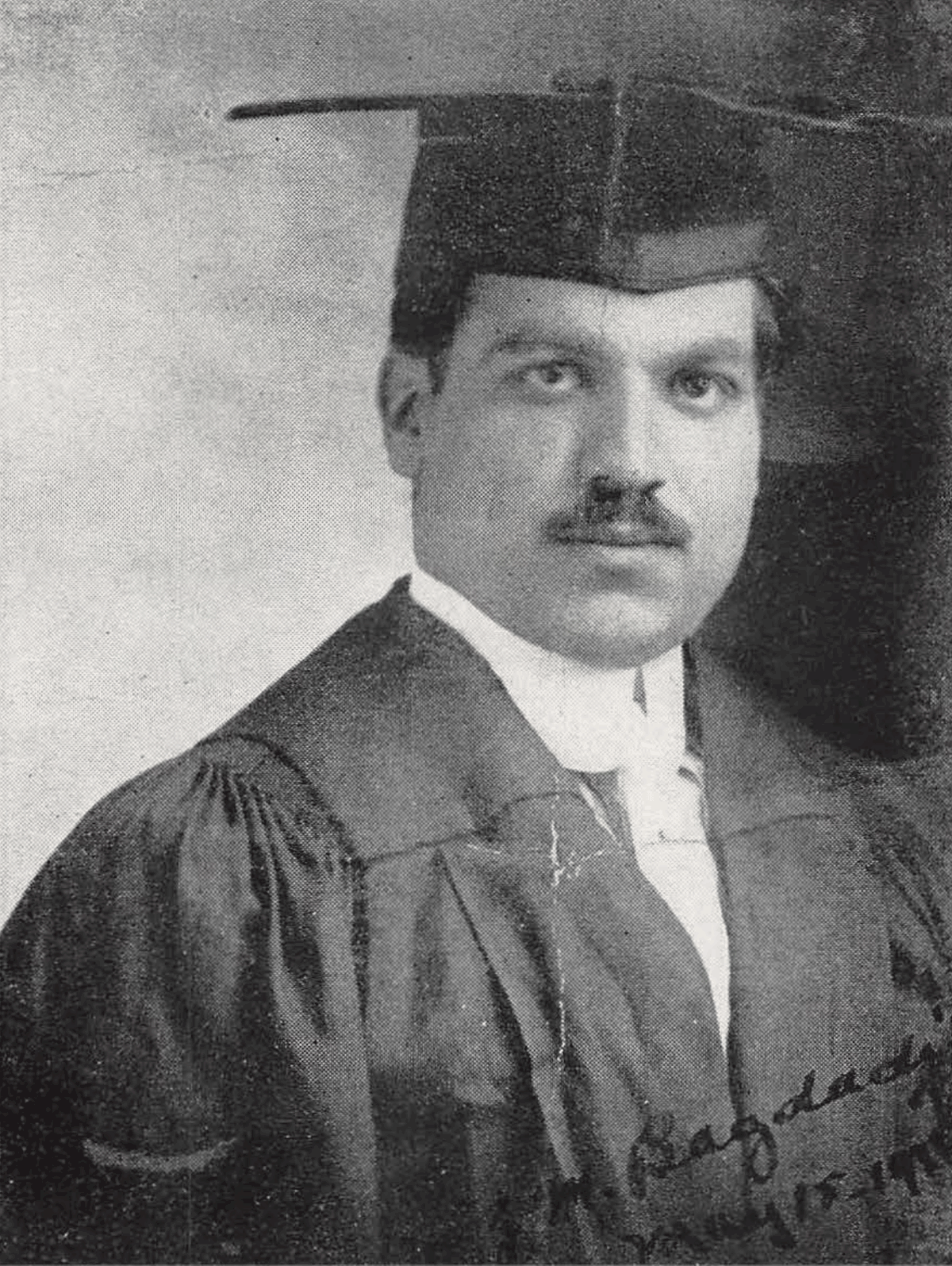
Dr. Zia Baghdadi, the young medical student in the story below, already impressed with a young Shoghi Effendi’s spiritual qualities, curiosity and interest in science. Source: Bahaipedia.
In 1902/1903, when Shoghi Effendi was five or six, he and his family traveled to Beirut, Lebanon, and Shoghi Effendi made a lifelong friend in Zia Baghdádí. A year later, Dr. Zia Baghdadi came to visit 'Abdu'l-Bahá, and Shoghi Effendi, accompanied his parents, the Greatest Holy Leaf and other members of the family, to welcome the young doctor.
Shoghi Effendi spent most of his time in Dr Baghdadi's room, looking at the pictures in his medical books and asking questions, but soon, the young child was asking to see a live dissection, not just pictures.
Dr. Baghdadi obliged, and got a servant to shoot a large wildcat. He began dissecting the animal in front of Shoghi Effendi, one of his aunts and the servant who had killed the animal and explaining what he was doing as he was proceeding. Shoghi Effendi watched in absorbed silence.
When he had finished dissecting, Dr. Baghdadi asked himself how much could such a young child have understood of the complex procedure, and was completely astonished to hear Shoghi Effendi repeat word for word the main points he had made as he was dissecting. Dr. Baghdadi would later state:
I said to myself, "this is not an ordinary child, verily this is a precious and darling angel!"
Twelve years later, one of Shoghi Effendi’s first subjects in Beirut would be Zoology.
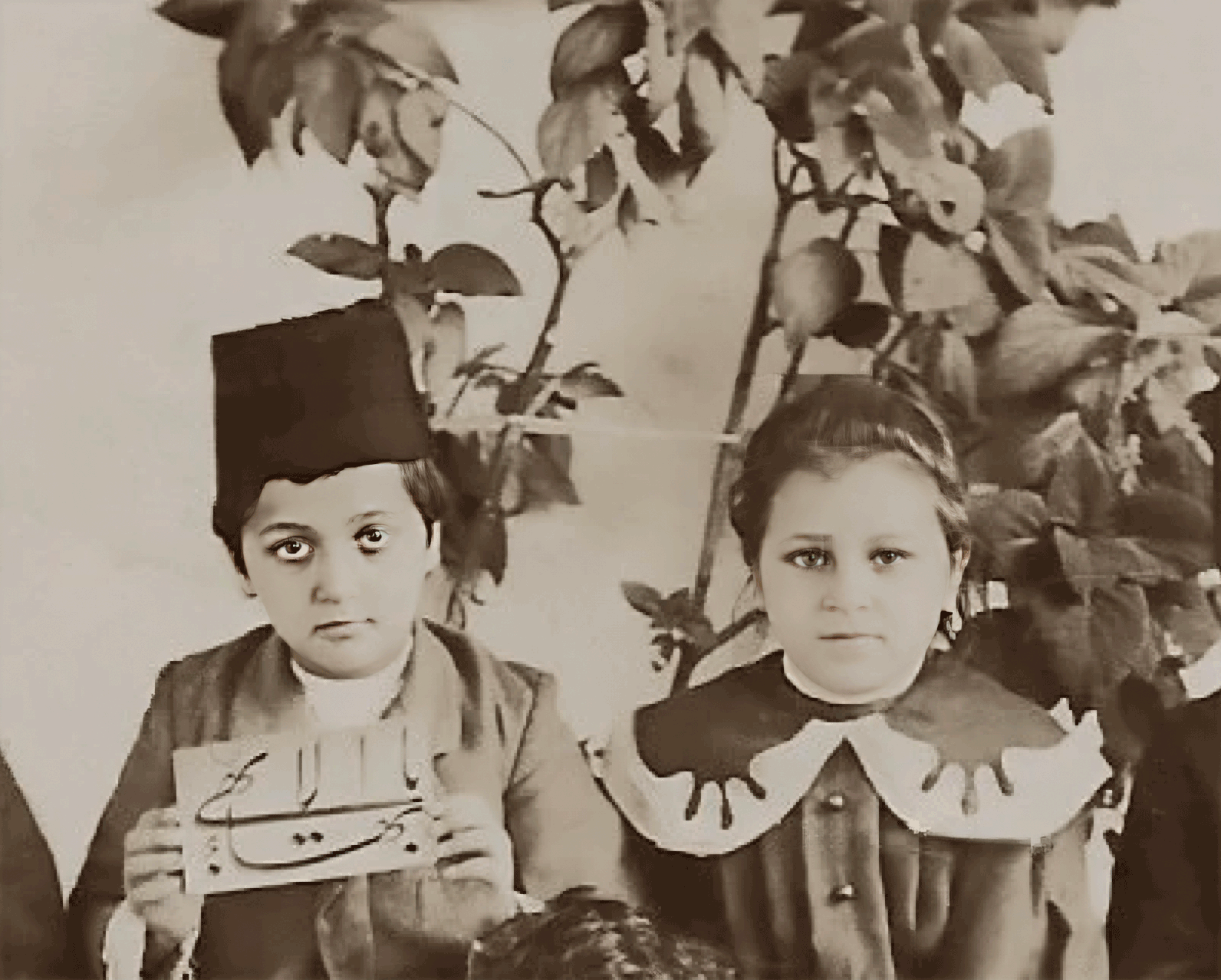
Shoghi Effendi as a young child with one of his sisters. Source: Reddit.
On 21 April 1904, Laura Barney and Ethel Rosenberg arrived in 'Akká for a one-year pilgrimage during which Laura began working on her masterpiece, Some Answered Questions, in which 'Abdu'l-Bahá gave her His tired moments to answer timeless spiritual questions. This was Laura Barney’s third pilgrim, and she would return to the Holy Land several more times. This was a dangerous time for 'Abdu'l-Bahá, as the Commission of Inquiry would arrive from Istanbul to question Him during Laura Barney’s pilgrimage.
At the time, Shoghi Effendi was 7-8 years old, rather small for his age, but very keen and attentive. After his early morning studies, Shoghi Effendi would follow 'Abdu'l-Bahá around like His shadow, and spent long hours sitting on the Persian rug, silently listening to every word the Grandfather he worshipped with all his heart was saying.
Shoghi Effendi had a truly remarkable memory, and at times, in the presence of pilgrims, 'Abdu'l-Bahá would ask His favorite grandson, the apple of His eye, to recite passages from Bahá'u'lláh’s writings or chant prayers Shoghi Effendi had memorized.
Laura Barney was very moved by Shoghi Effendi’s limpid, crystalline chanting, and it was obvious to her that Shoghi Effendi’s entire being and his soul were engaged in communion with God during those precious moments. Shoghi Effendi’s eagerness—a quality he retained until his death—animated him like a burning fire in everything that he did.
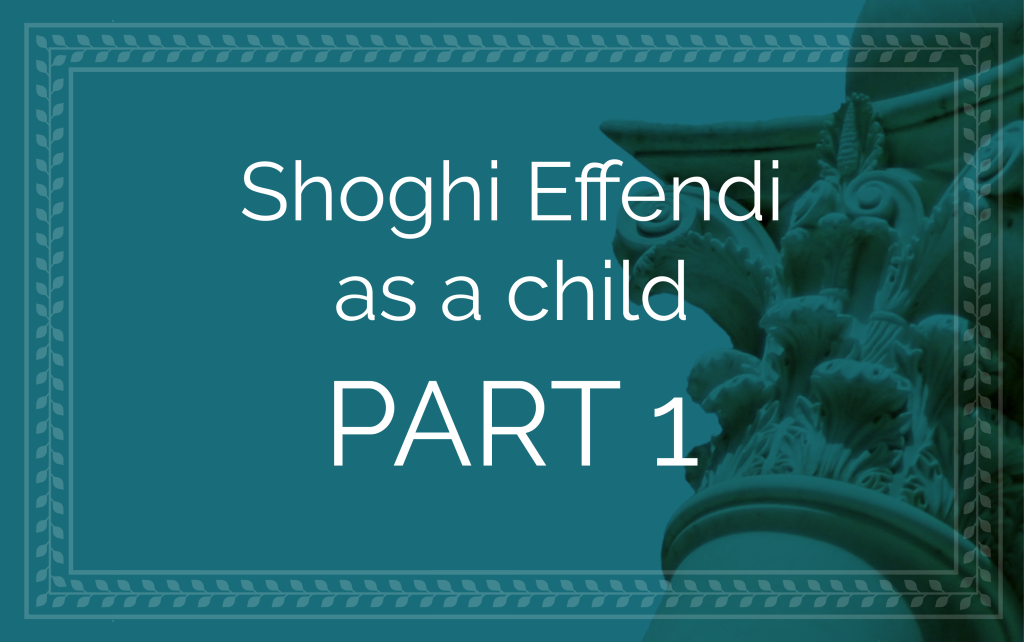
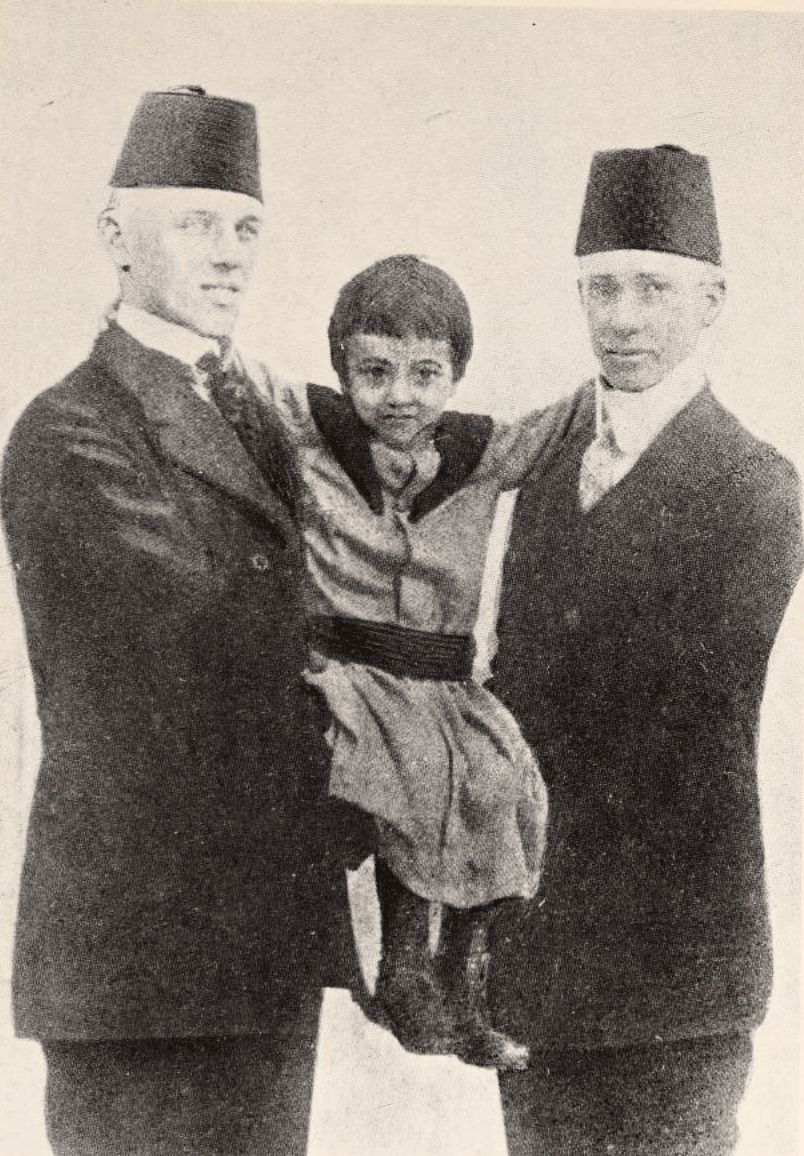
Shoghi Effendi as a young child, smiling as he is held aloft. Source: The Priceless Pearl, between pages 24 and 25.
In Amatu’l-Bahá Rúḥíyyih Khánum’s words, Shoghi Effendi “was a small, sensitive, intensely active and mischievous child.” Later, Shoghi Effendi himself would say that in childhood, he had been the acknowledged ring-leader of all the other children. Shoghi Effendi was bubbling with joy, enthusiasm and daring, he was full of laughter and wit, and he was the mastermind of many pranks.
Filled with boundless energy, Shoghi Effendi often raced up and down the long flight of high steps to the upper story of the house of 'Abdu'lláh Pashá, to the consternation of the pilgrims below, anxiously waiting to meet 'Abdu'l-Bahá. Shoghi Effendi’s irrepressible exuberance was the source of the adult Shoghi Effendi’s tireless and unflinching reserves of energy, which would lead him in the decades to come to victory after victory.
'Abdu'l-Bahá Himself was a witness to Shoghi Effendi’s tireless energy. One day, He wrote a little sentence on the back of a used envelope a few lines to please His little grandson:
Shoghi Effendi is a wise man - but he runs about very much!
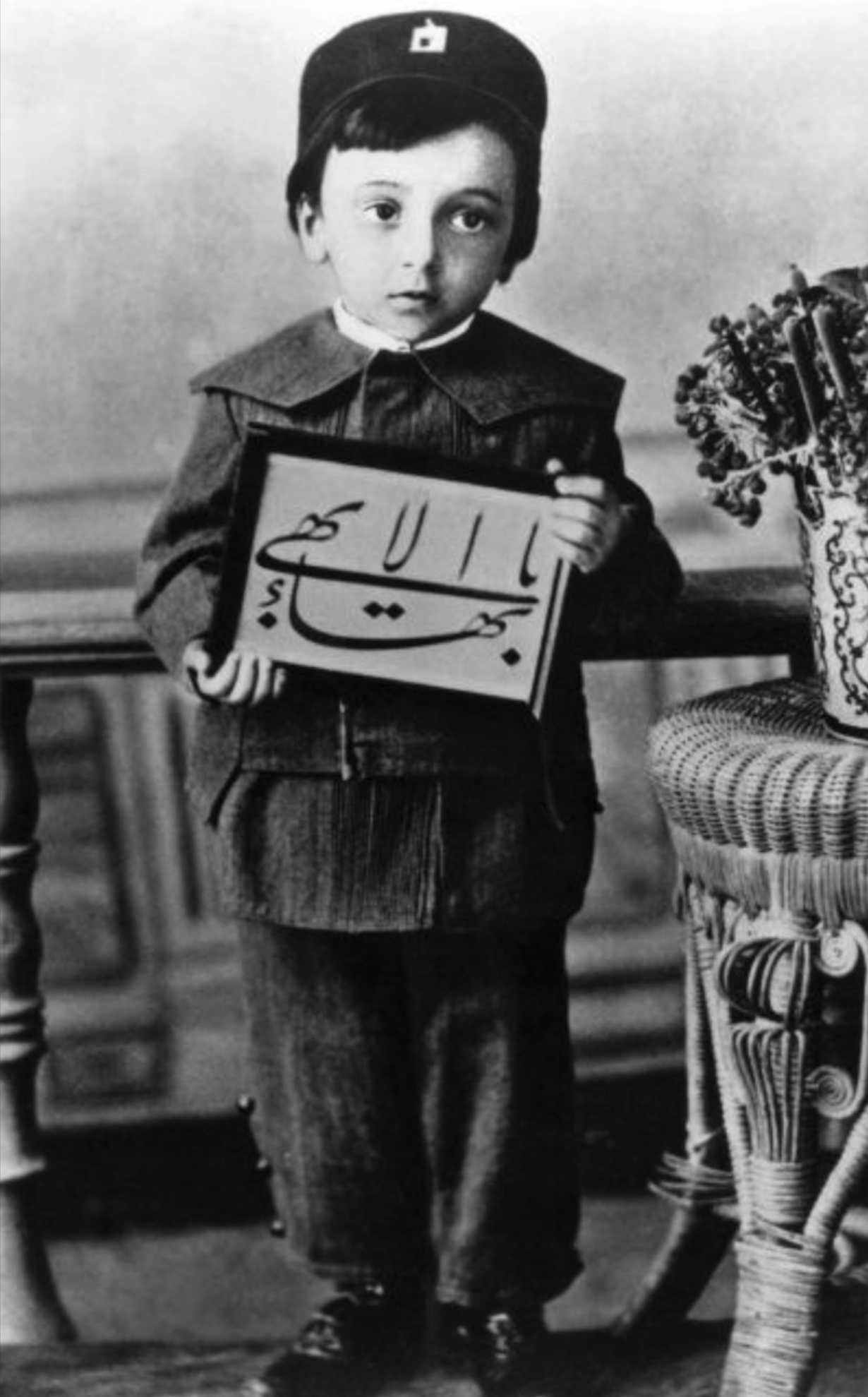
Shoghi Effendi was not born very strong and was fine-boned, and at first his mother, Ḍíyá‘íyyih Khánum worried a lot over his health, but he would soon grow to have a strong, constitution, an iron will-power and a phenomenally strong force of nature.
As a young child, he had a beautiful little heart-shaped face with immense, very intense hazel-colored eyes which sometimes changed to a warm grey. His face was deeply expressive. Shoghi Effendi would be shorter than 'Abdu'l-Bahá and more closely resembled his great-grandfather, Bahá'u'lláh.
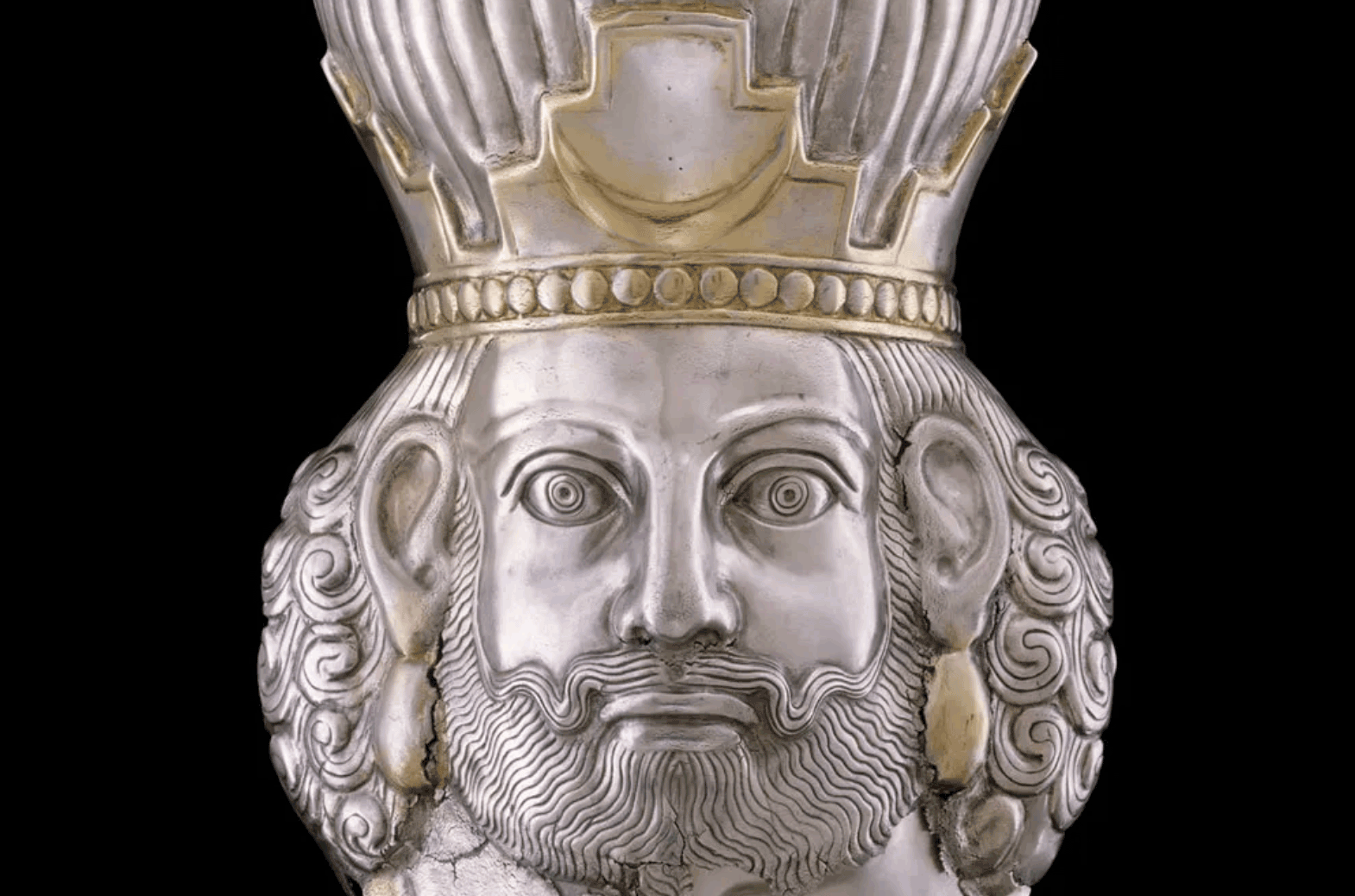
Shoghi Effendi was a descendent of the Sásáníyan kings. The subtlety and exquisite beauty of Sásáníyan art: Detail of Sassanian metalwork depicting the head of a King from the 4th Century. Source: Metropolitan Museum of Art, New York.
But of course, even though he was mischievous, Shoghi Effendi was impeccably raised, having been taught courtesy and manners from the cradle. After all, Bahá'u'lláh’s family was of exceedingly noble stock, descended from Zoroaster and the Sásáníyán kings of Persia on Bahá'u'lláh’s side and on Ásíyih Khánum’s side descended from Abraham.
The Holy Family’s tradition, above and beyond the teachings of the Faith, considered courtesy as obligatory, and ensured that Shoghi Effendi was distinguished with noble conduct and extreme politeness from his babyhood. Nowhere was Shoghi Effendi’s courtesy and perfect conduct more obvious than in his worshipful attitude to His beloved Grandfather.
Shoghi Effendi also had a deeply tender and sweet nature. If it ever happened that he had somehow offended a playmate—and this would only happen unless the child had cheated or schemed—Shoghi Effendi could not go to sleep before he had made his friend happy and they had embraced. Even as a child, he always encouraged his friends to make up their differences before going to bed.
Shoghi Effendi also had a deeply spiritual nature and was prone to vivid and meaningful dreams, sometimes pleasant, but also at times unpleasant.
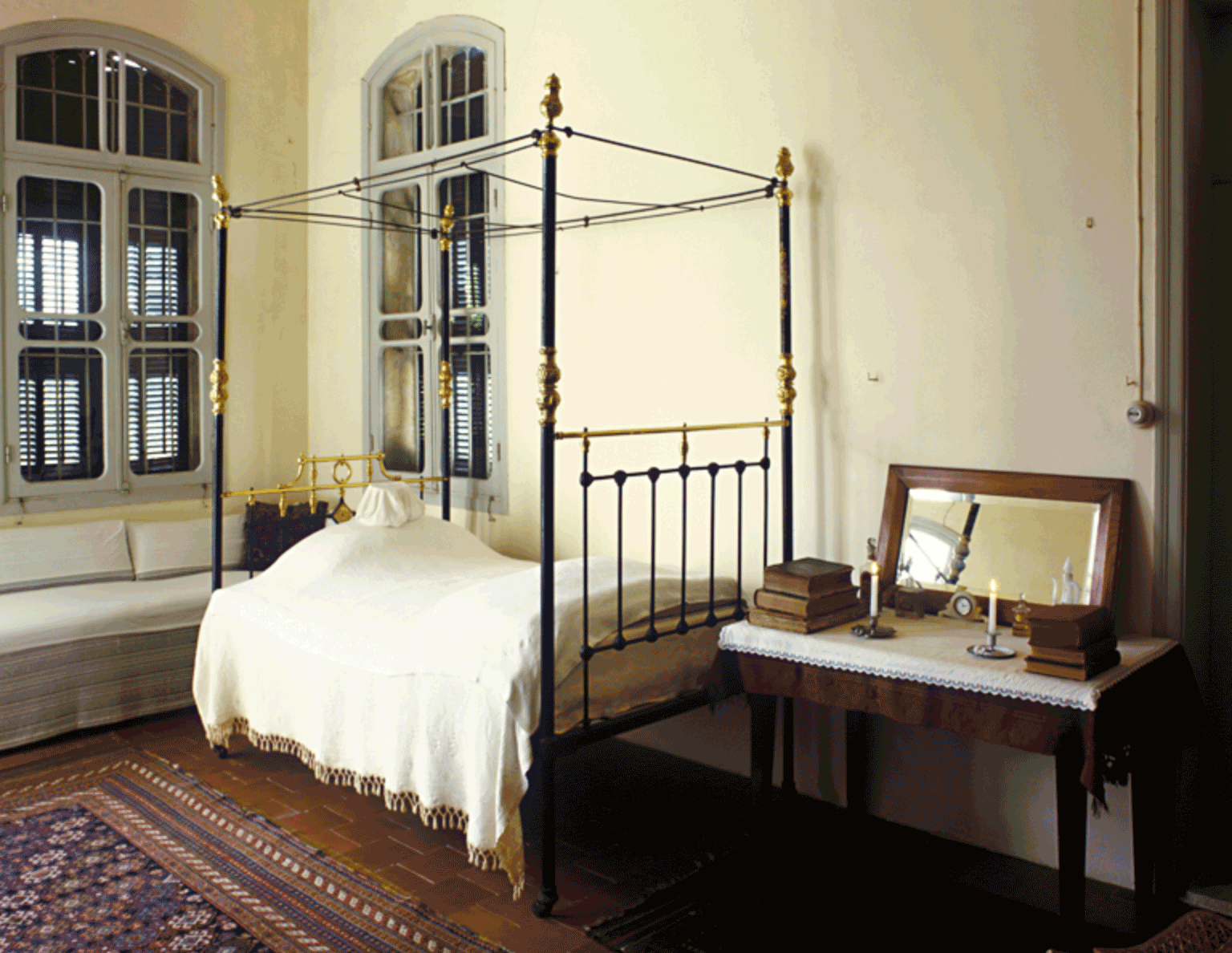
'Abdu'l-Bahá’s room in His home at 7 Haparsim in Haifa, where the Holy Family usually spent the first hour of the day having very hot and very sweet tea brewed from a Russian samovar. Source: Bahá'í Stories.
In Shoghi Effendi's childhood, the Holy Family had the habit of rising at dawn and spending the first hour of the day in 'Abdu'l-Bahá’s room. Shoghi Effendi had once been late for morning prayers, and he was never late, ever again. From that moment on, he was always the first one to get up and arrive in the Master’s room.
In the morning, the children sat on the floor, their legs folded under them, the family and the children would chant prayers, and eat breakfast with 'Abdu'l-Bahá. Amatu’l-Bahá Rúḥíyyih Khánum describes the Holy Family’s morning meal:
Breakfast consisted of tea, brewed on the bubbling Russian brass samovar and served in little crystal glasses, very hot and very sweet, pure wheat bread and goat's milk cheese.
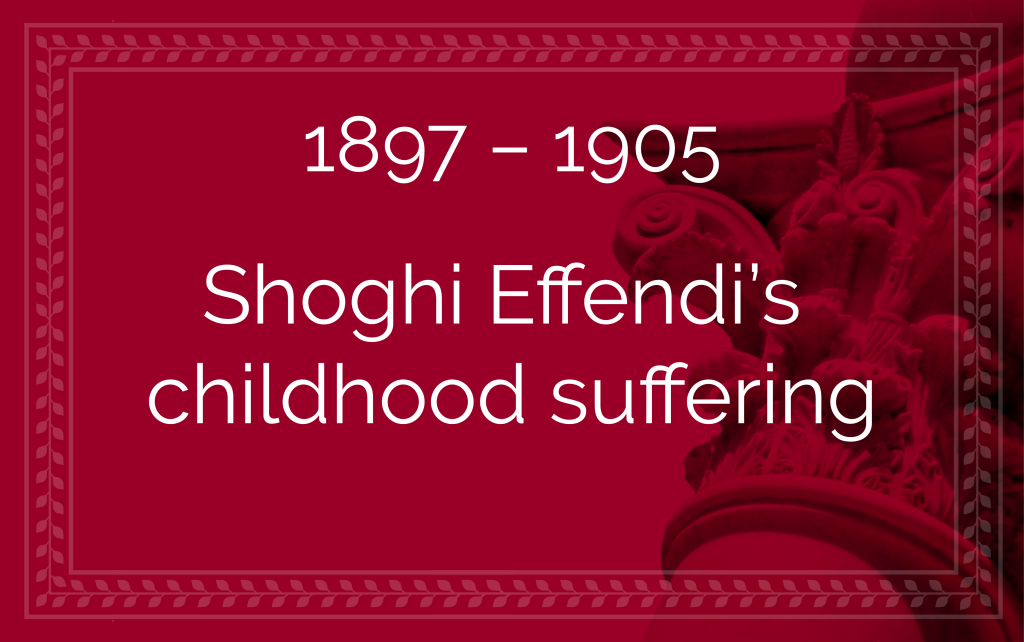

'Abdu'l-Bahá, Center of the Covenant of Bahá'u'lláh. This colorized portrait of Him in Paris in October 1911, was the first He allowed since 1868 in Adrianople, and was taken exactly 19 years after the Ascension of Bahá'u'lláh. 'Abdu'l-Bahá’s signature in Persian and in English can be seen in the bottom right. Source: Bahá'í Media Bank © Bahá'í International Community.
From the moment of his birth, Shoghi Effendi was surrounded by his Grandfather 'Abdu'l-Bahá’s suffering. In 1897, when he was born, Covenant-breaking was at its highest since the Ascension of Bahá'u'lláh, although it had started just hours after He had passed away when Mírzá Muḥammad-'Alí stole the two cases of Bahá'u'lláh, 'Abdu'l-Bahá’s Own inheritance.
Shoghi Effendi was an infant when it started and he was 8 years old when the climax of the Commission of Inquiry took place.
It is important, as we begin this intense dive into the Guardian’s entire life, to understand that he was inured to suffering from the moment he was born, and to understand why being named Guardian of the Cause by 'Abdu'l-Bahá sent him into such a shock.
Shoghi Effendi knew exactly what being Head of the Bahá’í Faith entailed because he had witnessed first-hand his own Grandfather suffering like a living martyr through the nightmare of Covenant-breaking during His own ministry.
This chronology is focused on Shoghi Effendi, who had no role in these events, but because they had an enormous impact on the person and the Guardian he became, we will list the main events of Covenant-breaking and opposition—from 'Abdu'l-Bahá’s internal and external enemies—that took place in 'Akká between 1897 and 1905.
This will provide a balanced understanding of what Shoghi Effendi’s childhood must have been like, especially since he was such a sensitive, perceptive young boy living with 'Abdu'l-Bahá while these forces of evil attacked his Grandfather, day and night.
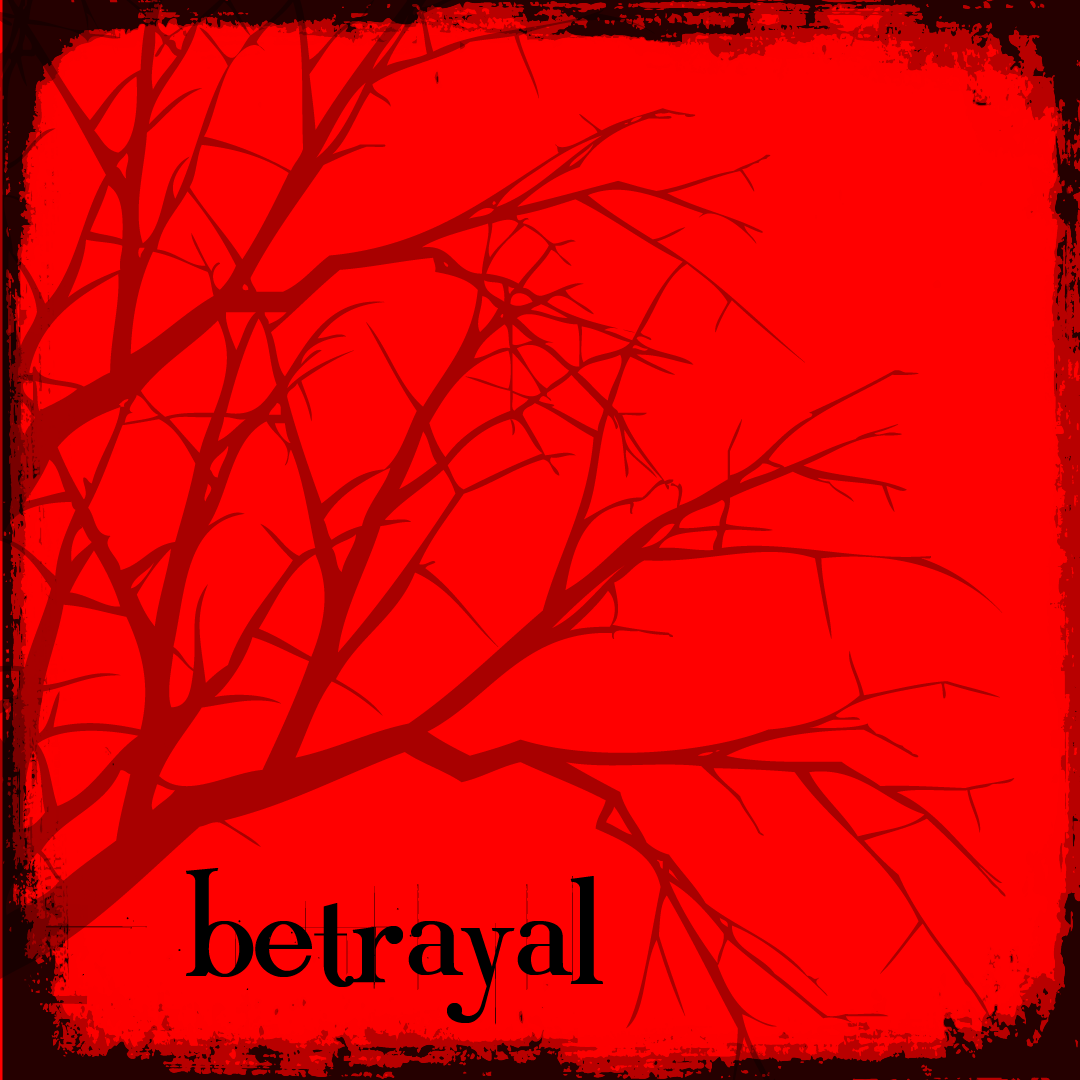
Betrayal. Art assets by kjpargeter on Freepik.
In 1897—the year Shoghi Effendi was born—Mírzá Áqá Ján, Bahá'u'lláh’s amanuensis for 40 years, committed to the Covenant-breakers, and plotted secretly with them on ways to destabilize the Bahá'í community and cause the greatest possible amount of discord and division. He lied about receiving Revelation from God, lied about having attained the presence of Bahá'u'lláh in a dream, lied about having received a Tablet from heaven which he wrote himself in green ink in the same “Revelation Writing” which he had used to take down Bahá'u'lláh’s Revelation, and then he did the inexcusable.
From 1897 to 1900, Mírzá Áqá Ján lived INSIDE the Holiest Shrine of Bahá'u'lláh.
For three years, 'Abdu'l-Bahá and the Bahá'ís had to pray OUTSIDE the Holy Shrine because Mírzá Áqá Ján was inside. When the Bahá'ís gathered, Mírzá Áqá Ján would come out bare-headed, barefoot and wrapped in a shroud and mumble nonsense while staggering around the Bahá'ís who were praying.
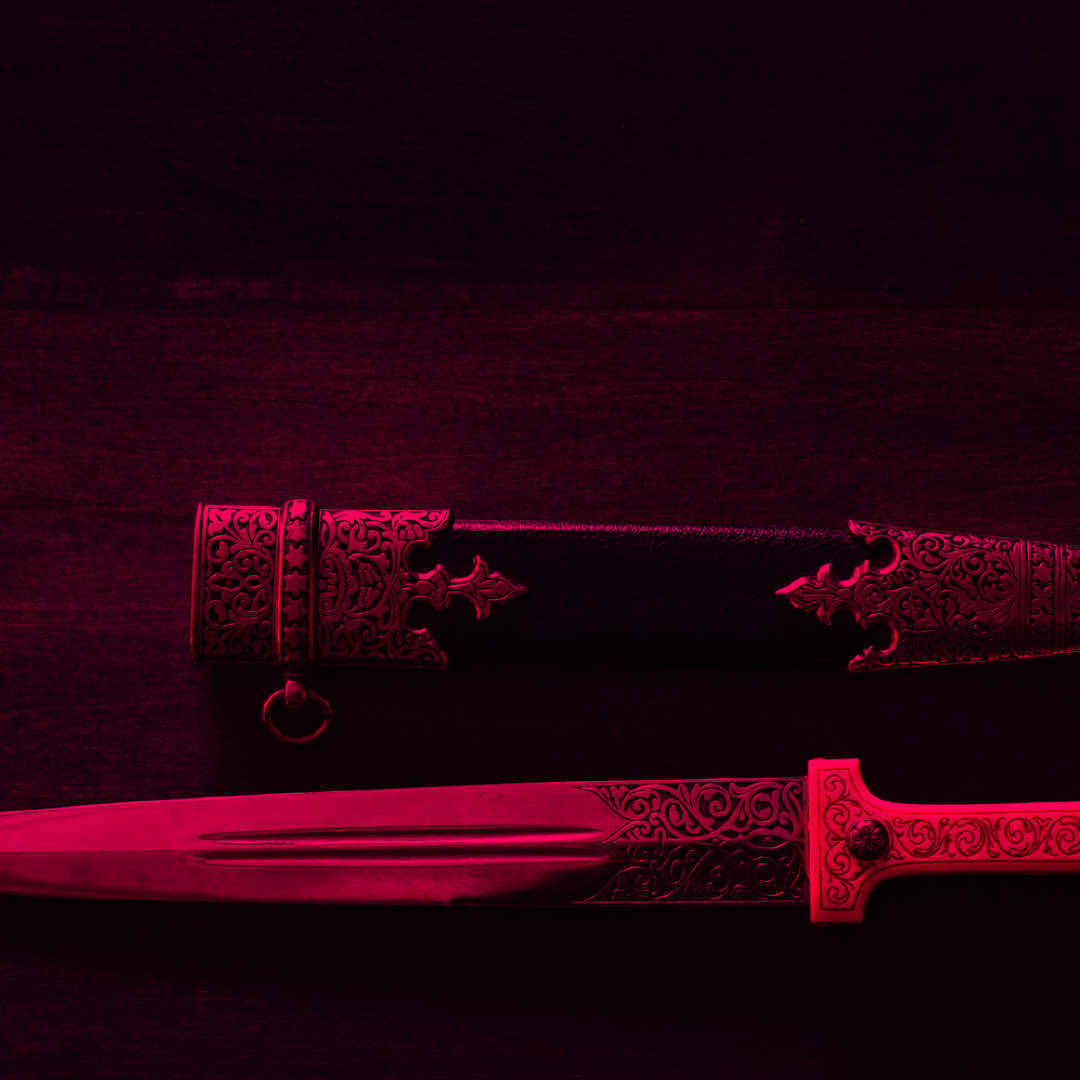
Ornate, handmade vintage dagger (not the one mentioned in the story). Source: Burst.
By 1900, when Mírzá Áqá Ján died, the Covenant-breakers had disrupted the local Bahá'í community’s life. They had occupied the Mansion of Bahjí, which would not return to the Faith for almost 30 years.
They spread blatant lies about the Shrine of the Báb, which 'Abdu'l-Bahá was building in Haifa, lying to the Ottoman Authorities that he was raising an army and preparing to attack.
They attempted to kill 'Abdu'l-Bahá on two separate occasions—once by poisoning a jug of water, and once with a dagger.
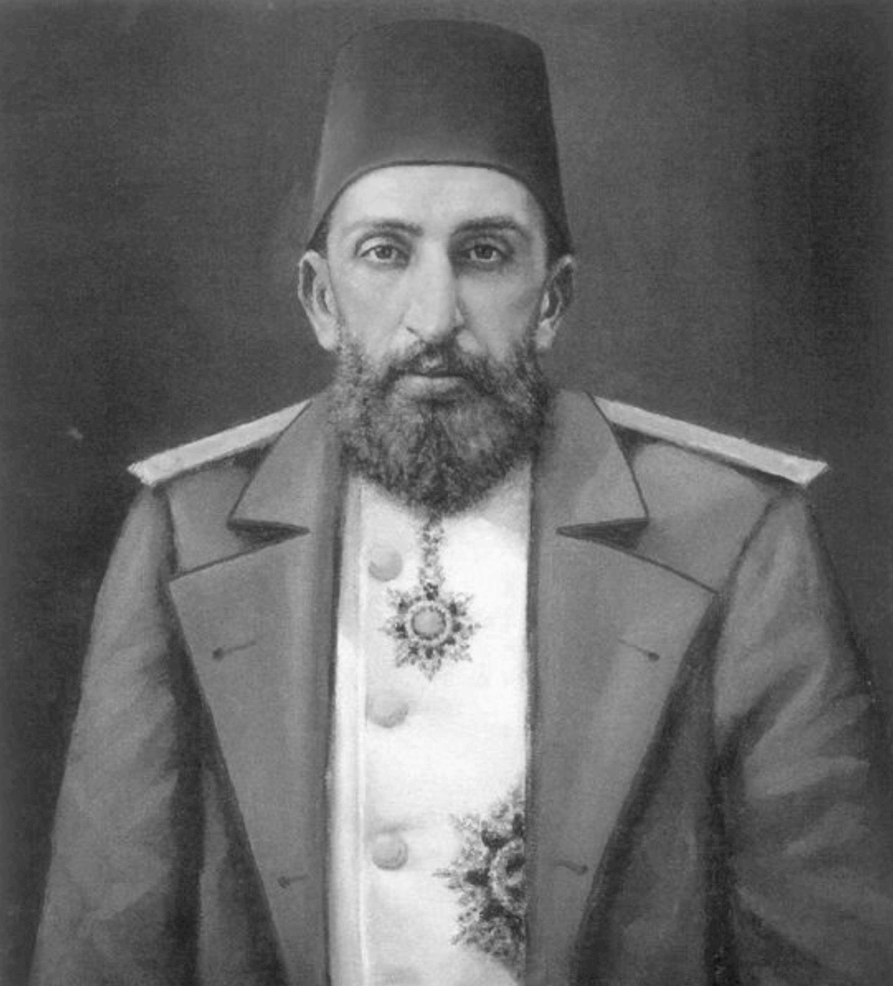
Sulṭán ‘Abdu’l-Hamid II of the Ottoman Empire, an enemy of 'Abdu'l-Bahá who sent two commissions of inquiry to investigate Him in 1904 and 1905. Source: Wikimedia Commons.
In 1904, fresh adversities poured out onto 'Abdu'l-Bahá. The Covenant-breakers had plotted, schemed, and planned until a hostile Governor replaced the Governor who was friendly to 'Abdu'l-Bahá, and when he arrived, they roused the elements of the population of 'Akká who were opposed to the Master.
The Covenant-breakers succeeded through lies and manipulation in getting 'Abdu'l-Bahá indicted, and they bribed influential 'Akká residents to sign it. They sent the indictment to Sulṭán ‘Abdu’l-Hamid II, and when he read the document, he panicked and sent a Commission of Inquiry. Spies were stationed to watch 'Abdu'l-Bahá 24 hours a day and 7 days a week. Things were so dangerous that 'Abdu'l-Bahá sent Bahá'ís out of 'Akká for a time.
In 1905, the Ottoman Sulṭán’s Commission of Inquiry arrived in 'Akká and assumed control of the city, even disregarding the orders from the Governor of the Syria who governed 'Akká. With the assistance of the Covenant-breakers, they pressured people to testify against 'Abdu'l-Bahá.
They visited the Shrine of the Báb—which they falsely confirmed in their report was a fortress—interrogated 'Abdu'l-Bahá three times, and planned to exile Him in Fizan, Libya, in the middle of the Sahara Desert. In the end, the Commission was urgently recalled to Istanbul after an attempt on the life of the Sulṭán.
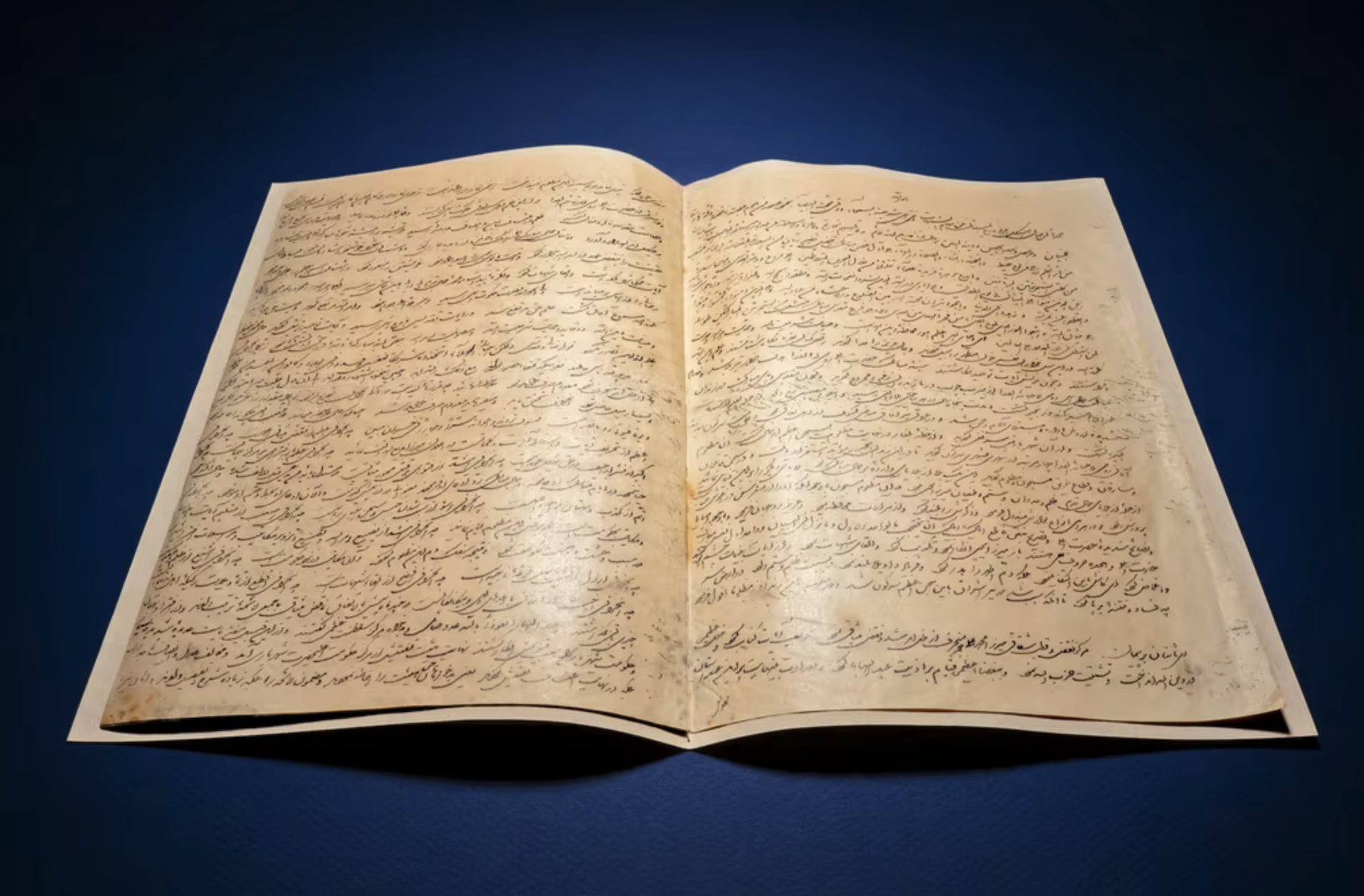
Photograph of the opening pages of the Will and Testament of 'Abdu'l-Bahá. Source: Bahá'í World News Service, 24 December 2021.
During this time of great danger, in 1906 and in 1908, when 'Abdu'l-Bahá was surrounded by plots, enemies, and real threats against His life, He did not think He would survive, and revealed His Will and Testament—naming Shoghi Effendi as Guardian of the Cause and His Successor—in two parts, in 1906 and 1908. Please refer to the extensive notes in references for these dates.
Shoghi Effendi was 9 and 11 years old.
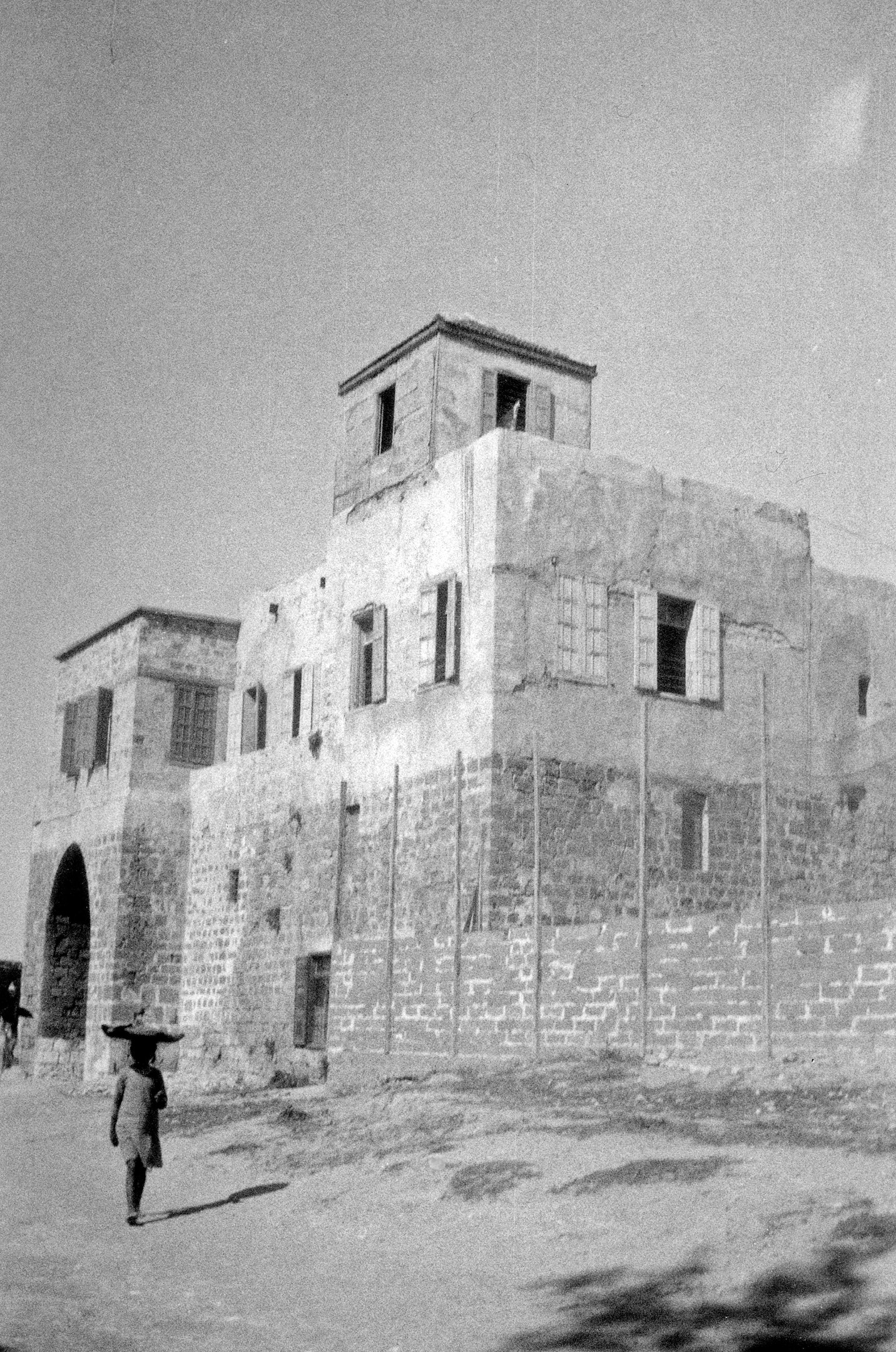
A spartan childhood for Shoghi Effendi in the house of 'Abdu'l-Bahá, seen here in the 1920s. Source: Bahá'í Media Bank, © Bahá'í International Community 2023.
Shoghi Effendi was born in a family that was imprisoned in 'Akká by the Ottoman Empire. He was a prisoner in his childhood, and with that, came a Spartan life, imposed by the limitations upon 'Abdu'l-Bahá and His family by their enemies in the Ottoman government.
The relentless life of imprisonment, and their constant attacks on his beloved Grandfather would affect the character of Shoghi Effendi for life. He became used to deprivations in his childhood, and, later, in his adult life, this would continue to manifest itself by his rigorous, self-imposed self-discipline.
Forever after his childhood, Shoghi Effendi would never indulge in non-essentials, and he would possess a capacity for financial stringency and economy that set him apart from others, all the while showering immense generosity on others.
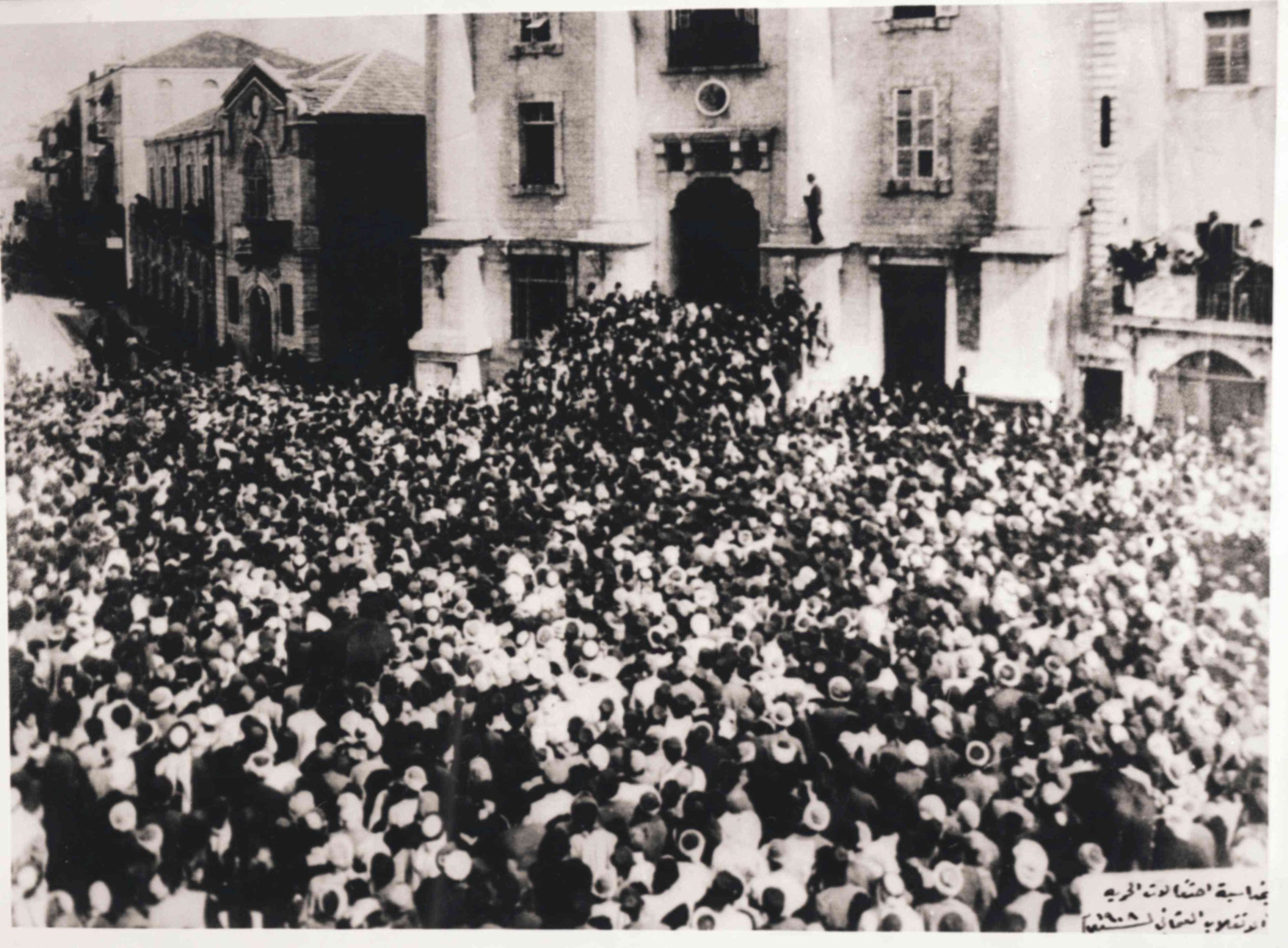
A large Palestinian crowd gathers outside Jaffa 's Grand Serai, housing local government offices, to celebrate the revolution in Constantinople popularly known by the Arabs as al-Hurriyyah (Arabic for "liberty") and declared by the "Young Turks " against the despotic rule of Sulṭán Abdu'l-Hamid II . The revolution called for the restoration of the Constitution of 1876 and elections for a new Parliament. Both Arabs and Turks participated in the "Young Turks" movement but, as World War I approached, tensions between the two peoples mounted. Source: Interactive Encylopedia of the Palestine Question.
Added to the sufferings endured by the family of the Master because of His enemies within the Faith, Shoghi Effendi had a difficult childhood in a material sense as well.
In his childhood and youth, Shoghi Effendi witnessed the end of an era in Ottoman-ruled Palestine, which had been overrun by tyranny, had been plagued by a deeply corrupt government, had been the victim of serious epidemics and had been subjected to utter poverty.
In a conversation with Ugo Giachery a half-century later, Shoghi Effendi would recall to him the difficulties of growing up in the last years of the Ottoman Empire:
There were no opportunities available in those years because the collapse of the military, cultural and political structure of the Ottoman Empire was at hand, and the signs of the imminent disintegration of the last vestige of an ancient glory were evident even to my young eyes.
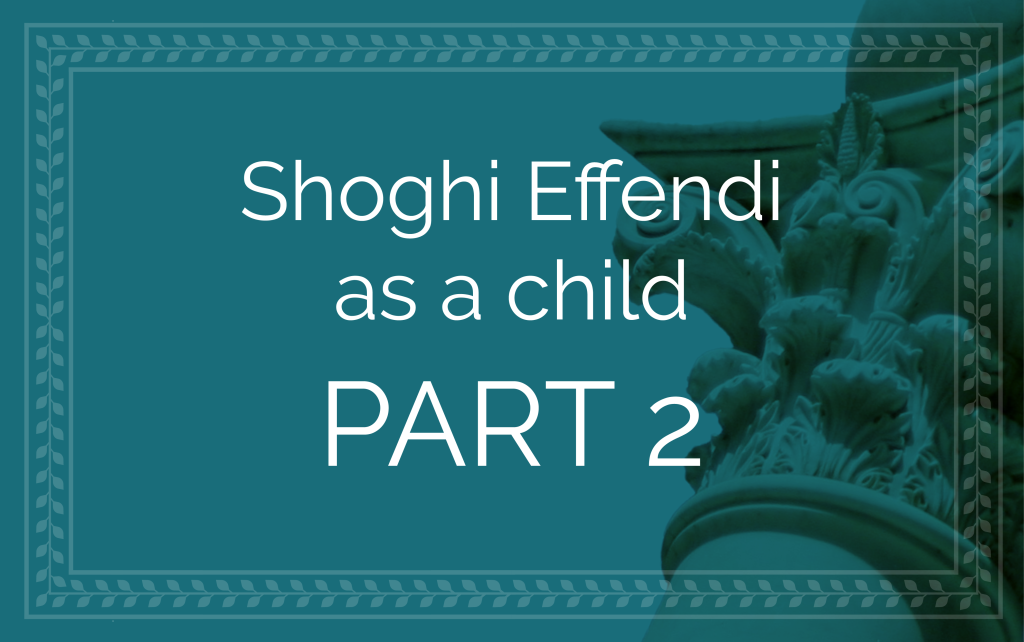
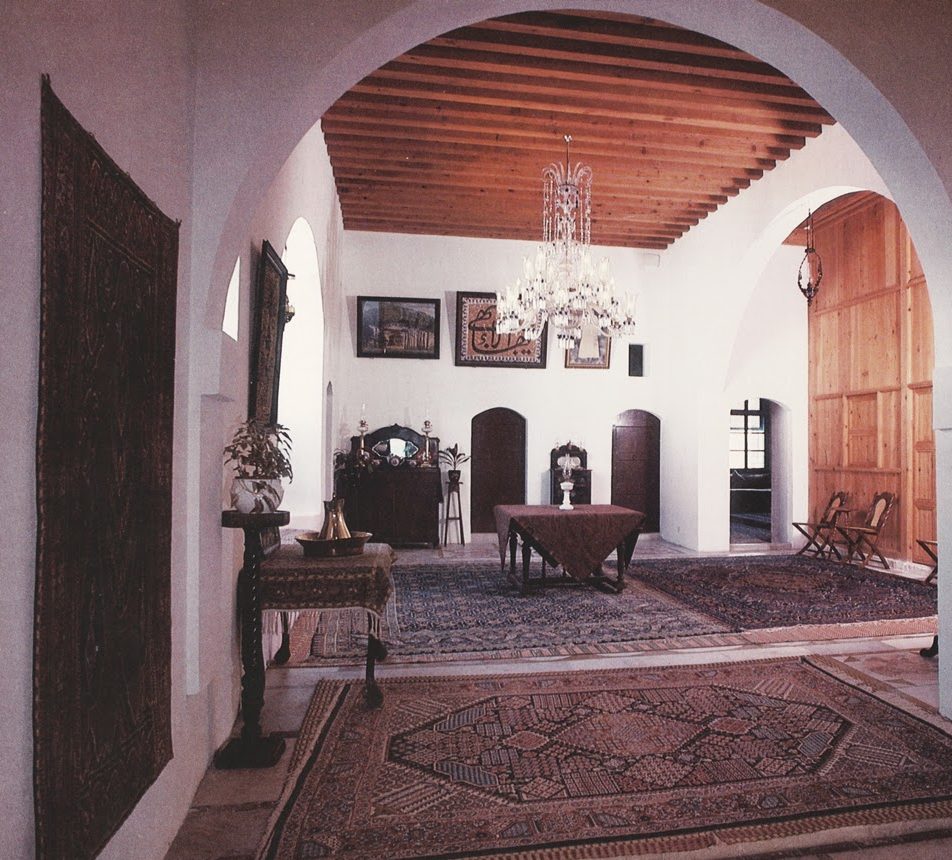
Main hall in the House of 'Abdu'lláh Pashá in 'Akká. Source: Bahá'í Points of Interest.
When lunchtime arrived, all the Bahá'í pilgrims and many resident believers would gather at the House of 'Abdu'lláh Pashá to eat and to hear 'Abdu'l-Bahá speak.
A pitcher of warm water was placed on the table so that the guests could wash their hands with soap. 'Abdu'l-Bahá poured the water on their hands, and Shoghi Effendi stood next to his Grandfather, handing each guest a fresh, clean towel. Some of the Bahá'ís were clever and washed both their hands and face.
After everyone was seated at the table, 'Abdu'l-Bahá served them food, looked after all their needs. One day, when Dr. Habíb Múa’yyad was present, 'Abdu'l-Bahá told the friends:
The believers must be servants to the world of humanity. They must be kind to one another, nay sacrifice themselves for others. They must not just love their friends but should also be kind to their enemies and indeed count them as friends. Since these people have not drunk from the chalice of divine love, they know not [such sentiments]. But since you have been raised under the shadow of the bounties of the Ancient Beauty, you must befriend all the peoples of the world. You must be a true servant to each member of humanity, not just by your words, but, verily, by your conduct and from the depth of your soul, heart and belief. You should do so not because people may recognize your good deeds, but because the Blessed Beauty has wished it and it meets His good-pleasure.
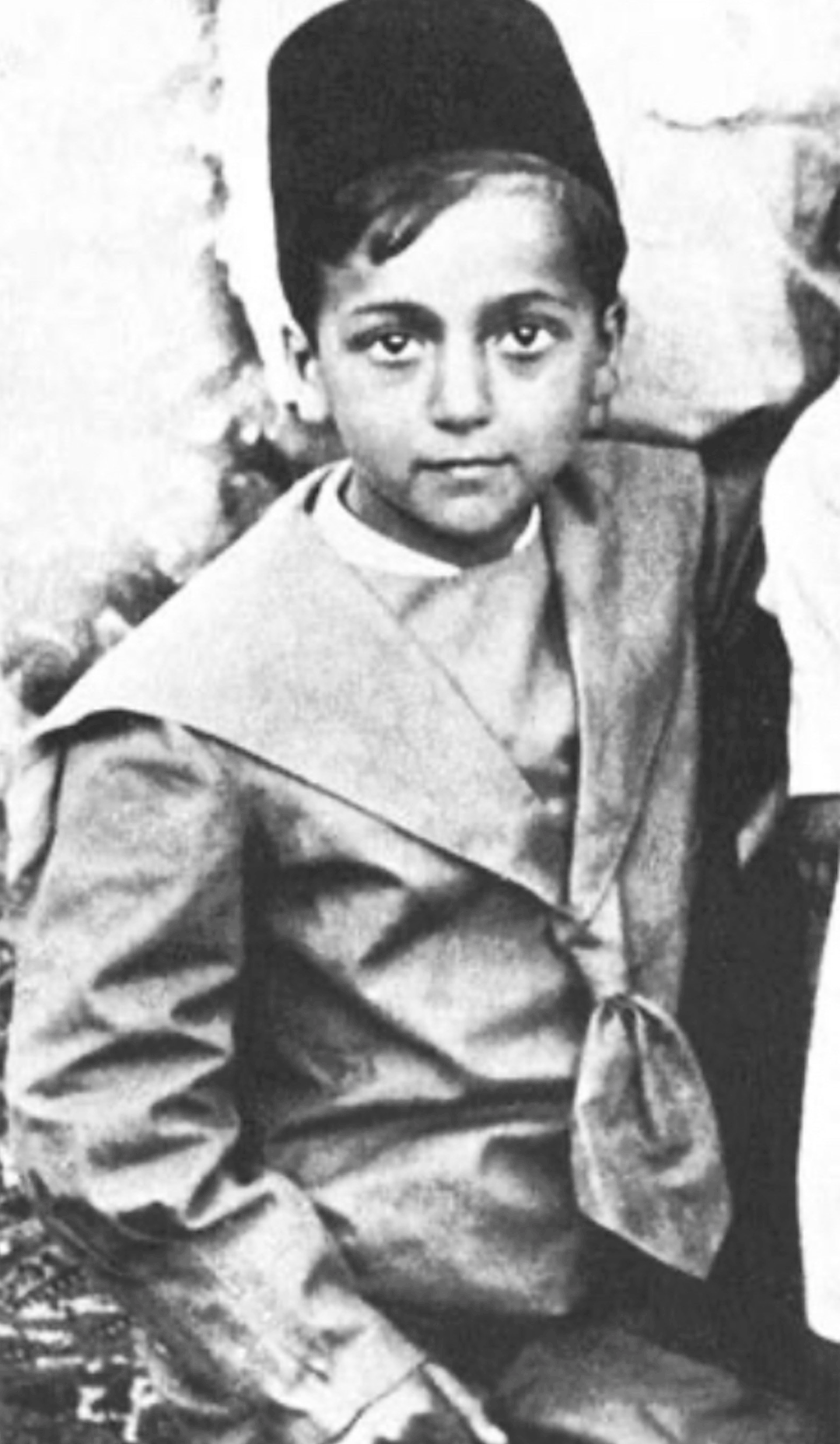
Shoghi Effendi as a child. Source: The Priceless Pearl, between pages 40 and 41.
While Shoghi Effendi was still a baby, 'Abdu'l-Bahá called one of the Muslims who chanted in the mosque to come, once a week, and chant the sublime verses of the Qur’án in his melodious voice to Shoghi Effendi.
As a young child, Shoghi Effendi memorized and chanted Tablets revealed by 'Abdu'l-Bahá after Bahá'u'lláh’s Ascension with tears streaming down his face.
One day, a western pilgrim asked 'Abdu'l-Bahá to reveal a prayer for children, and the first one to memorize the prayer was Shoghi Effendi who could chant it in meetings.
Many of the members of the Holy Family, including 'Abdu'l-Bahá and Shoghi Effendi’s mother Ḍíyá‘íyyih Khánum, had very beautiful voices when chanting prayers, and this aspect of family culture deeply affected Shoghi Effendi, who would chant prayers until the end of his life.
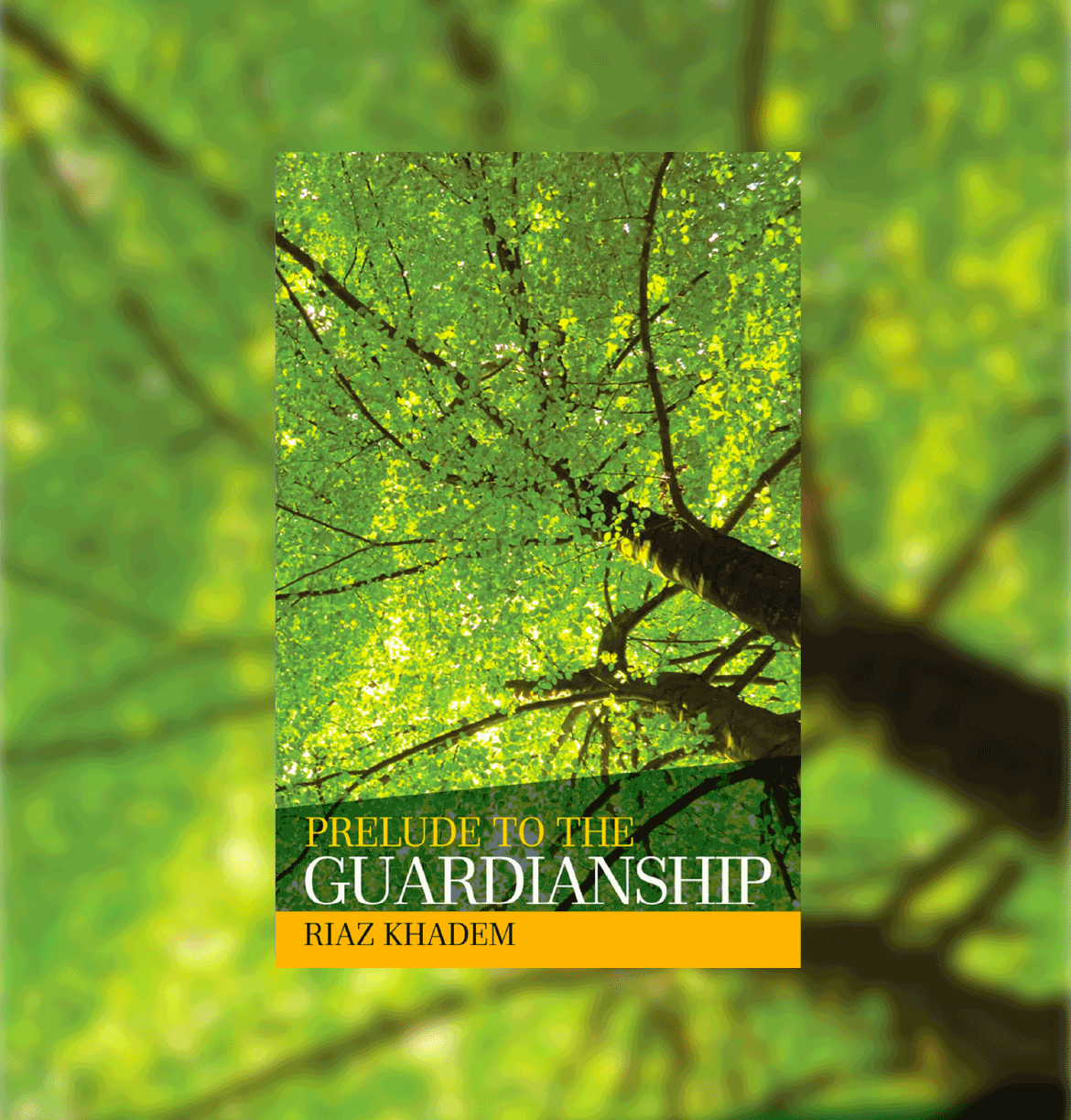
There is no specialist alive today more knowledgeable about Shoghi Effendi’s early years than Riaz Khadem. His pioneering historical research should be introduced before the first story that draws on his work.
For almost three decades, starting with his first book, Shoghi Effendi in Oxford, published in 1999, then with his masterpiece, Prelude to the Guardianship, published 15 years later in 2014, Riaz Khadem has opened the Bahá'í world’s eyes to the most important formative moments: his childhood, his schooling, his time with his beloved Grandfather 'Abdu'l-Bahá, his studies in Beirut, his travels to Egypt to meet the Master, his almost-journey to the United States, cut short by the evil Dr. Fareed, his time as 'Abdu'l-Bahá’s secretary in 1918-1920, his rest in Paris, France, his first few terms at Oxford before hearing of the tragic passing of 'Abdu'l-Bahá, and his early moments as Guardian.
Riaz Khadem’s peerless work of research into the archives of the American University of Beirut and Oxford University offer something exceedingly unique in Bahá'í history: a thorough, detailed, intricate view of the little known part of Shoghi Effendi’s life before he became the Guardian. This book is published by George Ronald.
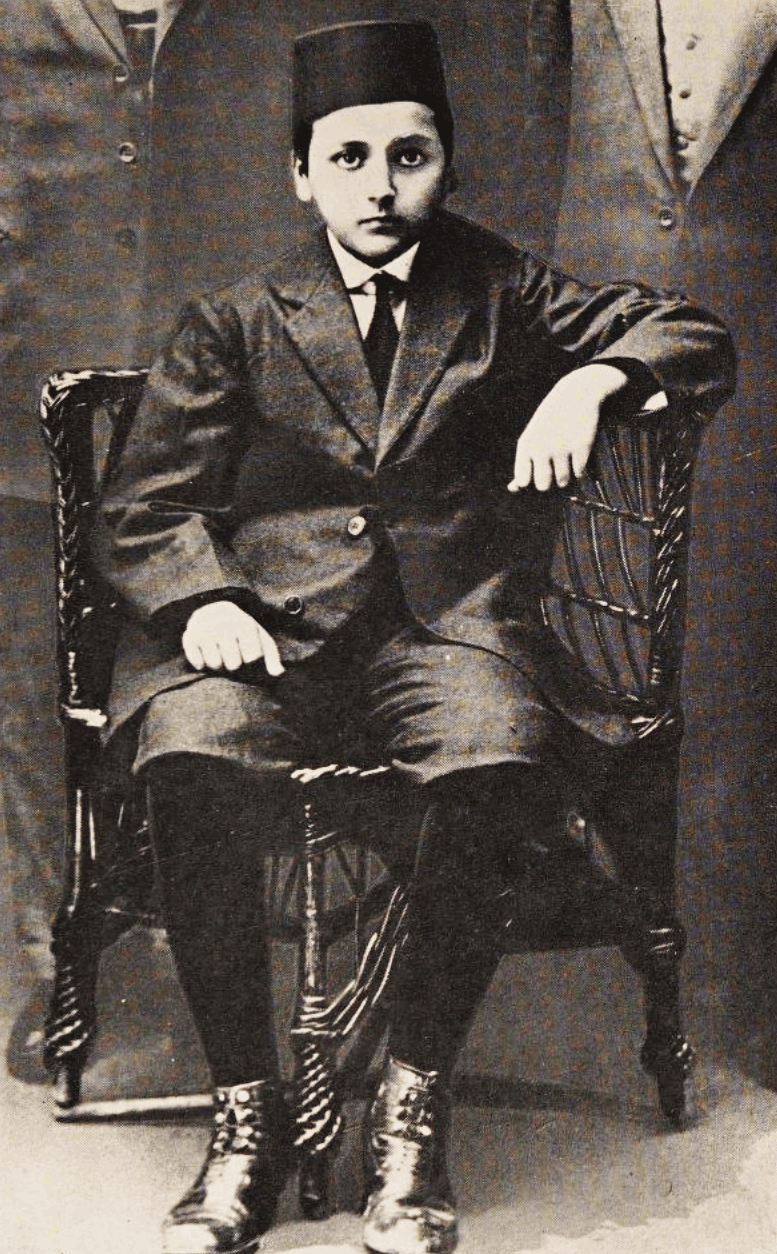
A young Shoghi Effendi. Source: The Priceless Pearl, between pages 56 and 57.
One day, when he was still a very small child, Shoghi Effendi entered 'Abdu'l-Bahá’s room, picked up His pen and tried to write. 'Abdu'l-Bahá gently drew Shoghi Effendi in, tapped him on the shoulder and told his serious little grandson, the future Guardian:
Now is not the time to write, now is the time to play, you will write a lot in the future.
Because Shoghi Effendi had such an insatiable desire to learn, 'Abdu'l-Bahá instituted classes in His home, some of which were taught by the veteran defender of the Cause, Ḥájí Mírzá Ḥaydar-‘Alí.
At one point in 'Akká, Shoghi Effendi and 'Abdu'l-Bahá’s other grandchildren were taught by an Italian governess.
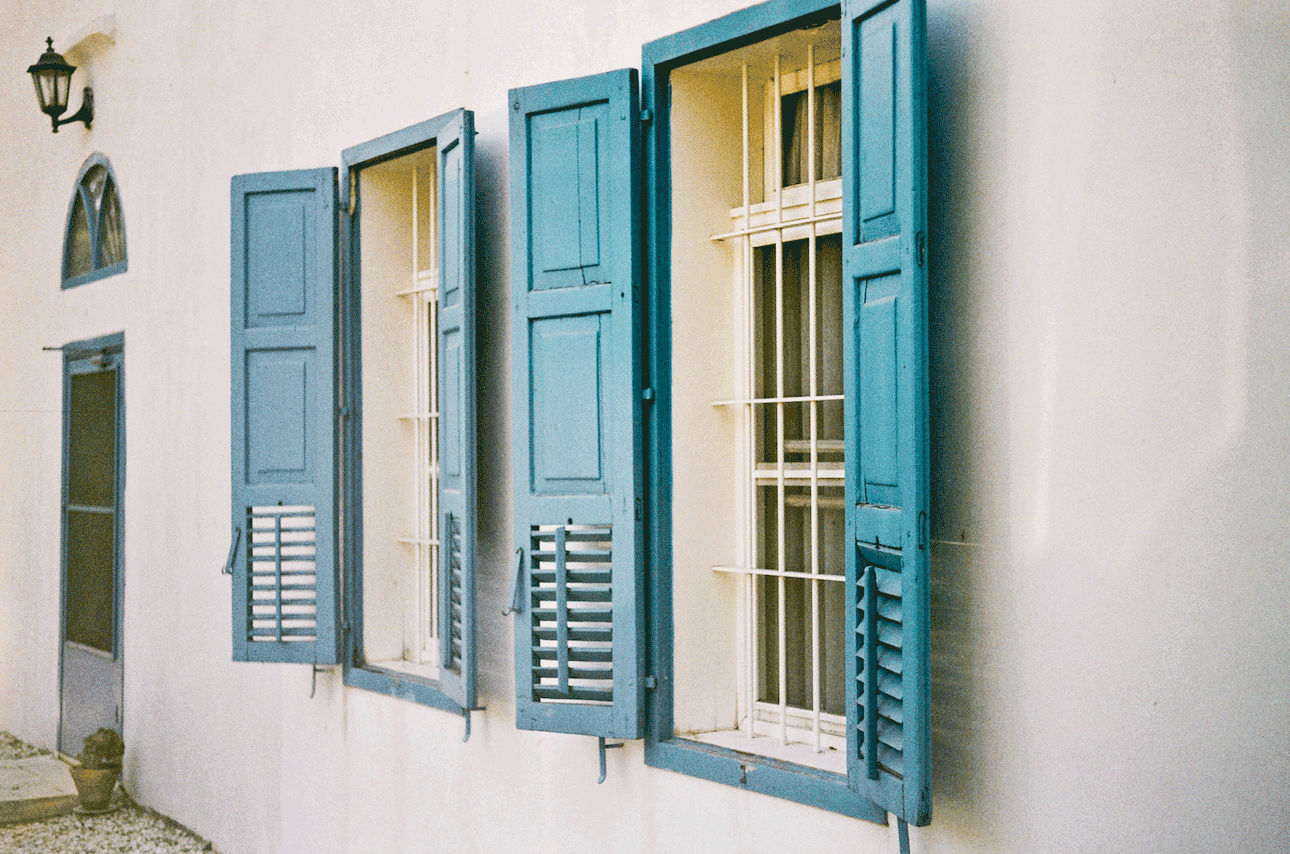
Open shutters at the Bahjí Pilgrim House where Shoghi Effendi sometimes stayed the night as a child. Source: Chad Mauger’s Flickr page, © Chad Mauger, used with permission.
Shoghi Effendi's early years were spent in the prison-city of 'Akká, enclosed by moats and walls, its two gates guarded by sentries. When His beloved Grandfather was re-incarcerated, tensions were high and danger was everywhere because of the incessant plottings of the Covenant-breakers.
But these restrictions did not mean that Shoghi Effendi could not move around. He had many occasions to visit the homes of resident Bahá'ís in 'Akká, visit the Khán-i-Avamíd where the pilgrims were housed, and enjoy the Garden of Riḍván, often the company of His beloved 'Abdu'l-Bahá. Shoghi Effendi also traveled to Beirut, the only large city in the region, with his family.
Shoghi Effendi sometimes slept in the pilgrim house at Bahjí (the Mansion was occupied by Covenant-breakers), and when he did, 'Abdu'l-Bahá would Himself come and tuck His grandchild in bed, saying:
I need him.
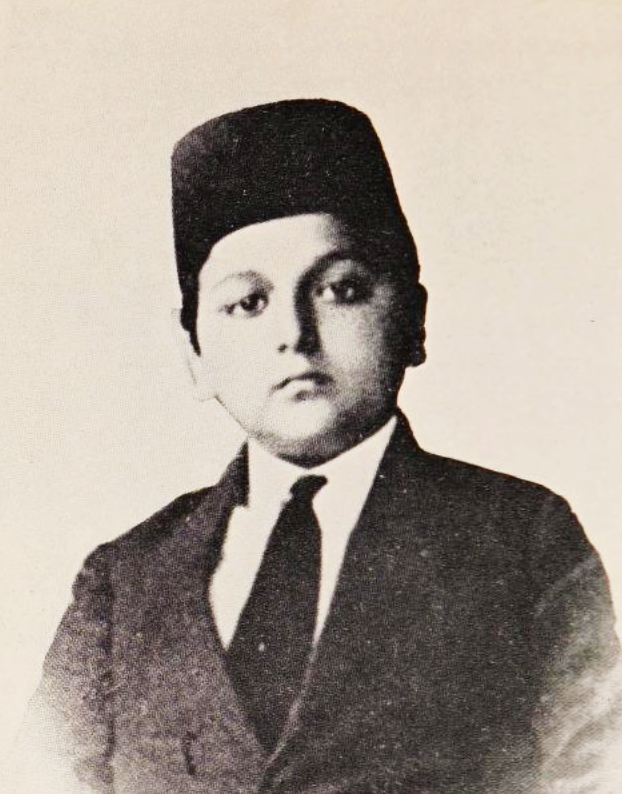
Shoghi Effendi as a young teenager. Source: The Priceless Pearl, between pages 40 and 41.
Although His grandchild’s name was Shoghi, ‘Abdu'l-Bahá invariably called him Shoghi Effendi and commanded everyone, including Shoghi Effendi's father, to add the title `Effendi' after his name, as a mark of respect. No one was to call him Shoghi.
The term “Effendi” means “Sir” and is added after a first name to mark respect. 'Abdu'l-Bahá was known throughout 'Akká and to all non-Bahá'ís as ‘Abbás Effendi, never 'Abdu'l-Bahá, which was a term only used to address Him by Bahá'ís.
One day, Shoghi Effendi asked ‘Abdu'l-Bahá to give him a name of his own.
Until then, he was Afnán, like all his cousins, and sometimes would get confused with them, so he wanted a name all his own.
'Abdu'l-Bahá gave Shoghi Effendi the name “Rabbání”, meaning “divine,” a name that was later adopted by his brothers and sisters.
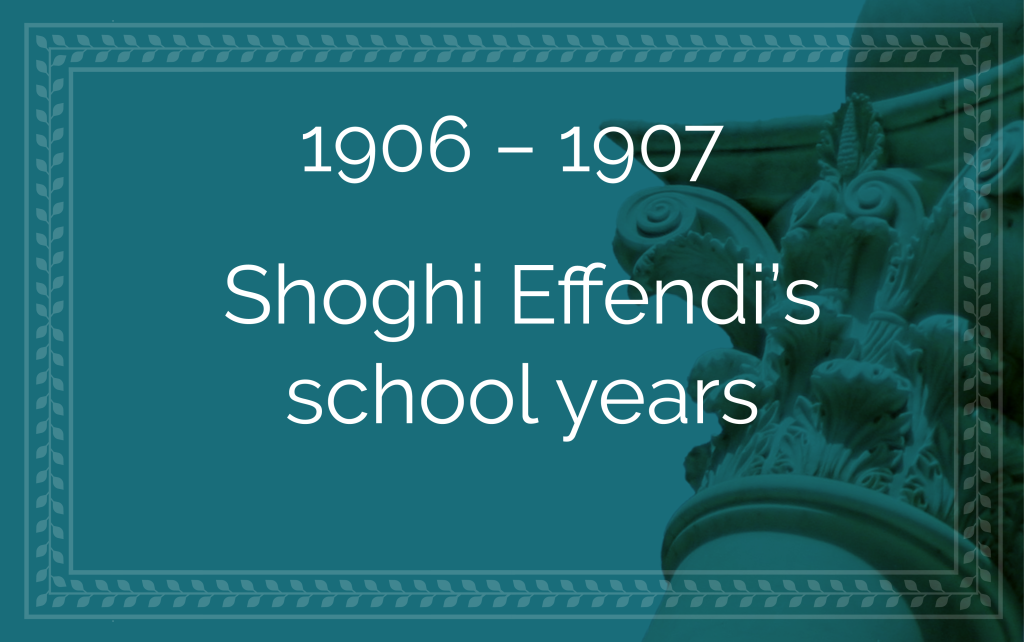
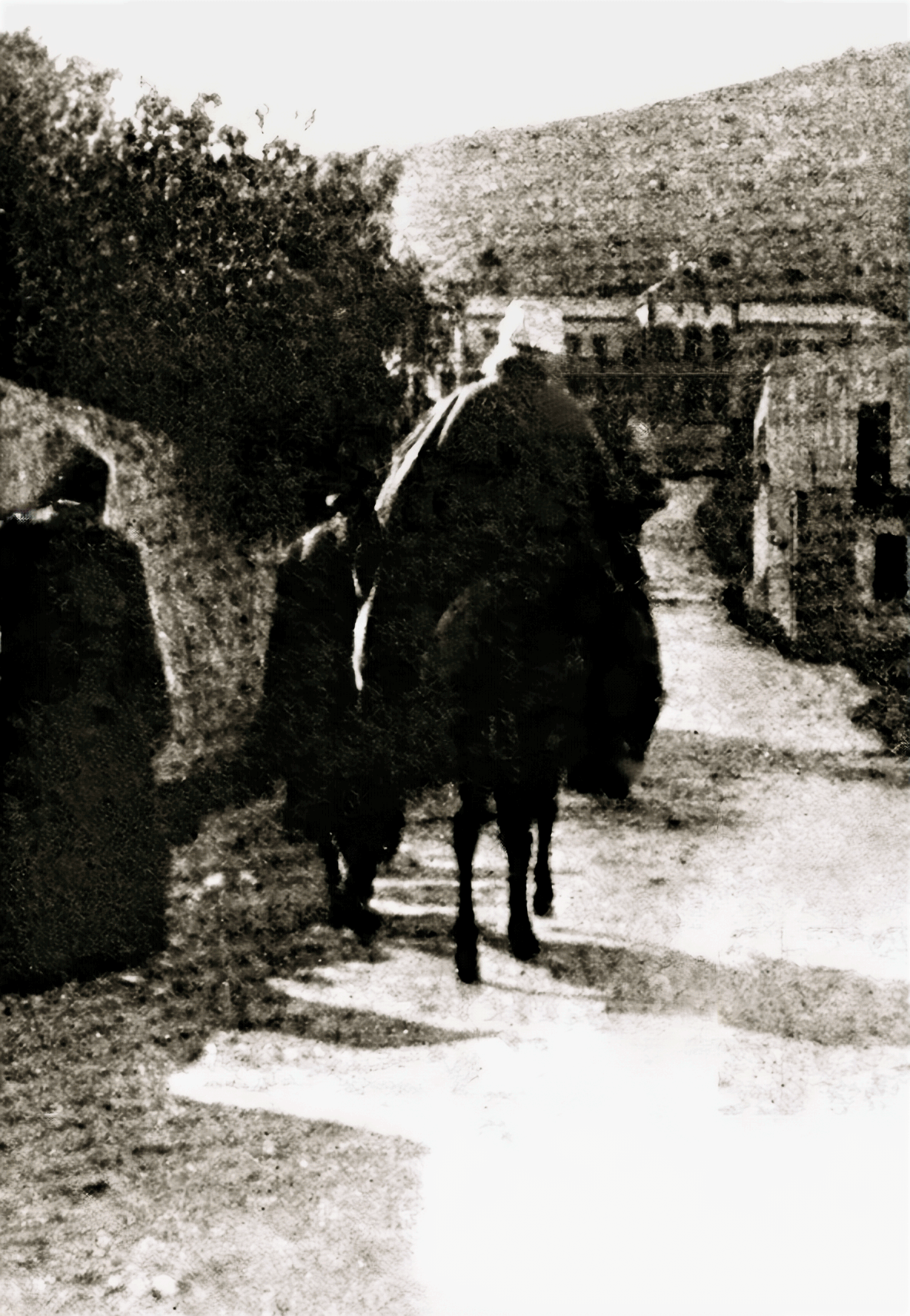
For a story of Shoghi Effendi on a donkey coming down Mount Carmel, as no photos were found, here is a photo of Shoghi Effendi’s beloved Grandfather 'Abdu'l-Bahá on a donkey going up Mount Carmel. Source: 'Abdu'l-Bahá in the Holy Land.
During the hot summers, Shoghi Effendi and his family would sometimes stay in a summer home higher up on Mount Carmel. Some time around 9 July 1906, after they had been on pilgrimage for 33 days, Florence and Ali Quli Khán were preparing to leave Haifa and had just visited the Shrine of the Báb for the last time.
As they were making their way down Mount Carmel, suddenly, out of the shadows, nine-year-old Shoghi Effendi appeared, riding a donkey.
He had managed to convince his tutor to let him ride down the mountain from their summer home and meet the Khan’s carriage so that he could say one last goodbye to them.
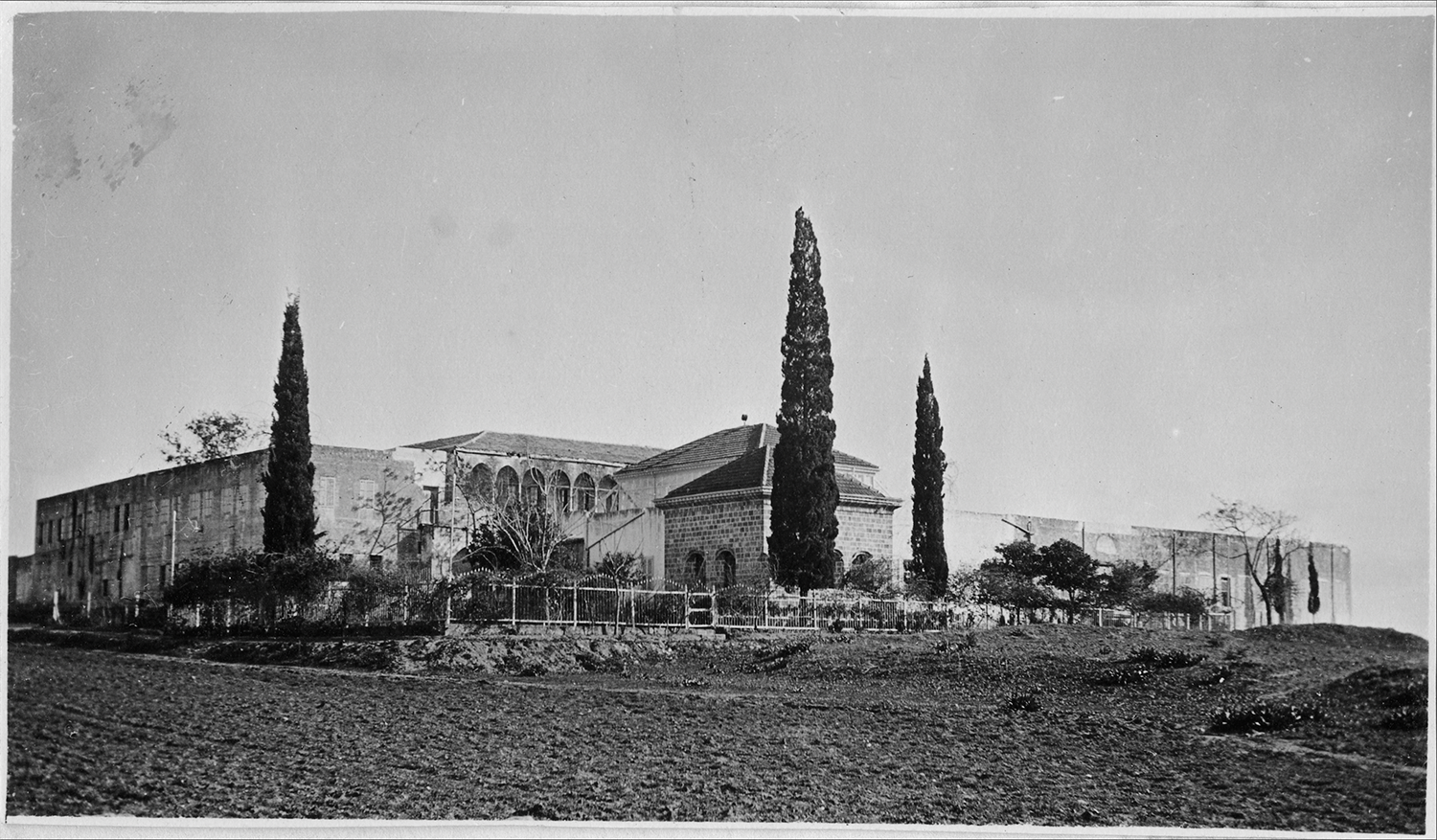
The Shrine of Bahá'u'lláh in the late 1890s. © United States National Bahá'í Archives, used with permission.
Jane Whyte, a Scottish Christian, had come on pilgrimage in March 1906 with Mrs. Thornburgh-Cropper, the first British Bahá'í. She had been convinced to accept the invitation, even though she wasn’t a Bahá'í, when her friend, Edward Granville Browne, told her:
Certainly, do not refuse so great an opportunity.
Jane Whyte spent three days in 'Akká, and was deeply affected. She often wrote about her experience on pilgrimage afterwards, and meeting 'Abdu'l-Bahá.
But another thing she wrote about was a scene she never forgot.
One day, she saw a young boy, kneeling in adoration before the threshold of the Shrine of Bahá’u’lláh, and the thought crossing her mind:
What destiny lies before this boy?
The 9-year-old boy was Shoghi Effendi.
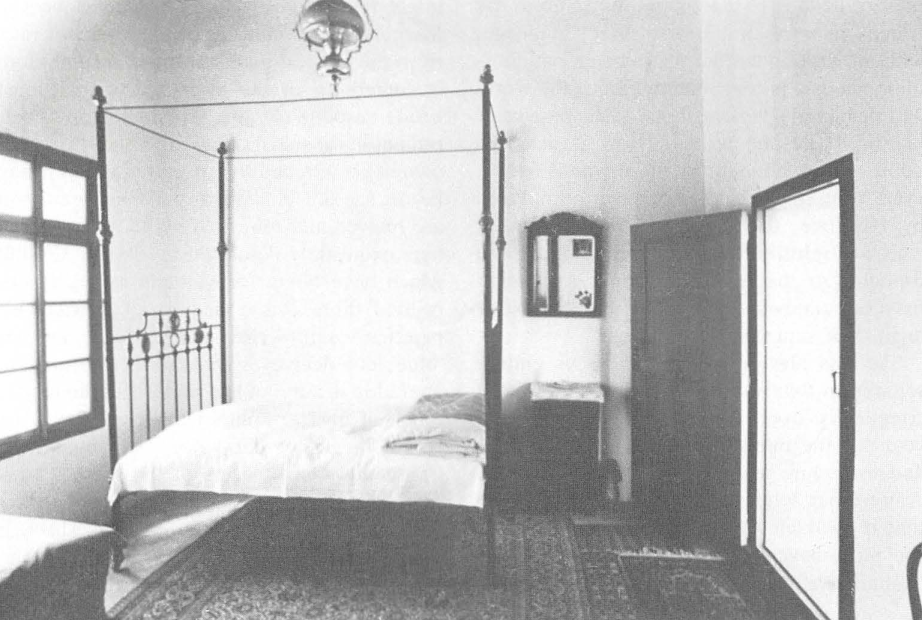
The room of 'Abdu'l-Bahá in the House of 'Abdu'lláh Pashá, in which Shoghi Effendi saw the Báb in his very significant dream. Source: Bahaimedia.
When Shoghi Effendi was nine or ten years old, living with his nurse in 'Abdu'l-Bahá’s house in Haifa and going to the French school, he had a deeply significant dream. In the dream, he and an Arab schoolmate were in 'Abdu'l-Bahá’s reception room in the house of 'Abdu'lláh Pashá in 'Akká. Then, the Báb entered the room, and a man with a gun appeared and shot at the Báb, then told Shoghi Effendi:
Now it is your turn.
The man began to chase Shoghi Effendi around the room to shoot him, and that was when Shoghi Effendi woke up. When he told his nurse about the dream, she told him to tell Mírzá Asadu’lláh, who would convey it to His Grandfather. When 'Abdu'l-Bahá heard about Shoghi Effendi’s dream, he revealed this Tablet for him:
He is God
Shoghi Mine
This dream is a very good one.
Rest assured that to have attained the presence of His Holiness the Exalted One, may my soul be a sacrifice to Him, is a proof of receiving the grace of God and obtaining His most great bounty and supreme favour.
The same is true of the rest of the dream.
It is my hope that you may manifest the outpourings of the Abhá Beauty and wax day by day in faith and knowledge. At night pray and supplicate and in the day do what is required of you.
'Abdu'l-Bahá
Shoghi Effendi had this dream around the time that 'Abdu'l-Bahá was revealing His Will and Testament in which He named His eldest grandson Guardian of the Cause.
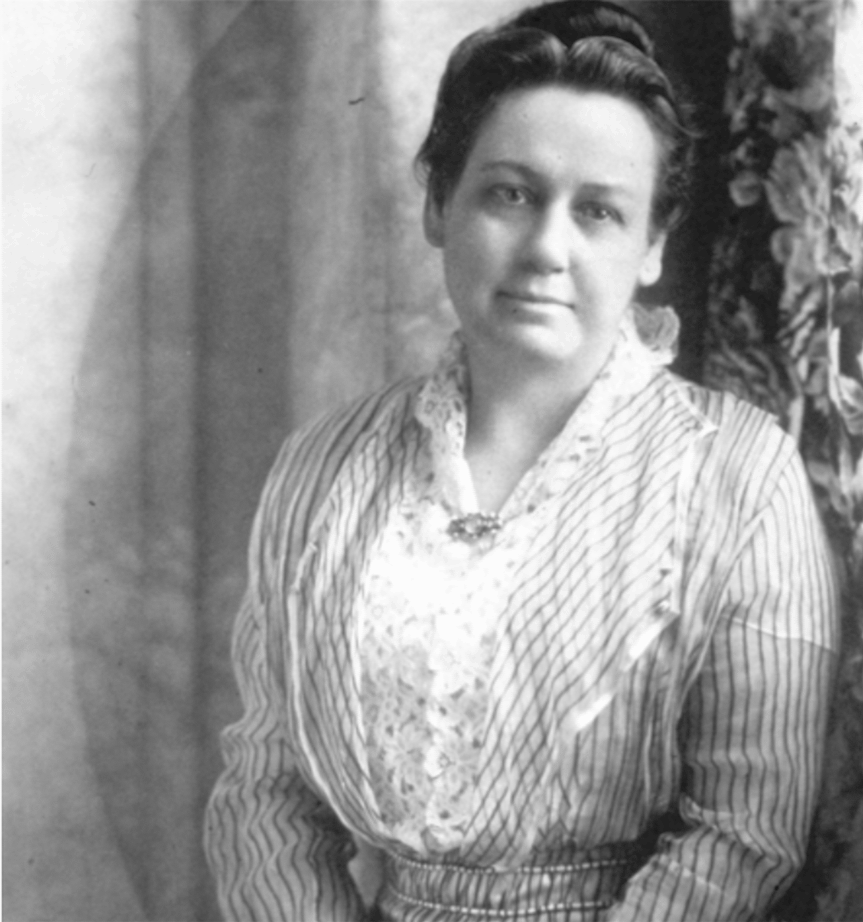
Corinne True, Arna’s mother. Source: The Journey West.
Corinne True came on pilgrimage for the first time in February 1907, and from that moment on, she dedicated her life and soul to 'Abdu'l-Bahá, who loved her very, very deeply. Corinne arrived on pilgrimage with her 16-year-old daughter Arna, who was not having a very good time. At lunch one, day—obviously sensing her unhappiness—'Abdu'l-Bahá asked Arna:
Are you happy?
Arna replied:
Yes, but not very.
Her mother Corinne cringed at Arna’s candor, but 'Abdu'l-Bahá knew just the remedy. He smiled and asked her if she would like to be with the other Persian children of the Holy Family. 'Abdu'l-Bahá’s solution was brilliant. It didn’t matter that the children didn’t speak English and that Arna didn’t understand Persian, her love for them was all the communication she needed.
One day, Arna gathered all the children, including 10-year-old Shoghi Effendi who had come to 'Akká for the weekend from his school in Haifa, and Arna taught them all the American games she could think of.
One afternoon, the Master entered the courtyard and stopped to watch Arna teaching the children how to jump rope. 'Abdu'l-Bahá was impressed, and then…'Abdu'l-Bahá took a turn with the jump rope!
Later that year, Shoghi Effendi wrote a letter to Arna—who was now back in the United States—thanking her for the writing paper she and her mother had given him.
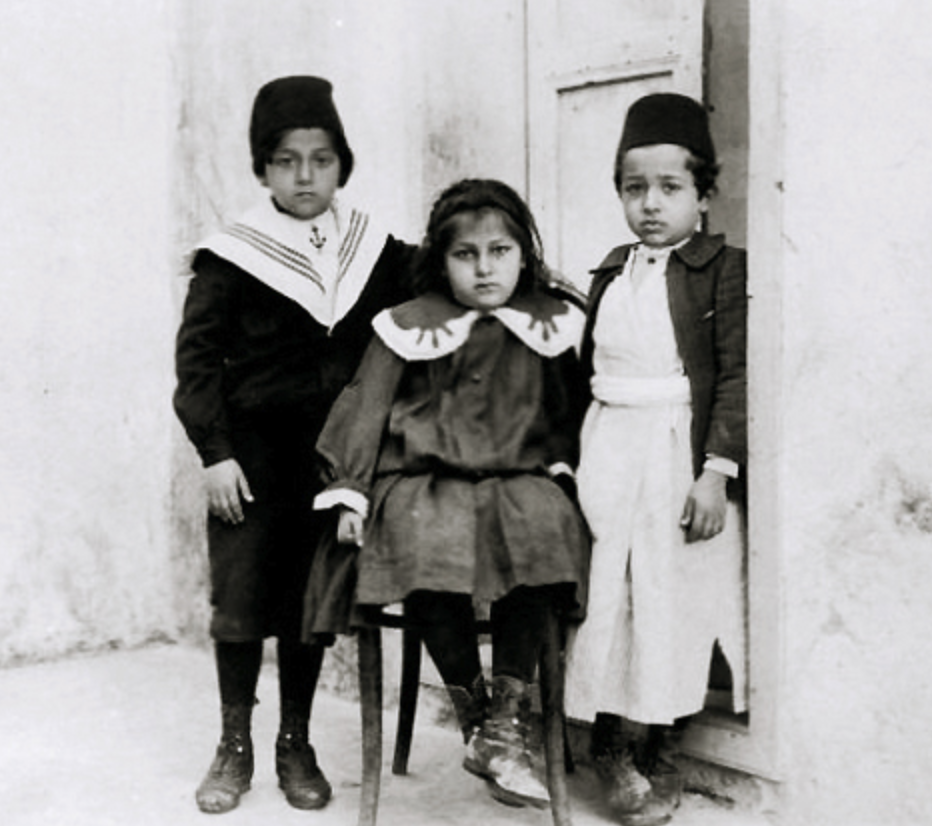
Shoghi Effendi wearing his sailor collar, with his sister Rúhangiz and his cousin Rúhí Afnán, both of whom, unfortunately, later broke the Covenant. Source: Bahaipedia.
Thornton Chase, the first American Bahá'í, arrived on pilgrimage in 'Akká on 8 April 1907 and took a photograph of Shoghi Effendi, then 10 years old, wearing what was his usual outfit in those days: shorts and long dark stockings, a fez on his head, a jacket, and a huge sailor's collar covering his shoulders.
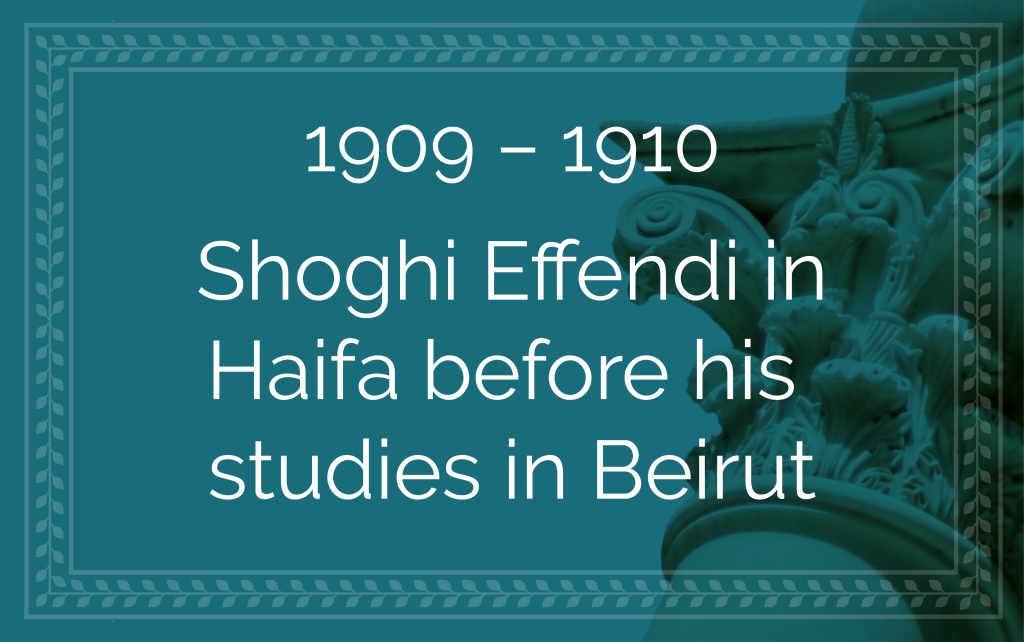
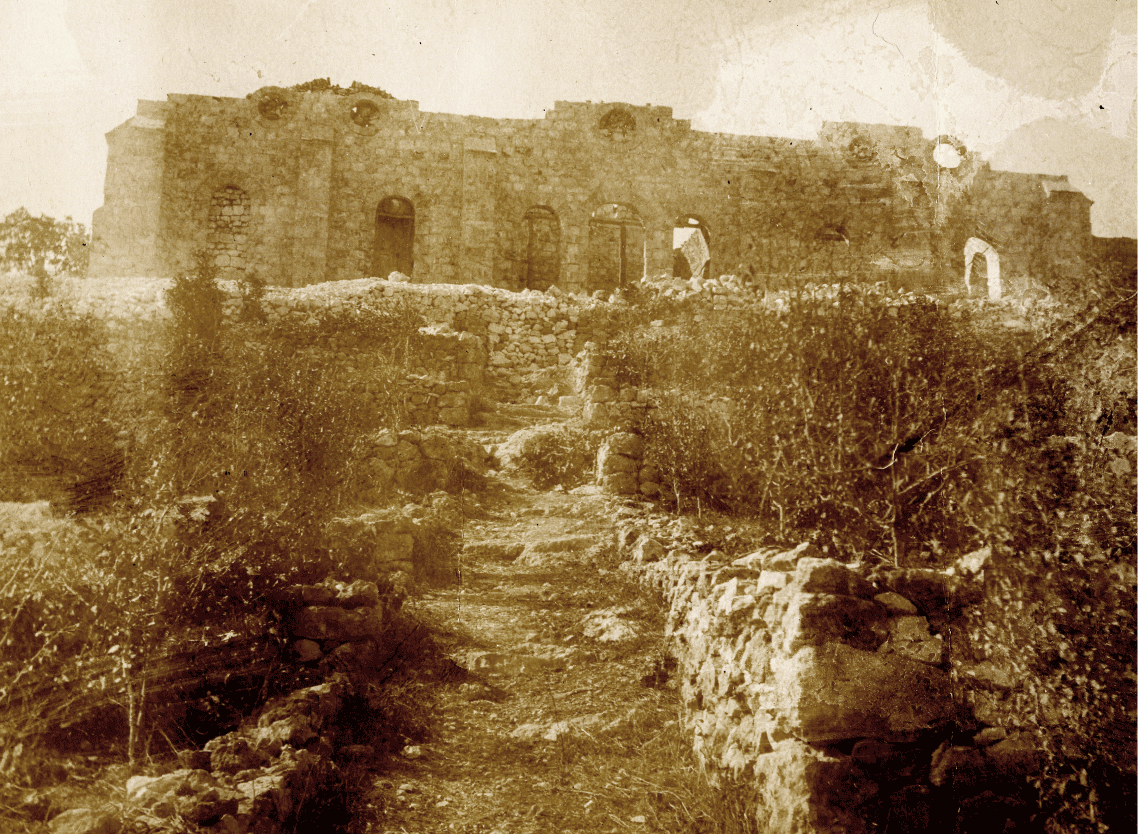
The Shrine of the Báb under construction at the time of 'Abdu'l-Bahá, some time between 1900 and 1909. © United States National Bahá'í Archives, used with permission.
The dominating project in his adored Grandfather’s life from the time Shoghi Effendi was born until he was 12 years old was the erection of the Shrine of the Báb in order to lay the remains of the Báb to rest, a project which spanned the years 1899 to 1909.
In 1897—the year Shoghi Effendi was born—'Abdu'l-Bahá ordered an engraved one-piece marble sarcophagus and a coffin made of the finest Burmese wood from the Bahá'í community of Burma.
The remains of the Báb arrived in the Holy Land in 1899, after a deeply adventurous journey, and for one year, they were hidden in the room of the Greatest Holy Leaf in the House of 'Abdu'lláh Pashá in 'Akká. After that year, the casket stayed in one house in Haifa for 9 years, until 'Abdu'l-Bahá laid the remains of the Báb to rest on Mount Carmel.
'Abdu'l-Bahá purchased the land on Mount Carmel in 1899 and laid the foundation stone shortly thereafter. From 1899 to 1908, 'Abdu'l-Bahá supervised the construction process from 'Akká, where He was still a prisoner, throughout all the crises that surrounded him, such as the Commission of Inquiry.
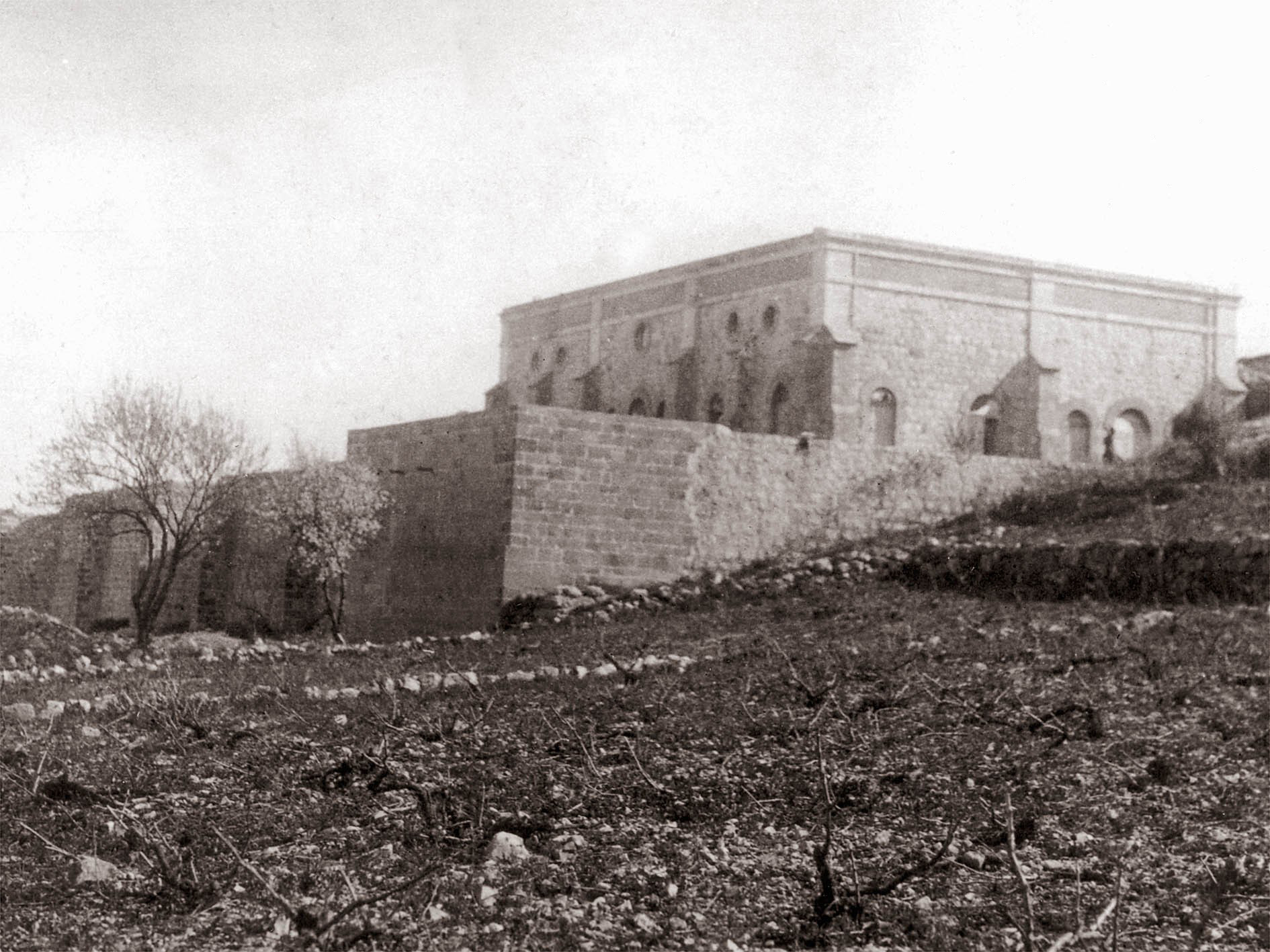
The Shrine of the Báb as it was on 21 March 1909 when 'Abdu'l-Bahá finally interred the remains of the Báb after 59 years of displacement. Source: Bahá'í World News Service.
On 21 March 1909, when he was 12 years old, Shoghi Effendi witnessed 'Abdu'l-Bahá accomplishing one of the three objectives he had set Himself for His ministry: to inter the Báb’s remains on Mount Carmel, in the Shrine He had built, at the instructions of Bahá'u'lláh, who had indicated to Him the precise location in June 1891, 18 years prior.
Before leaving 'Akká for Haifa, 'Abdu'l-Bahá gave instructions to the Bahá'ís to bring the heavy marble sarcophagus to Mount Carmel. This gorgeous sarcophagus, inscribed in gold letters with verses calligraphed by Mishkín-Qalam, had been constructed in Burma in 1897 at 'Abdu'l-Bahá’s request, and had arrived in Haifa ten years earlier in 1899.
By the light of a single lamp, 'Abdu'l-Bahá removed His turban, His shoes, and His dark outer cloak. Bareheaded and barefoot, in simple white garments, 'Abdu'l-Bahá descended into the vault and placed the wooden casket containing the sacred remains of the Báb and His companion into the marble sarcophagus. Then, He bent low over the casket and wept with such intensity that everyone present cried with Him. The ebony lid of the coffin was secured, and the marble lid of the sarcophagus closed forever. 'Abdu'l-Bahá chanted the prayer for the dead. Overcome with emotion, 'Abdu'l-Bahá could not sleep that night.
Soon after, ‘Abdu’l-Bahá wrote to the Bahá’ís of the world:
The most joyful tidings is this, that the holy, the luminous body of the Báb... after having for sixty years been transferred from place to place, by reason of the ascendancy of the enemy, and from fear of the malevolent, and having known neither rest nor tranquility, has, through the mercy of the Abhá Beauty, been ceremoniously deposited, on the day of Naw-Rúz, within the sacred casket, in the exalted Shrine on Mt. Carmel...
Shoghi Effendi would later describe this event “one of the outstanding events in the first Bahá’í century.”
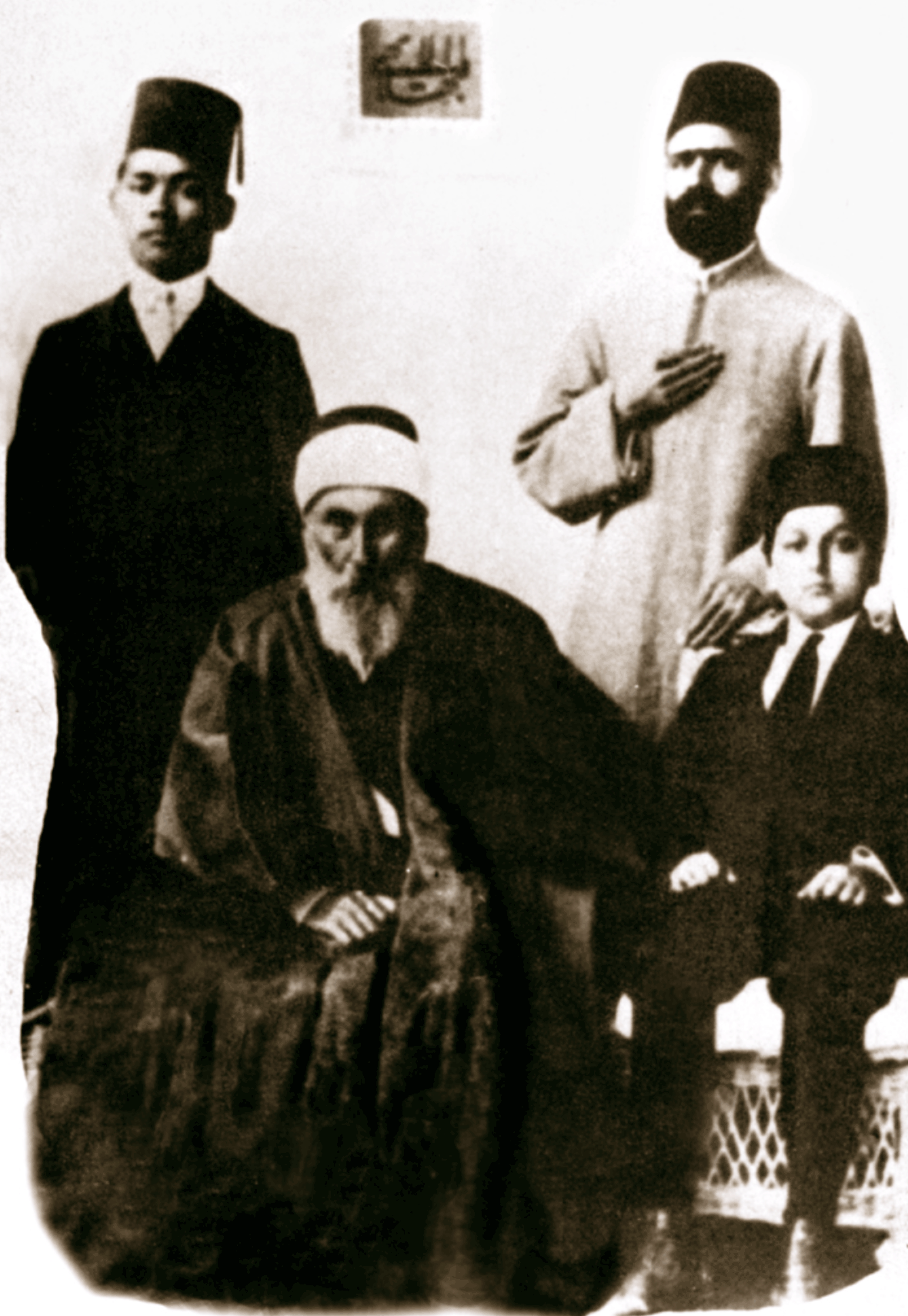
Shoghi Effendi seated to the right of an elderly Ḥájí Mírzá Ḥaydar-‘Alí—whom 'Abdu'l-Bahá titled ““The Angel of Carmel” and who, along with Dr. Youness Khan Afroukhteh perceived Shoghi Effendi’s greatness in his early childhood. Standing behind Ḥájí Mírzá Ḥaydar-‘Alí are Áqá Khusráw, 'Abdu'l-Bahá’s gardener and servant, and Mírzá Maḥmúd-i-Zarqání, 'Abdu'l-Bahá’s secretary. Source: Worldwide community of Bahá'u'lláh.
Dr. Youness Khan Afroukhteh had had a very powerful experience on first meeting Shoghi Effendi when he was only four months old, during his first pilgrimage to the Holy Land in 1897.
Three years later, in 1900, he returned to Haifa to serve 'Abdu'l-Bahá for a period of nine years, During this time, he had two more profound experiences meeting Shoghi Effendi, when he was nine years old in 1906 and when he was 11 years old in 1908, so this story took place sometime around these years.
After having had a repeat experience of feeling Shoghi Effendi’s spiritual power, Dr. Afroukhteh went to his close friend Ḥájí Mírzá Ḥaydar-‘Alí, who moved to Haifa at 'Abdu'l-Bahá’s request in 1903 to live out the rest of his life with the Master.
The two friends spoke together, and Dr. Afroukhteh related the details of his visit with Shoghi Effendi and the spiritual experience he had, and found, to his surprise that Ḥájí Mírzá Ḥaydar-‘Alí had also felt the same in Shoghi Effendi’s presence.
Both Dr. Afroukhteh and Ḥájí Mírzá Ḥaydar-‘Alí were so firm in the Covenant, they instinctively knew that not a word of what they had perceived would be safe if it were to come out. They decided to keep their experiences to themselves, to protect Shoghi Effendi and to keep 'Abdu'l-Bahá’s secret.
What is fascinating about this story is that Dr. Afroukhteh and Ḥájí Mírzá Ḥaydar-‘Alí perceived Shoghi Effendi’s spiritual power at the time when 'Abdu'l-Bahá was revealing His Will and Testament, naming Shoghi Effendi His successor.
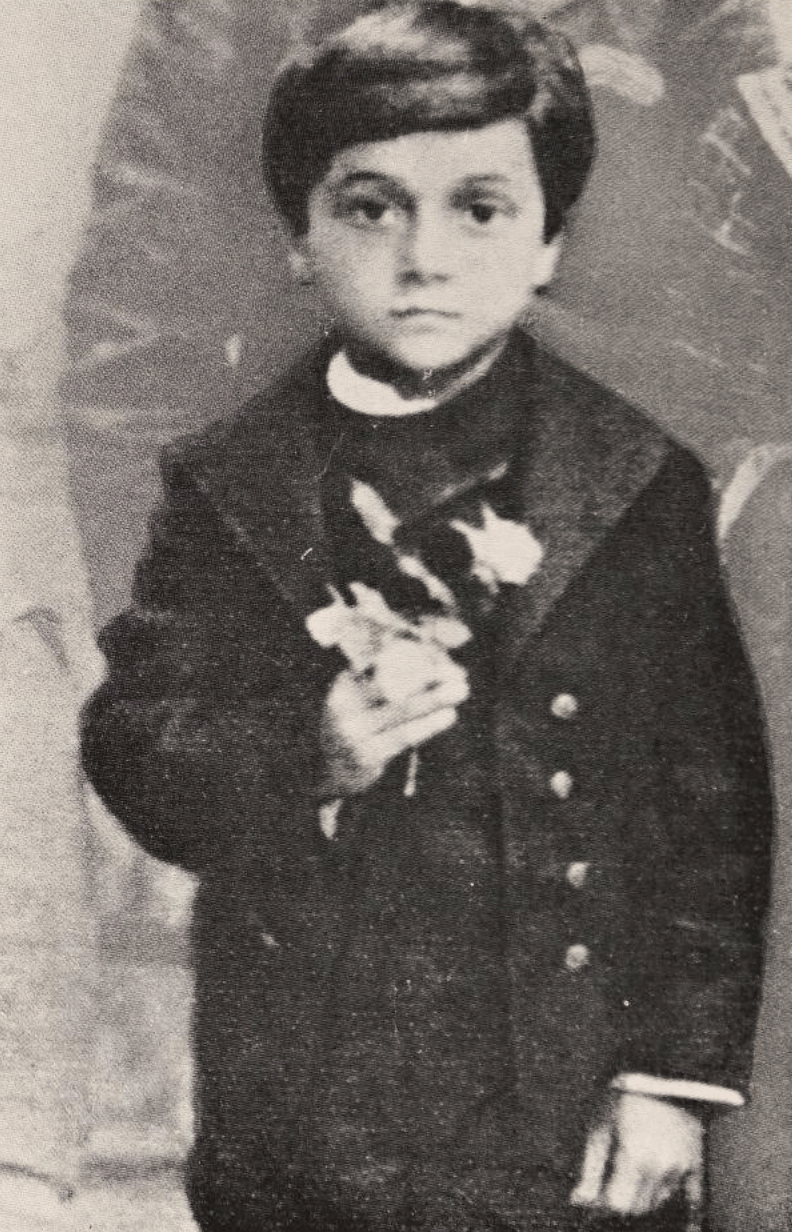
Shoghi Effendi during his schoolyears, holding a small bouquet. Source: The Priceless Pearl, between pages 24 and 25.
When Shoghi Effendi was a child, 'Abdu'l-Bahá sent him to live in Haifa with a nurse named Hájar Khátún, and he was enrolled in the French Jesuit school, Collège des Frères. 'Abdu'l-Bahá assigned Dr. Habíb Mú’ayyad, a devoted Persian believer, to be Shoghi Effendi’s tutor and look after him.
Shoghi Effendi absolutely loved his nurse, Hájar Khátún, and 'Abdu'l-Bahá had even mentioned her in a Tablet He sent to His beloved sister, Bahíyyih Khánum:
Kiss the flower of the garden of sweetness, Shoghi Effendi, and convey greetings to Hájar Khátún.
Shoghi Effendi’s first language after Persian was French, and he retained a beautiful accent in the language for the rest of his life. Shoghi Effendi was naturally left-handed, but because of the strictness of the Jesuit school, they forced him to write with his right hand, and this is the reason his handwriting was so distinctive: it was the left-handed writing of a person writing with his right hand.
But by the time he was nine or ten, sometime in 1906/1907, Shoghi Effendi had become so unhappy in his French school that 'Abdu'l-Bahá sent him to a Catholic boarding school in Beirut where he was just as unhappy.
Luckily, Shoghi Effendi came back to Haifa and to his Grandfather for every vacation.
'Abdu'l-Bahá tried to remedy the situation by sending a trusted Bahá'í woman to Beirut to care for Shoghi Effendi, and renting a house there, so he could attend school as a day student and not a boarding student.
Not long after she arrived, this devoted Bahá'í wrote to Shoghi Effendi’s parents in Haifa and explained to them that not only was Shoghi Effendi still very unhappy in his school, but he would sometimes refuse to attend for several days. Shoghi Effendi was losing weight and getting run down.
Shoghi Effendi’s father, Mírzá Hádí Shírází showed the letter to 'Abdu'l-Bahá, who immediately made arrangements for Shoghi Effendi to enter the preparatory school associated with the Syrian Protestant College, later the American College in Beirut.
The only saving grace for Shoghi Effendi in these disappointing experiences with schools, was that he was able to return to Haifa as often as possible and spend time in the presence of the Grandfather he idolized and yearned to serve.
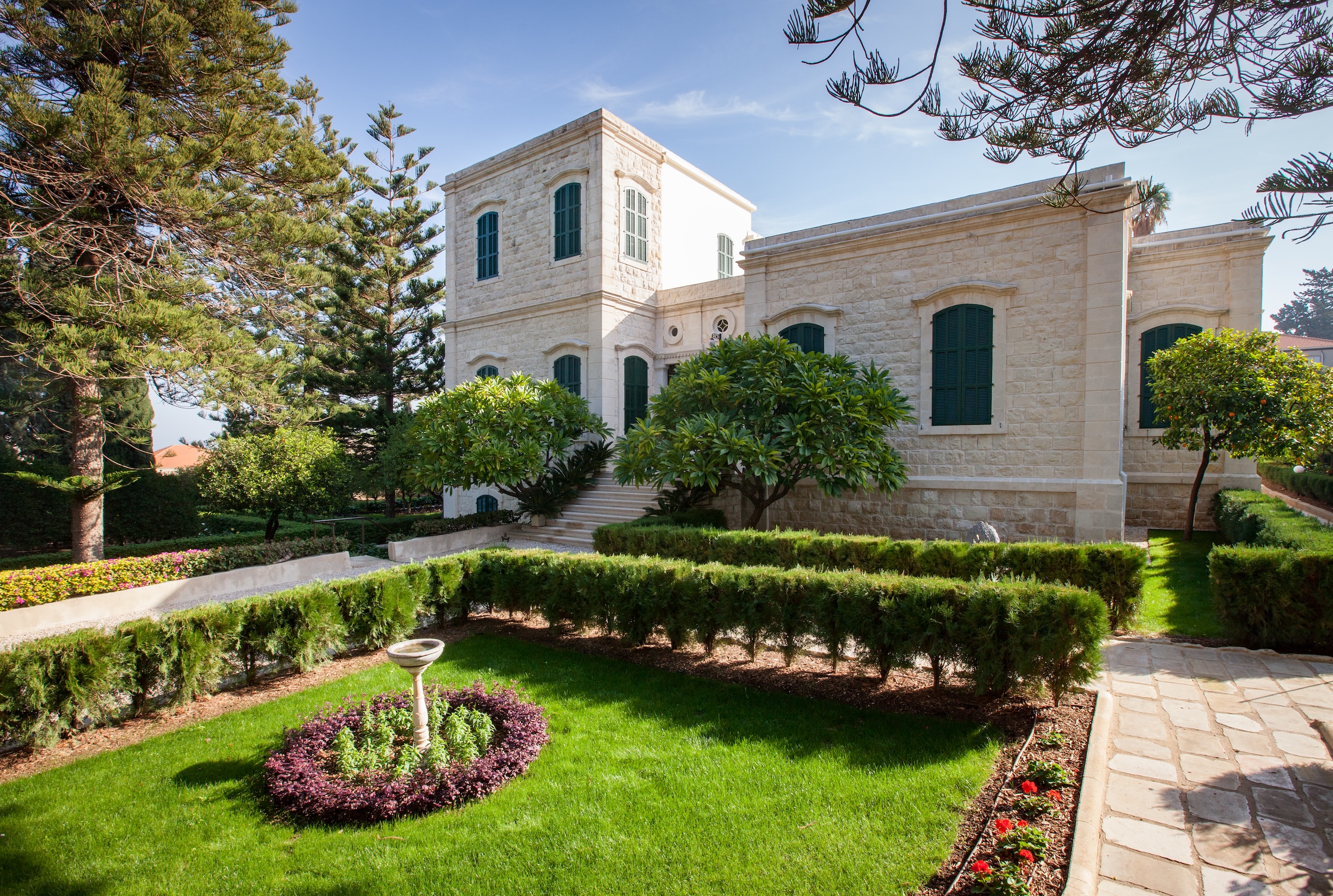
The House of the Master in Haifa at 7 Haparsim. Source: Bahá'í World News Service.
This little vignette takes place before 'Abdu'l-Bahá left for His journeys to the West and after He moved to Haifa permanently.
There was a member of 'Abdu'l-Bahá’s household, A.M. Quli, whose function it was to tell 'Abdu'l-Bahá the time. Every day at around 11 in the morning, 'Abdu'l-Bahá would enter the great hall of the house and ask AM “Qulí, sá‘at chandih?” [What time is it?]
Then, the maids would set up for lunch. After laying down a large cloth on the floor of the old tea room, they placed a huge low-legged round table on it and set enamel metal plates down, along with spoons and bread.
‘Abdu'l-Bahá would sit down and call out “bíyá bishíníd” [Come and sit down] to His family. Depending on the food, they would eat with their hands or with spoons, and sometimes 'Abdu'l-Bahá served rice to His family members.
The seat next to 'Abdu'l-Bahá was always reserved for Bahíyyih Khánum, the Greatest Holy Leaf, and she would enter about half way through lunch, and bring a plate of food. Gradually, as 'Abdu'l-Bahá finished eating, others would enter, women, guests or children, His daughters.
The second lunch was much more noisy than 'Abdu'l-Bahá’s dignified, calm lunch. The children would cry and everyone would talk. But one thing all the grandchildren were watching out for was the mouthful of the Greatest Holy Leaf’s food which she would give to one or the others of her great-nephews or nieces, because the children all said that her food tasted the best and they called it “the mouthful of Khánum.” Shoghi Effendi was usually the one who got to eat it, because of course, he was her favorite.
Once the ladies and children of the household had eaten, it was the servants’ turn, at the same table, then lunch would be cleared, and everything, including the large round table, rolled back and put away in its place.
Once 'Abdu'l-Bahá returned from His Journeys to the West, more western ways of eating were introduced like ceramic plates, chairs, and cutlery.
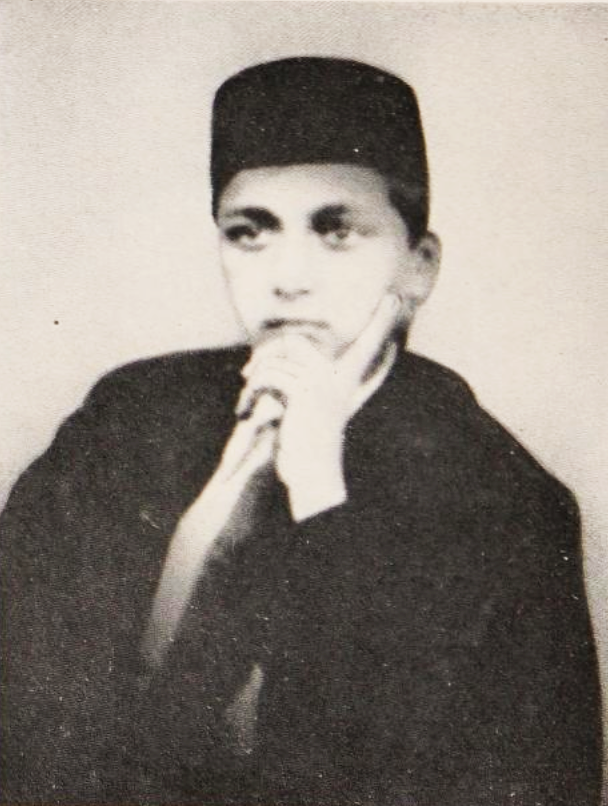
Shoghi Effendi as a young teenager. Source: The Priceless Pearl, between pages 40 and 41.
'Abdu'l-Bahá did everything to make sure Shoghi Effendi had a happy and carefree childhood but His grandson was very sensitive and deeply intelligent, and 'Abdu'l-Bahá could not hide from him the great dangers that threatened Him in the last days of the Ottoman Empire.
In the previous three years, 'Abdu'l-Bahá had received the visit of a commission of Inquiry sent by the Ottoman Sultan as a result of the malicious lies and rumors of the Covenant-breakers. 'Akká and the house of 'Abdu'lláh Pashá were filled with an atmosphere of great anxiety that had repercussions inside the Holy Family.
Shoghi Effendi would later tell his wife, Amatu’l-Bahá Rúḥíyyih Khánum that, even though he was a young boy of 11 at the time, he realized the danger his Grandfather was in.
Marion Jack, a Canadian Bahá'í, arrived in 'Akká in late 1907 and taught English to the Holy Family, including Shoghi Effendi. It was during this time that 'Abdu'l-Bahá began calling her "General Jack."
'Abdu'l-Bahá was under constant surveillance because of the incessant rumor-mongering of the jealous Covenant-breakers, and He once again suspended visits by western pilgrims. The situation became so dire that 'Abdu'l-Bahá sent His favorite grandson Shoghi Effendi to live in Haifa.
'Abdu'l-Bahá gave strict instructions to Shoghi Effendi not to drink coffee in the home of any of the Bahá'ís, for fear he might be poisoned.
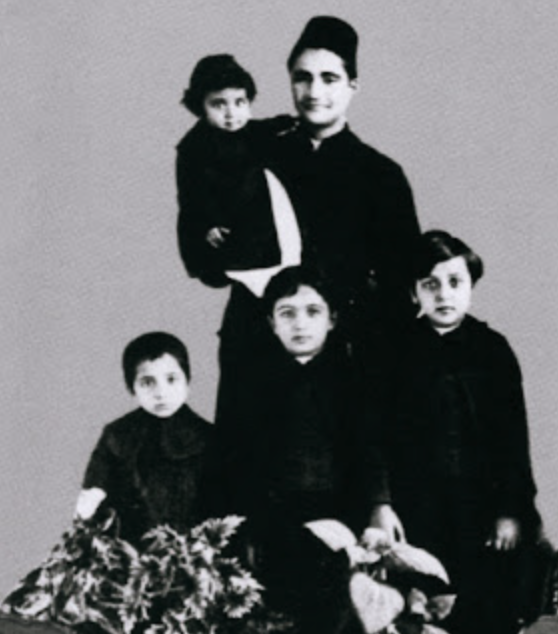
Shoghi Effendi with his father and siblings. Source: Bahá'í Points of Interest.
The entire Holy Family knew that Shoghi Effendi was deeply devoted to his beloved nurse, Hájar Khátún, with whom he had moved to Haifa for his own safety. Hájar Khátún had essentially brought up Shoghi Effendi.
Shoghi Effendi’s mother, Ḍíyá‘íyyih Khánum had dismissed the elderly Hájar Khátún when Shoghi Effendi was nine or ten years old, and Shoghi Effendi had bitterly resented it.
When Shoghi Effendi was 12 years old, around 1909, he was in his father’s garden, Carm, when he received the news that Hájar Khátún had passed died in İskenderun, Turkey, and he sought out a dark place so he could cry for his nurse.
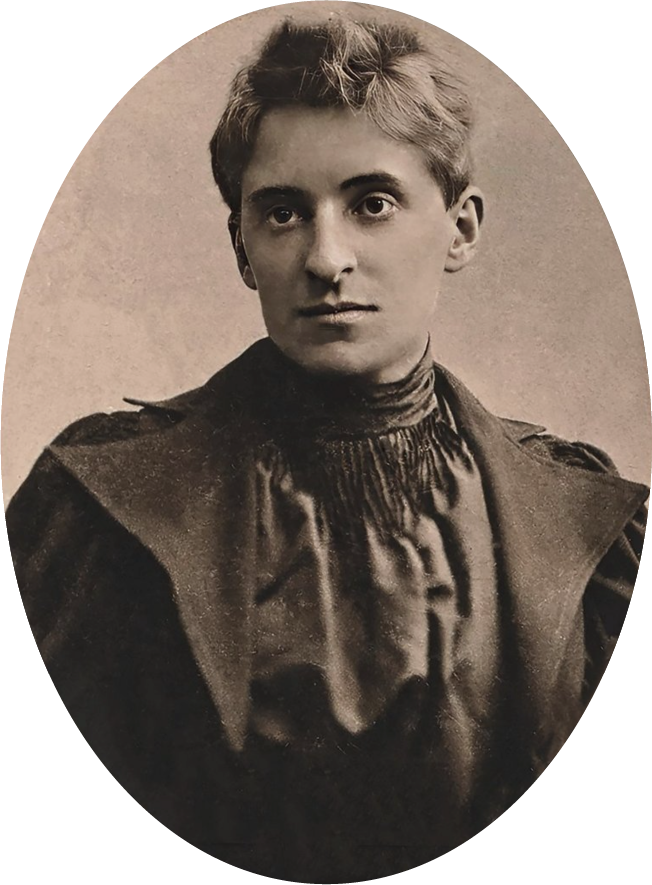
Undoubtedly the most important story in this first part of the chronology is the conversation between 'Abdu'l-Bahá and Dr. Josephina Theresa Zürcher-Fallscheer in the story below.
Dr. Fallscheer was an extraordinary woman, who made medical history as one of the very first PhDs in medicine in Switzerland and being one of the very first medics in the Ottoman Empire, and she deserves to be properly introduced, as she was the witness of a deeply significant event in Shoghi Effendi’s early life, namely, 'Abdu'l-Bahá’ mentioning that he was to be His successor.
Josephina Theresia Zürcher was born on 1 October 1866 in Zürich. When she was 20 years old, she began to study medicine at the University of Zürich and was the fifth woman who registered for the state exam to become a medic in 1891. She was among the first women to obtain a Doctorate in medicine in Switzerland, and her advisor was Dr. Auguste Forel, who, in 1921, would receive one of the most significant Tablets ever penned by 'Abdu'l-Bahá, and subsequently become a Bahá'í.
In May 1897 Dr. Fallscheer left Switzerland for Şanlıurfa, in the Ottoman Empire.
This was how Dr. Fallscheer described herself, in the late 19th century, as one of the only female doctors in the entire Ottoman Empire:
At that time, a female doctor was still something unheard of in the Kingdom of the Sublime Porte. […] In any case, I was attracted to live beyond the traditional paths of life and the usual scenery, far from civic comfort and social obligations, foregoing career, economic situation and compromises of unrestricted devotion to the profession I love."
A year after arriving in Şanlıurfa, Josephine and her husband Henry travelled to Aleppo, Syria, And Josephine became the only European medic in the entire region.
By 1905, Dr. Falscheer had moved to Haifa, where her husband Hendry had been offered a job. Because she was such an excellent doctor, Josephine soon became the physician for the city of Haifa, the surrounding villages, and the Bahá'í community.
This is how she was called to the House of 'Abdu'l-Bahá to treat a servant, on 6 August 1906.
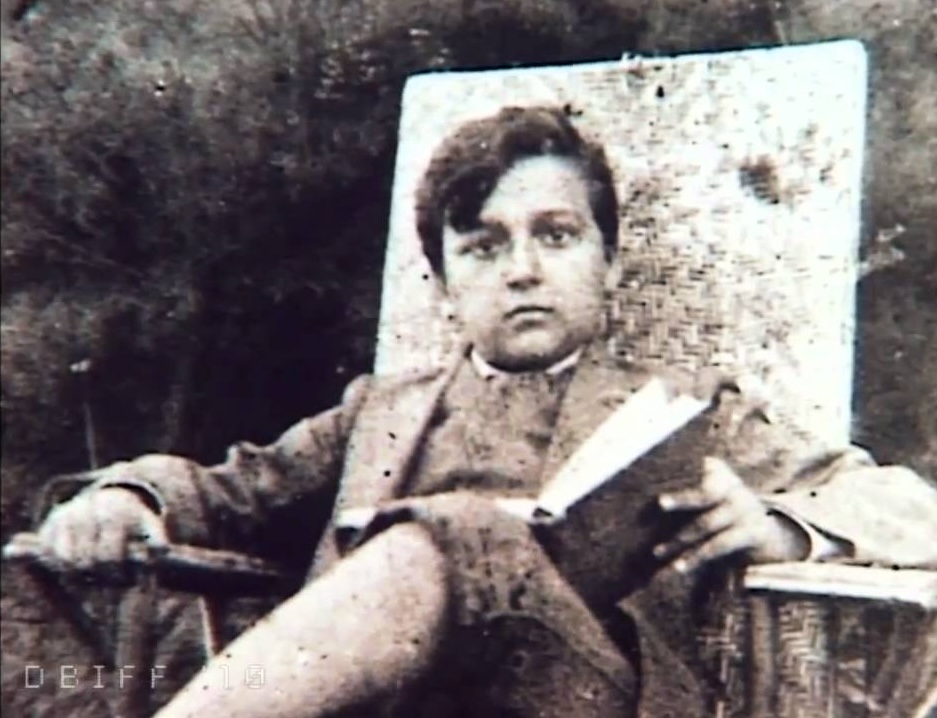
Shoghi Effendi with a book on a chair in the garden. Source: YouTube video: Shoghi Effendi (The Film) - DBIFF Official Selection.
There are very few records of how people who were not Bahá'ís saw 'Abdu'l-Bahá and His grandson. Dr. Josephina Theresia Zürcher Fallscheer noted her impressions when she was called that day to attend to the cut finger of a maid at 7 Haparsim.
Once she had attended to her patient, Dr. Fallscheer sipped coffee with the ladies of the Holy Family. Then, she was summoned by 'Abdu'l-Bahá to the drawing room.
'Abdu'l-Bahá inquired about the maid, and Dr. Fallscheer reassured Him. Shoghi Effendi, then 13 years old, entered the room, behind his father, and greeted his beloved Grandfather with a kiss on the hand, then remained motionless near the door, respectful and humble.
People came and went, speaking in Persian, for fifteen minutes, but Dr. Fallscheer didn't take her eyes off the boy. Shoghi Effendi was dressed in European summer clothes, a short jacket, shorts, and socks above his knees.
The perceptive physician was struck by Shoghi Effendi's dark, already mature and melancholy eyes set in a childish face. Before leaving the room, his father whispered something to Shoghi Effendi who then approached 'Abdu'l-Bahá, waited to be spoken to, and answered in Persian.
'Abdu'l-Bahá laughed, dismissed him, and Shoghi Effendi kissed his grandfather's hand again and walked backwards out of the room, his dark, loyal eyes never leaving 'Abdu'l-Bahá's. A short moment of silence followed and 'Abdu'l-Bahá asked Dr. Fallscheer:
Now my daughter, how do you like my future Elisha?
Dr. Fallscheer responded:
Master, if I may speak openly, I must say that in this boy's face are the dark eyes of a sufferer, one who will suffer a great deal!
'Abdu'l-Bahá looked away, then after a long time, turned back to Dr. Fallscheer and said:
My grandson does not have the eyes of a trailblazer, a fighter or a victor, but in his eyes one sees deep loyalty, perseverance and conscientiousness. And do you know why, my daughter, he will fall heir to the heavy inheritance of being my Vazír (Minister, occupant of a high post)? Bahá'u'lláh, the Great Perfection—blessed be His words—in the past, the present and forever—chose this insignificant one to be His successor, not because I was the first born, but because His inner eye had already discerned on my brow the seal of God.
Before His ascension into eternal Light the blessed Manifestation reminded me that I too—irrespective of primogeniture or age—must observe among my sons and grandsons whom God would indicate for His office. My sons passed to eternity in their tenderest years, in my line, among my relatives, only little Shoghi has the shadow of a great calling in the depths of his eyes.
'Abdu'l-Bahá paused for a long time before continuing.
At the present time the British Empire is the greatest and is still expanding and its language is a world language. My future Vazír shall receive the preparation for his weighty office in England itself, after he has obtained here in Palestine a fundamental knowledge of the oriental languages and the wisdom of the East.
Dr. Fallscheer interjected:
Will not the western education, the English training, remould his nature, confine his versatile mind in the rigid bonds of intellectualism, stifle through dogma and convention his oriental irrationality and intuition so that he will no longer be a servant of the Almighty but rather a slave to the rationality of western opportunism and the shallowness of everyday life?
'Abdu'l-Bahá marked another long pause, then rose and spoke in a strong and solemn voice:
I am not giving my Elisha to the British to educate. I dedicate and give him to the Almighty. God's eyes watch over my child in Oxford as well— Inshalláh!
SOURCES FOR PART I
Many years before 1921: The well-guarded secret
The Priceless Pearl, Rúḥíyyih Rabbání, Bahá’í Publishing Trust, London, 1969, page 1.
The situation in the Holy Land
Adib Taherzadeh, The Covenant of Bahá’u’lláh.
Violetta Zein, The Extraordinary Life of ‘Abdu’l-Bahá, Part IV: Center of the Covenant.
1 March 1897 – Shoghi Effendi is born
Names and Numbers: A Bahá’í Reference Guide, Elias Zohoori.
Department of the Secretariat letter dated 1 October 1973 to Mr. Elias Zohoori.
Email communication from Alexander Meinhard regarding the date of birth of Shoghi Effendi not being established conclusively.
Email communication from Adib Masumian providing the source for the Guardian’s birthdate quoted in the story.
The question of Shoghi Effendi’s date of birth
The Priceless Pearl, Rúḥíyyih Rabbání, Bahá’í Publishing Trust, London, 1969, page 2.
Door of Hope. David S. Ruhe, George Ronald, Oxford, 1983, pages 56-58.
The Will and Testament of ‘Abdu’l-Bahá.
Shoghi Effendi, from a letter dated 8 February 1934 tilted The Administrative Order, and included in the compilation The World Order of Baha’u’llah.
Shoghi Effendi, The Dispensation of Bahá’u’lláh: The Báb.
Shoghi Effendi, The Dispensation of Bahá’u’lláh: Bahá’u’lláh.
Shoghi Effendi, The Dispensation of Bahá’u’lláh: ‘Abdu’l-Bahá.
The Priceless Pearl, Rúḥíyyih Rabbání, Bahá’í Publishing Trust, London, 1969, page 5.
Around July 1897: An astonishing four-month-old baby Shoghi Effendi
Memories of Nine Years in ‘Akká, Youness Afroukhteh, Dr Riaz Masrour (trans), George Ronald, Oxford, 1952/2003, pages 59-60.
Shortly after 1 March 1897: A little child shall lead them
The Priceless Pearl, Rúḥíyyih Rabbání, Bahá’í Publishing Trust, London, 1969, page 2.
Sometime after Shoghi Effendi’s birth: One has recently been born
Memories of Nine Years in ‘Akká, Youness Afroukhteh, Dr Riaz Masrour (trans), George Ronald, Oxford, 1952/2003, pages 258-260.
Sometime after August 1897: He already has dreams!
The Priceless Pearl, Rúḥíyyih Rabbání, Bahá’í Publishing Trust, London, 1969, page 9.
March 1899: Ella Goodall Cooper witnesses the spiritual bond between ‘Abdu’l-Bahá and Shoghi Effendi
The Priceless Pearl, Rúḥíyyih Rabbání, Bahá’í Publishing Trust, London, 1969, pages 5-6.
Violetta Zein, The Extraordinary Life of ‘Abdu’l-Bahá Part IV: Center of the Covenant (1892 – 1910): 8 December 1898 – 20 February 1899 – The first western Pilgrims.
30 October 1900: I love you very much
Visiting ‘Abdu’l-Bahá: Volume 1: The West Discovers the Master, 1897-1911. Earl Redman, George Ronald Publishers, Oxford, 2019, Kindle Edition location 1029-1049.
1902: Shoghi Effendi’s first Tablet from ‘Abdu’l-Bahá
The Priceless Pearl, Rúḥíyyih Rabbání, Bahá’í Publishing Trust, London, 1969, page 8.
1903/1904: Shoghi Effendi’s interest in science
The Priceless Pearl, Rúḥíyyih Rabbání, Bahá’í Publishing Trust, London, 1969, page 10.
21 April 1904 – 1905: Shoghi Effendi during Laura Dreyfus Barney’s pilgrimage
Shoghi Effendi: Recollections, Ugo Giachery, George Ronald, 1973, pages 14-150.
Visiting ‘Abdu’l-Bahá: Volume 1: The West Discovers the Master, 1897-1911. Earl Redman, George Ronald Publishers, Oxford, 2019, Kindle Edition, Location 2274.
Shoghi Effendi’s boundless energy
The Priceless Pearl, Rúḥíyyih Rabbání, Bahá’í Publishing Trust, London, 1969, pages 7-8.
Violetta Zein, The Blessed Beauty Chronology Part I: The Early Life of Bahá’u’lláh (1817 – 1844): Prophecy fulfilled.
Shoghi Effendi’s physical traits
The Priceless Pearl, Rúḥíyyih Rabbání, Bahá’í Publishing Trust, London, 1969, pages 7-8.
Violetta Zein, The Blessed Beauty Chronology Part I: The Early Life of Bahá’u’lláh (1817 – 1844): Prophecy fulfilled.
Shoghi Effendi’s courteous nature and spiritual sensitivities
The Priceless Pearl, Rúḥíyyih Rabbání, Bahá’í Publishing Trust, London, 1969, pages 7-8 and 10.
Violetta Zein, The Blessed Beauty Chronology Part I: The Early Life of Bahá’u’lláh (1817 – 1844): Prophecy fulfilled.
The Priceless Pearl, Rúḥíyyih Rabbání, Bahá’í Publishing Trust, London, 1969, page 8.
The suffering of the Center of the Covenant
1897 – 1900: The abject betrayal of Mírzá Áqá Ján
1900: Attempts on the life of ‘Abdu’l-Bahá
1904: The indictment of ‘Abdu’l-Bahá
1905: The Commission of Inquiry
REFERENCES FOR THE PREVIOUS FIVE STORIES:
The Covenant of Bahá’u’lláh, Adib Taherzadeh, George Ronald, Oxford, 1992 Chapter 15: Mírzá Áqá Ján, Chapter 19: Building the Shrine of the Báb, Chapter 20: Years of incarceration, and Chapter 21: Covenant-breaking in the West.
1906 and 1908: ‘Abdu’l-Bahá reveals His Will and Testament
Child of the Covenant: A Study Guide to the Will and Testament of ‘Abdu’l-Bahá, Adib Taherzadeh, George Ronald, 2000, page 7.
Many thanks to Larry Roofener for his email communication dated 11 February 2024, providing this source which allows us to precisely date the first part of the Will and Testament of ‘Abdu’l-Bahá to 1906, rather than 1901 as is so commonly thought.
NOTE REGARDING THE DATE OF ABDU’L-BAHÁ’S WILL AND TESTAMENT:
It is often believed that ‘Abdu’l-Bahá’s Will and Testament was written in two parts, in 1901 and 1908. This, however was before extensive research on the par of eminent Bahá’í historian Adib Taherzadeh, who was able to more precisely date the first part of ‘Abdu’l-Bahá’s Will and Testament to 1906. Below is Mr. Taherzadeh’s explanation in Child of the Covenant: A Study Guide to the Will and Testament of ‘Abdu’l-Bahá, page 7:
The Will and Testament, described by Shoghi Effendi as the Charter of the New World Order, was written in ‘Abdu’l-Bahá’s own hand and is signed and sealed by Him. It consists of three parts, written at different times during the darkest days of ‘Abdu’l-Bahá’s life, when He was living in the house of ‘Abdu’lláh Páshá. ‘Abdu’l-Bahá was incarcerated in the fortress city of ‘Akká through the machinations and intrigues of Mírzá Muḥammad-‘Alí, the arch-breaker of the Covenant, who was ably assisted by his brothers and other Covenant- breakers. The date on which each part was written is not given but the first part of the Will is likely to have been written sometime in 1906 or later14.
Note 14 from Mr. Taherzadeh: One clue to the date of the Will’s completion is that Shu‘á‘u’lláh, a son of Mírzá Muḥammad-‘Alí, sent a letter from the United States to Majdu’d-Dín, the arch-enemy of ‘Abdu’l-Bahá, dated 27 Tiashrín 2nd (27 November) 1905. Somehow this letter came into the possession of ‘Abdu’l-Bahá. He refers to this letter in the first part of the Will and Testament (see Will and ‘Testament paragraph 9). Bearing in mind the time it took for the letter to reach the Holy Land by surface post, and not knowing when or how it fell into ‘Abdu’l-Bahá’s hands, it is reasonable to assume that the first part of the Will was written sometime in 1906 or later
PARAGRAPH 9 OF ‘ABDU’L-BAHÁ’S WILL AND TESTAMENT REFERRING TO THE LETTER FROM HIS HALF-BROTHER, MÍRZÁ MUḤAMMAD-‘ALÍ:
In like manner, the focal Center of Hate, hath purposed to put ‘Abdu’l‑Bahá to death and this is supported by the testimony written by Mírzá Shu‘á‘u’lláh himself and is here enclosed. It is evident and indisputable that they are privily and with the utmost subtlety engaged in conspiring against me. The following are his very words written by him in this letter:—“I curse at every moment him that hath kindled this discord, imprecate in these words ‘Lord! have no mercy upon him’ and I hope ere long God will make manifest the one that shall have no pity on him, who now weareth another garb and about whom I cannot any more explain.” Reference he doth make by these words to the sacred verse that beginneth as follows:—“He that layeth a claim ere the passing of a thousand years…” Reflect! How intent they are upon the death of ‘Abdu’l‑Bahá! Ponder in your hearts upon the phrase “I cannot any more explain” and realize what schemes they are devising for this purpose. They fear lest, too fully explained, the letter might fall into alien hands and their schemes be foiled and frustrated. The phrase is only foretelling good tidings to come, namely that regarding this all requisite arrangements have been made.
A childhood marred by limitations
Shoghi Effendi: Recollections, Ugo Giachery, George Ronald, 1973, page 119.
Shoghi Effendi’s childhood during the last years of the Ottoman Empire
Shoghi Effendi: Recollections, Ugo Giachery, George Ronald, 1973, page 54.
Eight Years Near ‘Abdu’l-Bahá: The Diary of Dr. Habíb Mú’ayyad, translated and annotated by Ahang Rabbani, Volume 3: Witnesses to Bábí and Bahá’í History, An eBook publication (March 2007 Edition), pages 79-80.
Shoghi Effendi’s relationship to prayers as a child
The Priceless Pearl, Rúḥíyyih Rabbání, Bahá’í Publishing Trust, London, 1969, pages 8-9.
Shoghi Effendi’s thirst for learning
The Priceless Pearl, Rúḥíyyih Rabbání, Bahá’í Publishing Trust, London, 1969, page 9, 15-17.
Door of Hope. David S. Ruhe, George Ronald, Oxford, 1983, pages 60–1.
Prelude to the Guardianship, Riaz Khadem, George Ronald, Oxford, 2014, page 4.
The Priceless Pearl, Rúḥíyyih Rabbání, Bahá’í Publishing Trust, London, 1969, pages 9- 10.
Bahá’u’lláh, The King of Glory. H.M. Balyúzí, George Ronald, Oxford, 1980, pages 2 and 281.
A Basic Bahá’í Dictionary, Wendi Momen, George Ronald, Oxford, 1989, page 191–2. Door of Hope. David S. Ruhe, George Ronald, Oxford, 1983, pages 60–1.
Prelude to the Guardianship, Riaz Khadem, George Ronald, Oxford, 2014, page 4.
The Priceless Pearl, Rúḥíyyih Rabbání, Bahá’í Publishing Trust, London, 1969, page 15-17.
Around 9 July 1906: Shoghi Effendi on a donkey
Summon Up Remembrance. Marzieh Gail, George Ronald, Oxford, 1987.
1906: Jane Whyte and the unforgettable boy
Redman, Earl. ‘Abdu’l-Baha in Their Midst, Kindle Edition
The Priceless Pearl, Rúḥíyyih Rabbání, Bahá’í Publishing Trust, London, 1969, page 16.
Corinne True: Faithful Handmaid of ‘Abdu’l-Bahá, Nathan Rutstein with the assistance of Edna True, George Ronald, Oxford (1987), pages 65 and 79.
After 8 April 1907: The photograph of Shoghi Effendi with his sailor collar
The Guardian of the Bahá’í Faith, Rúḥíyyih Rabbání, Bahá’í Publishing Trust, London, 1988, page 6.
1899 – 1909: ‘Abdu’l-Bahá erects the Shrine of the Báb
Journey to a Mountain: The Story of the Shrine of the Báb, Volume 1: 1850-1921, Michael V. Day, George Ronald, 2017, pages 40, 51, and 76.
Violetta Zein, The Extraordinary Life of ‘Abdu’l-Bahá: The illustrated chronology of the life of ‘Abdu’l-Bahá Part IV: The Center of the Covenant.
21 March 1909: Shoghi Effendi is present when ‘Abdu’l-Bahá lays the Báb’s remain to rest
Violetta Zein, The Extraordinary Life of ‘Abdu’l-Bahá Part IV: The Center of the Covenant (1891-1910): 21 March 1909: The remains of the Báb are finally laid to rest after sixty years.
Shoghi Effendi: Recollections, Ugo Giachery, George Ronald, 1973, page 54.
Between 1906 and 1908: Dr. Afroukhteh and Ḥájí Mírzá Ḥaydar-‘Alí confer about Shoghi Effendi
‘Memories of Nine Years in ‘Akká, Youness Afroukhteh, Dr Riaz Masrour (trans), George Ronald, Oxford, 1952/2003, page 60.
1907 – 1910: School in Haifa and Beirut
The Priceless Pearl, Rúḥíyyih Rabbání, Bahá’í Publishing Trust, London, 1969, page 9, 10 and, 15-17.
Door of Hope. David S. Ruhe, George Ronald, Oxford, 1983, pages 60–1.
Prelude to the Guardianship, Riaz Khadem, George Ronald, Oxford, 2014, page 4.
1907/1910: Lunch in the time of ‘Abdu’l-Bahá
The Priceless Pearl, Rúḥíyyih Rabbání, Bahá’í Publishing Trust, London, 1969, pages 14-15.
Email communication from Adib Masumian dated 4 February 2024 regarding the correct transliteration of “Qulí, sá‘at chandih?” and “bíyá bishíníd.”
Around January 1908: ‘Abdu’l-Bahá sends Shoghi Effendi to Haifa when ‘Akká becomes too dangerous
The Priceless Pearl, Rúḥíyyih Rabbání, Bahá’í Publishing Trust, London, 1969, page 15. Taherzadeh, Adib. The Covenant of Bahá’u’lláh page 257.
Visiting ‘Abdu’l-Bahá: Volume 1: The West Discovers the Master, 1897-1911. Earl Redman, George Ronald Publishers, Oxford, 2019.
1909: Shoghi Effendi mourns the death of his beloved nurse
The Priceless Pearl, Rúḥíyyih Rabbání, Bahá’í Publishing Trust, London, 1969, pages 16-17.
6 August 1910: “My future Elisha”
The Priceless Pearl, Rúḥíyyih Rabbání, Bahá’í Publishing Trust, London, 1969, pages 10-13.
![]()
 The Station of the Guardian
The Station of the Guardian





















